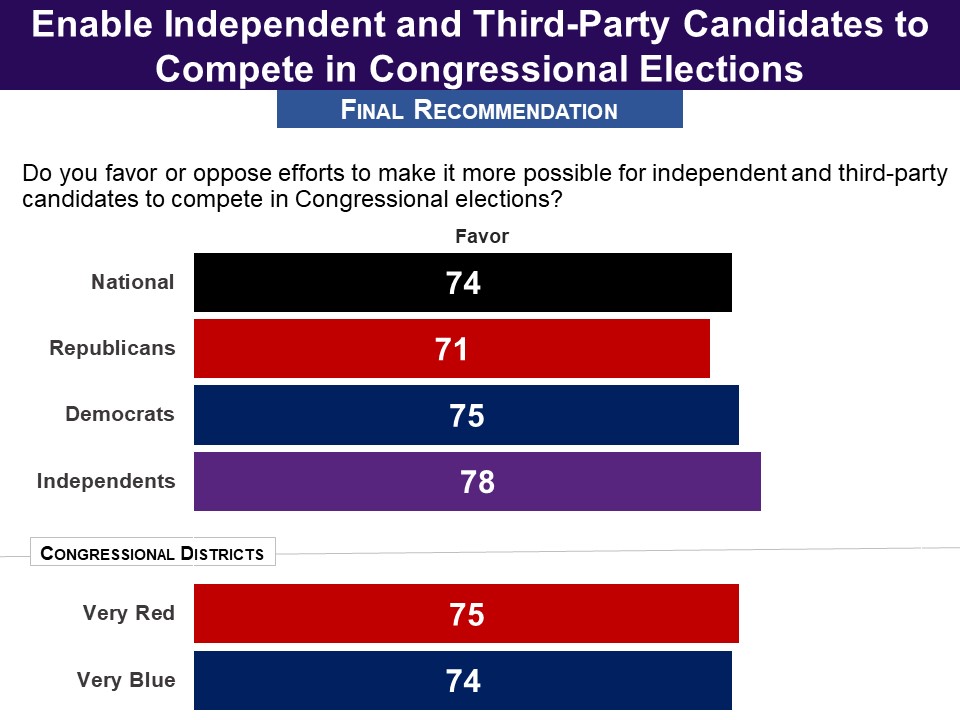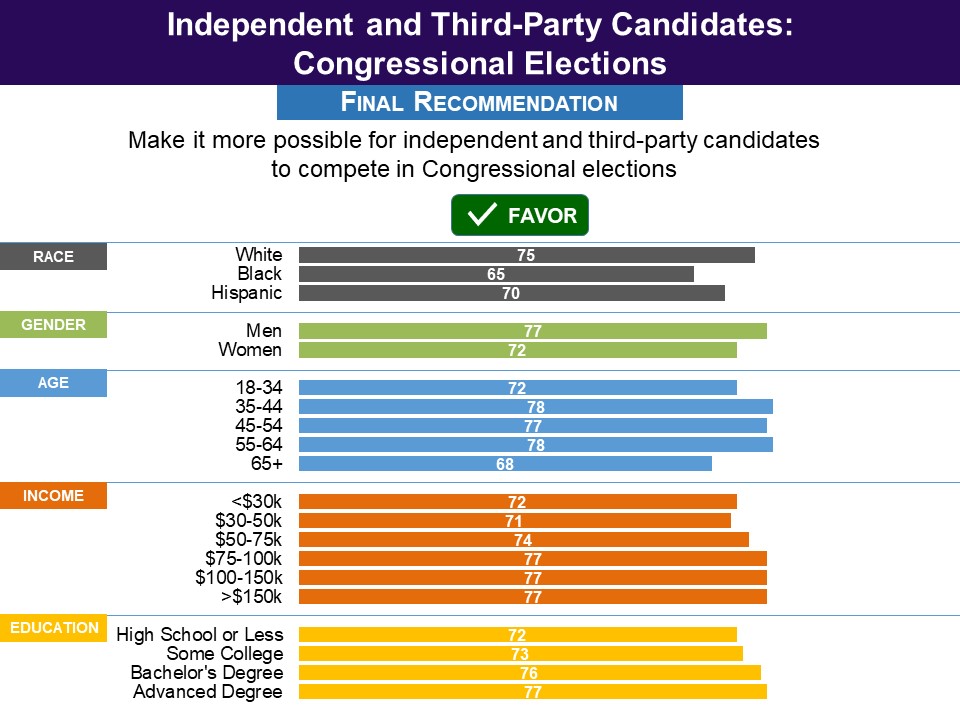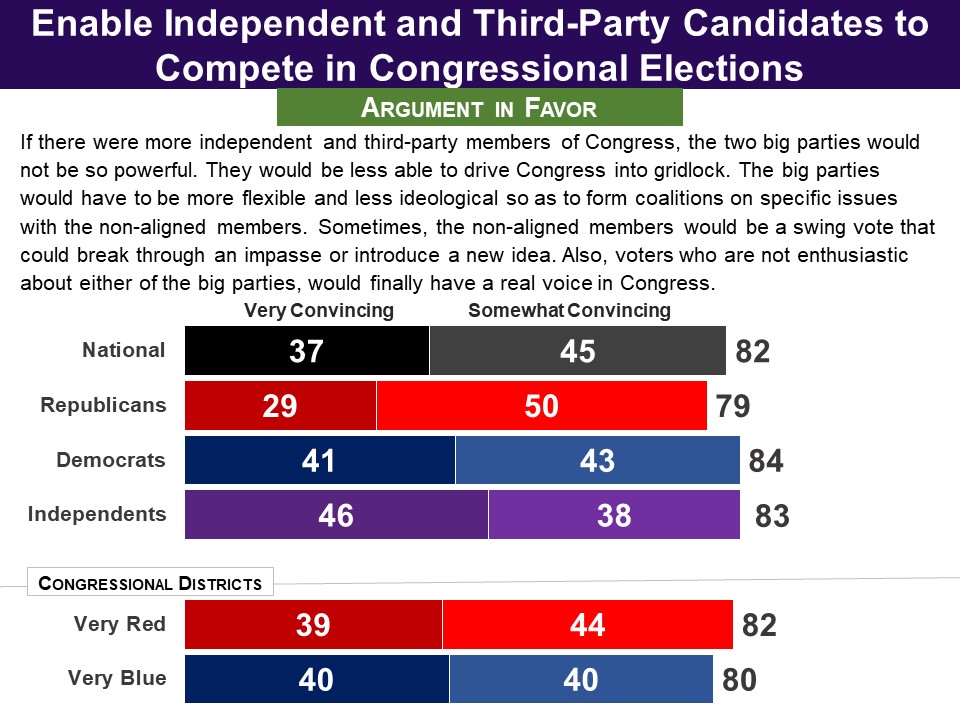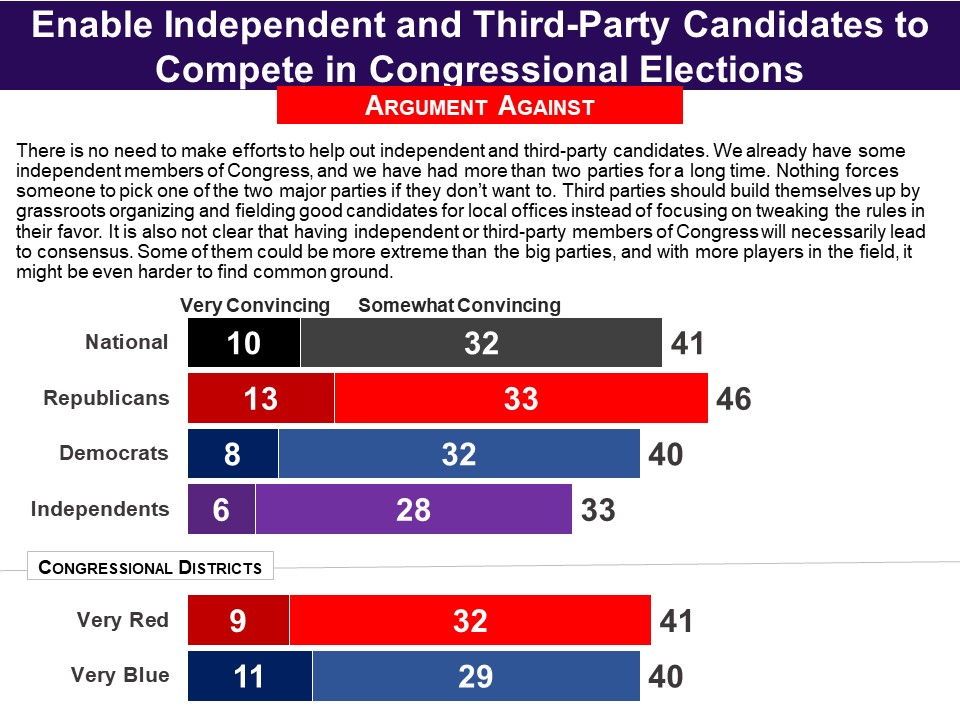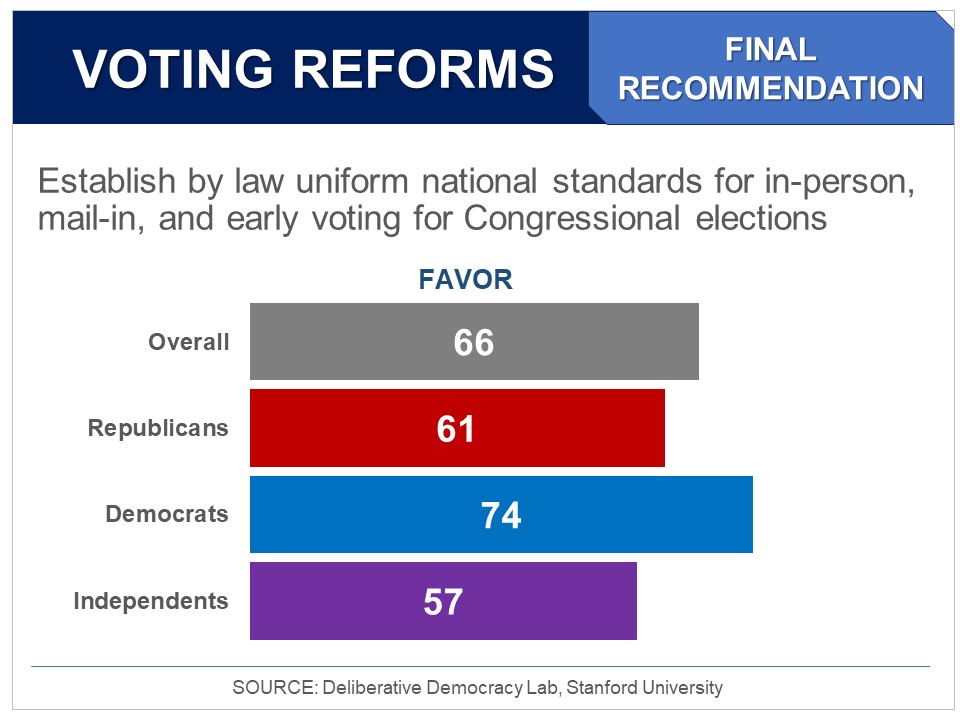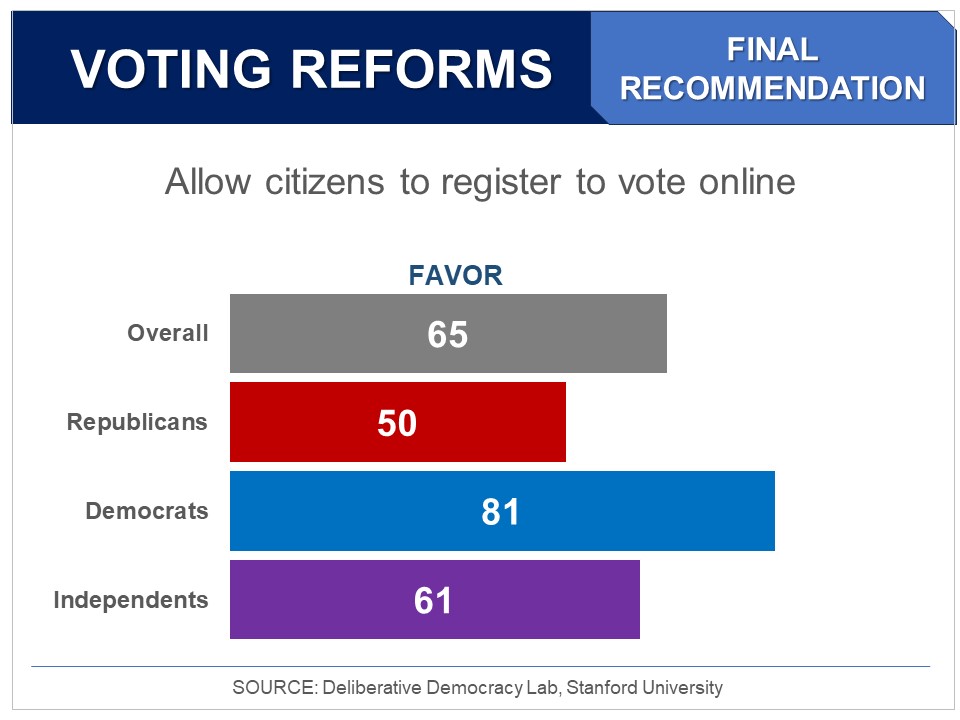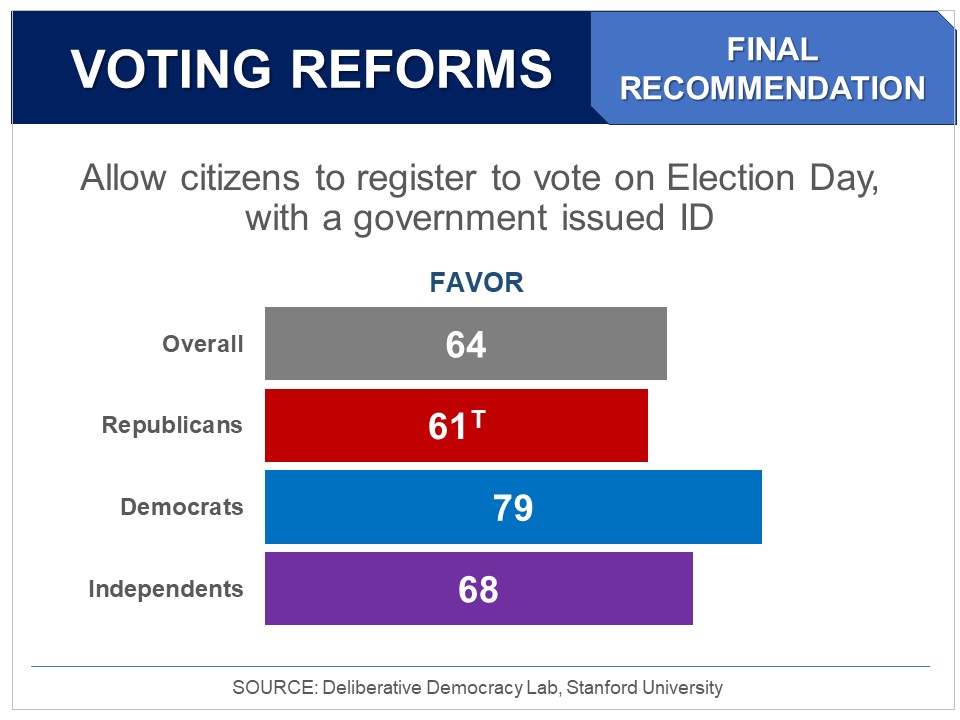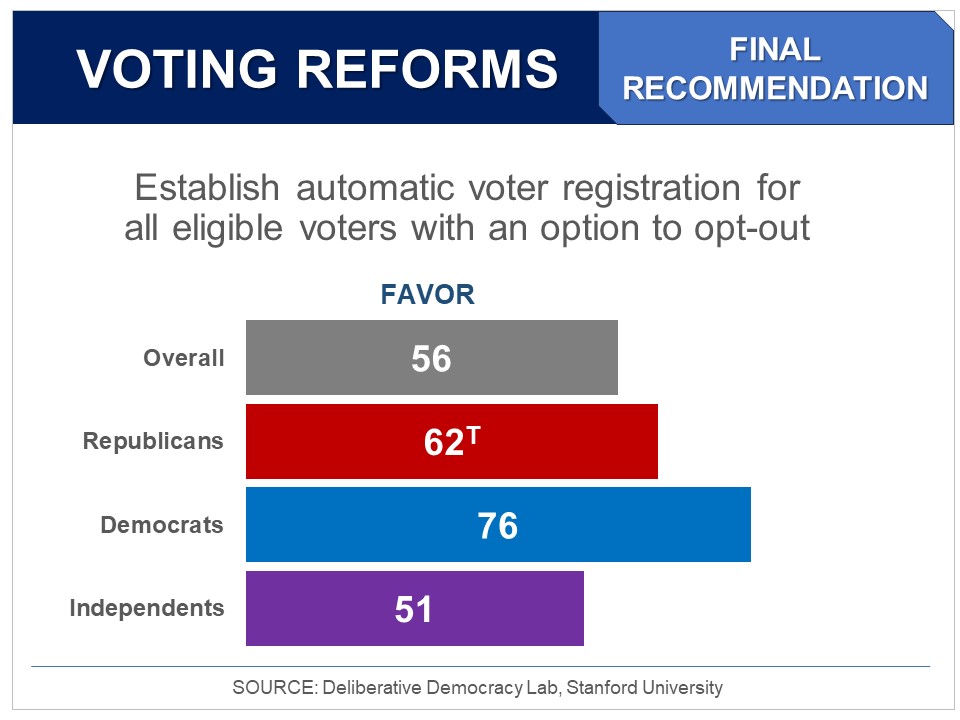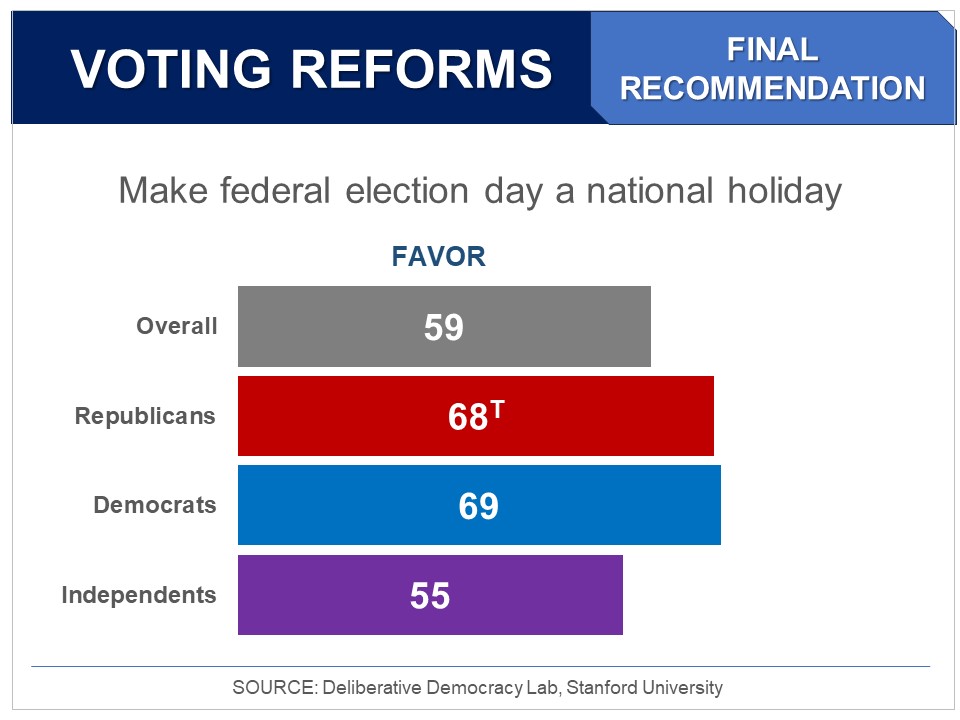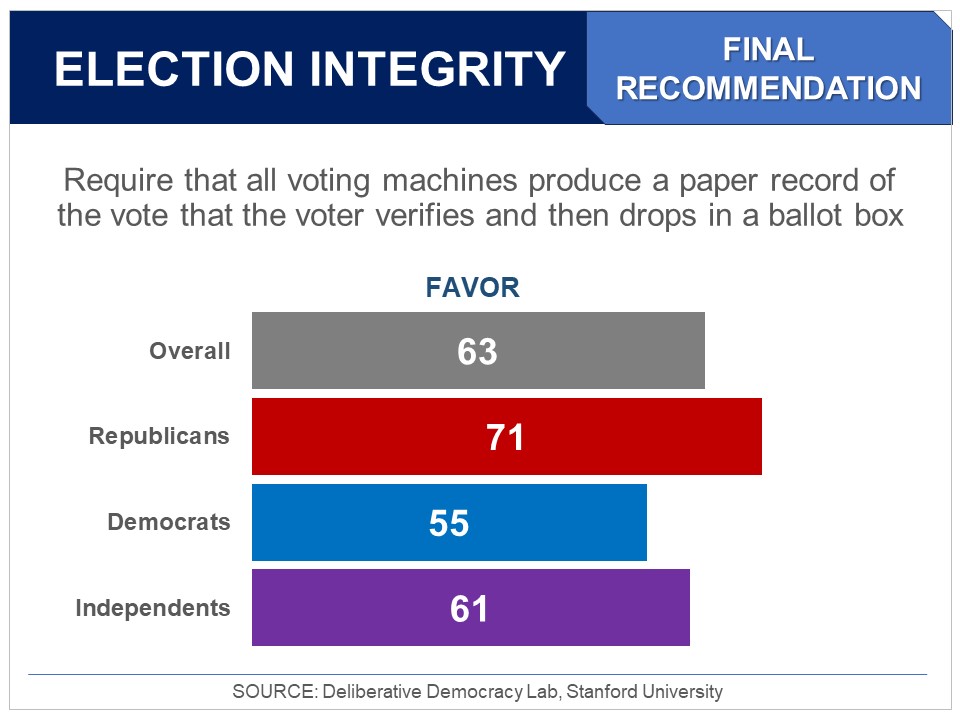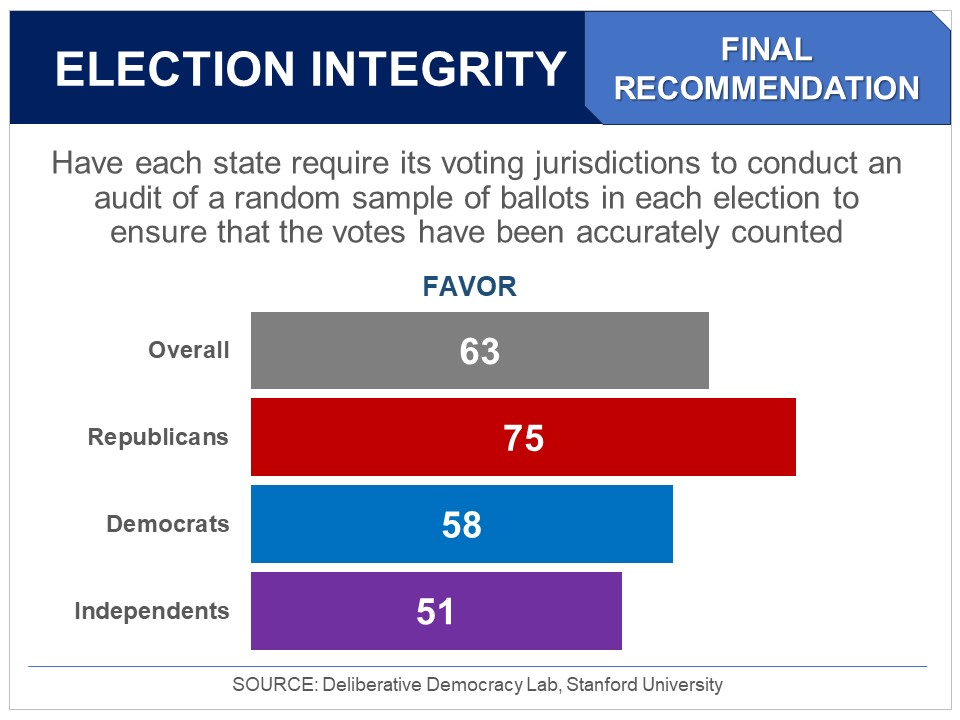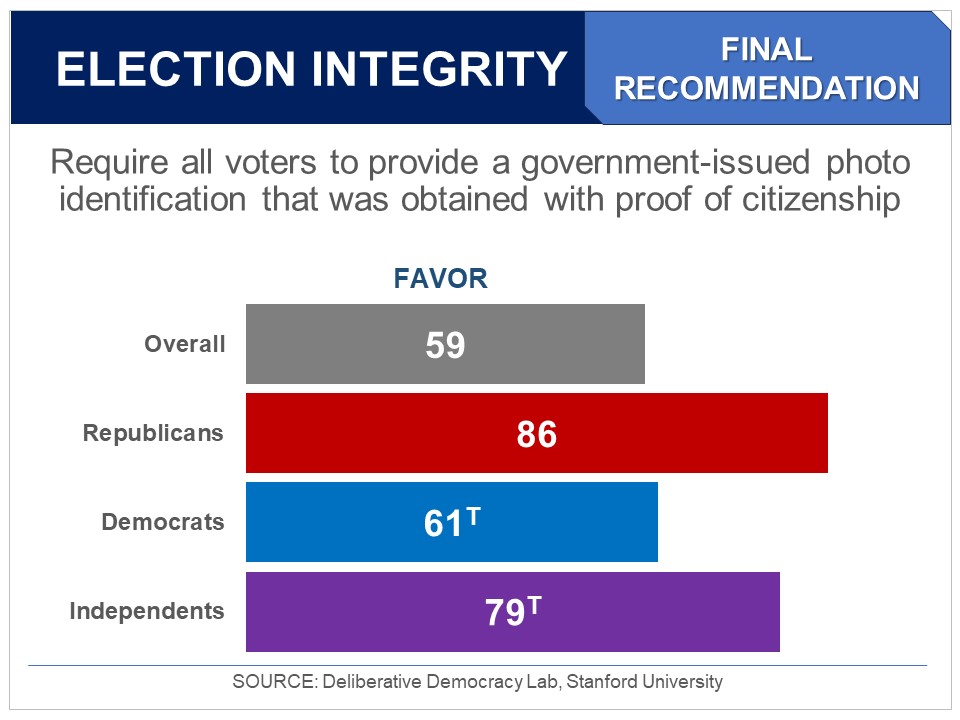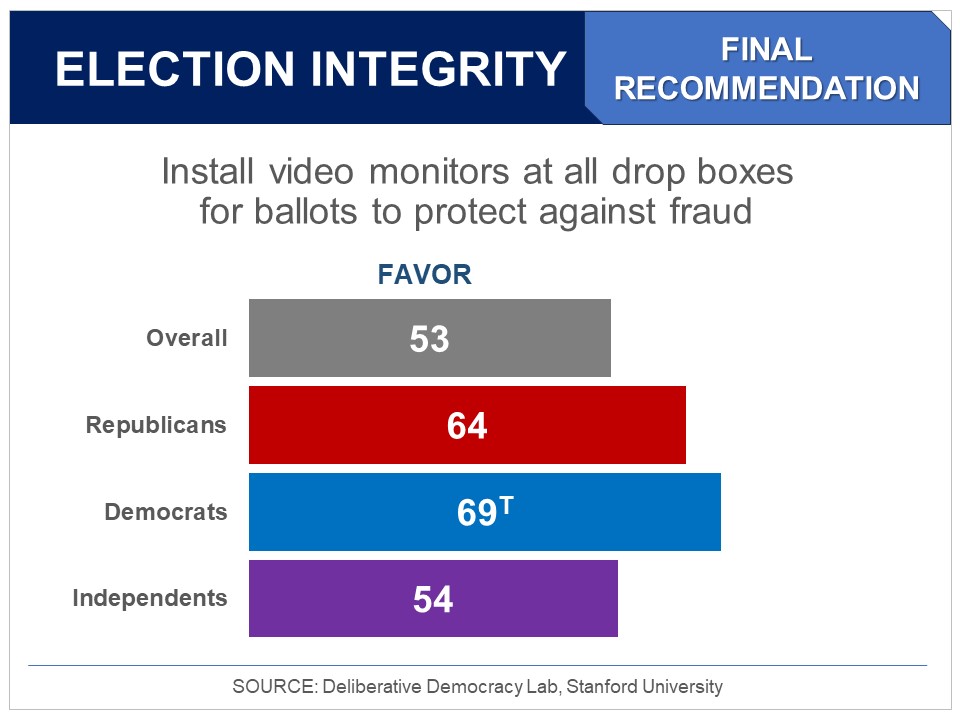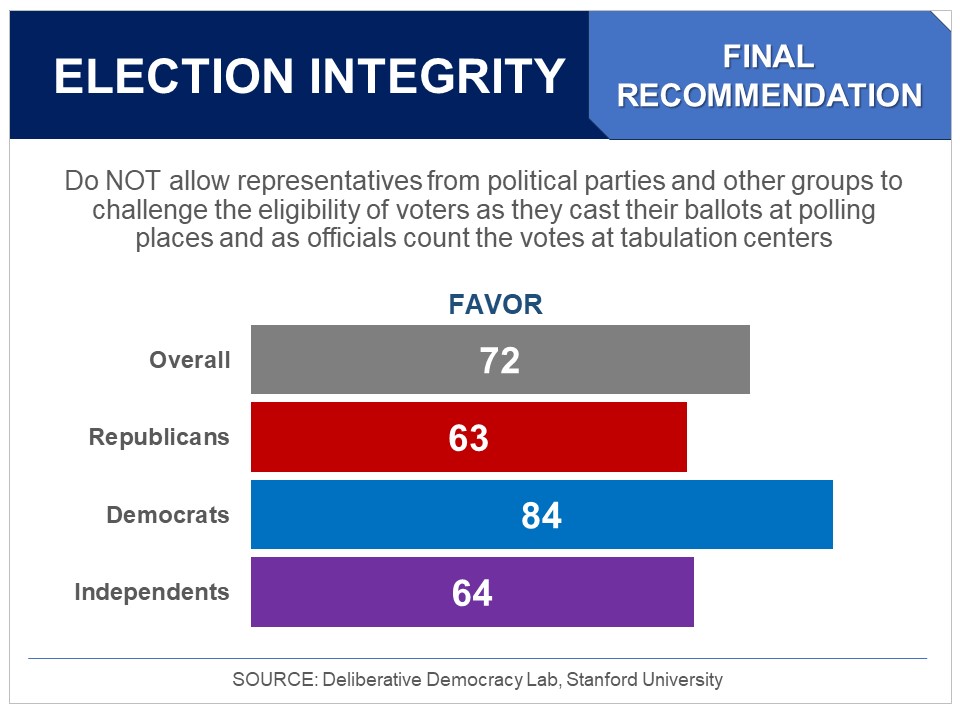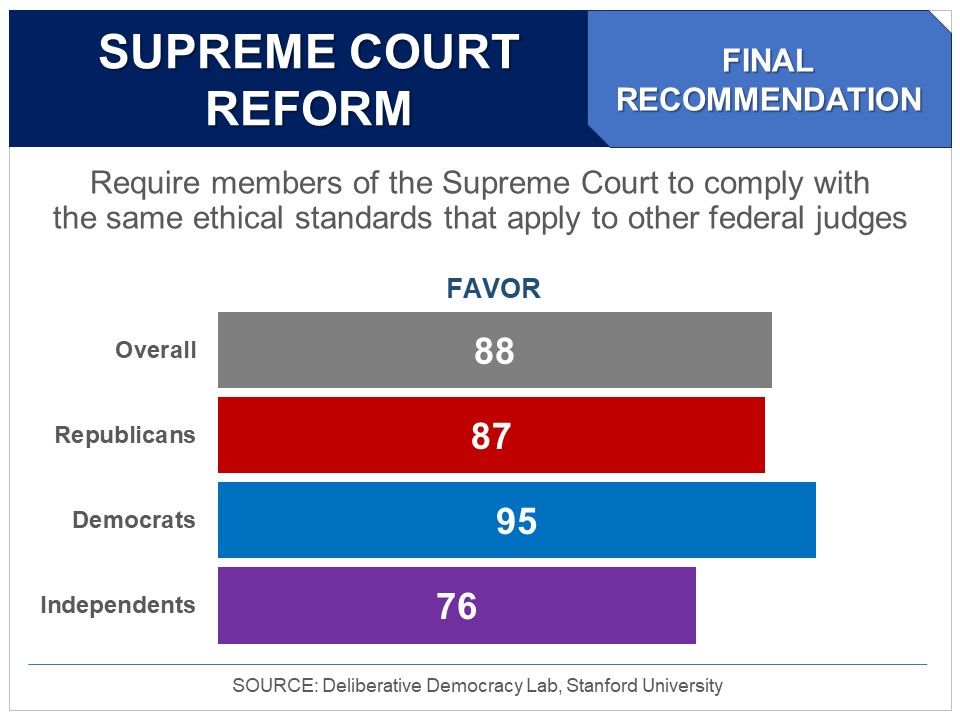
Government and Elections
Numerous government reforms have been proposed that seek to counter potential distortions to the democratic process by:
- constraining the role of money in the campaigns and making it more transparent
- limiting lobbying by recently retired government officials
- making the process of House redistricting more representative of the partisan balance of a state
- having Congressional term limits
- making it more possible for independent and third-party candidates to compete in elections
- banning stock-trading by Members of Congress.
CONSTRAINING THE ROLE OF MONEY IN POLITICAL CAMPAIGNS
|
Constitutional Amendment to Allow Regulation |
|
Survey: PPC, August 2017 Respondents evaluated the following proposal to effectively overturn the Supreme Court's Citizen United v. FEC decision, which lifted regulations on campaign financing: A new Constitutional amendment that would have two parts. It would allow Congress and the states to
Asked whether their Member of Congress should vote in favor or against this amendment, a bipartisan majority of 75% came out in favor, including 66% of Republicans and 85% of Democrats. More Details Since the Supreme Court’s ruling on Citizens United v. FEC, in which restrictions on political donations by corporations were removed, there has been a concern that unlimited donations by special interests is making government officials less responsive to the public as a whole. To address this concern, Members of Congress have introduced legislation to effectively reverse the Citizens United decision through a Constitutional amendment which would give Congress the power to place regulations on campaign donations. Briefing Respondents were first introduced to this topic, by being told that in order for Congress to limit all forms of campaign‐related donations, a new Constitutional amendment would be required to override the Supreme Court’s past decisions on this subject, including “Citizens United”, and prevent the courts from striking down campaign finance laws in the future. They were presented a proposed amendment, which includes two parts. First Part of Proposal: Arguments and Acceptability The first part was presented as follows: The proposed Constitutional amendment would say Congress and the states may regulate and set reasonable limits on the raising and spending of money by candidates and others seeking to influence elections. Presented with an argument in favor of this part of the amendment, a large bipartisan majority found it convincing. The argument against did substantially worse, with less than half finding it convincing. However, a majority of Republicans found it convincing. Second Part of Proposal: Arguments and Acceptability Respondents were then introduced to the second part of the proposed constitutional amendment which said that: … in writing campaign finance laws, Congress would have the right to treat corporations and other organizations differently from ‘natural persons.’ This would allow Congress to restrict or even prohibit corporations and other organizations from spending money to influence elections. The argument in favor of the second part of the amendment was found convincing by a large bipartisan majority. The argument against, on the other hand, was not as well‐received, with less than half of all groups finding it convincing. When they were asked how acceptable they found this part of the constitutional amendment along a 0-10 scale, 79% found it at least tolerable (5-10), including 73% of Republicans and 86% of Democrats. Final Recommendation In the end, respondents were asked whether their Member of Congress should vote in favor or against this two‐ part constitutional amendment. A clear bipartisan majority of 75% came out in favor, including 66% of Republicans and 85% of Democrats. Demographics
Related Standard Polls A large bipartisan majority has expressed support for the broad principle of placing limits on political spending:
Status of Legislation The proposal has also been part of the larger government reform bill For the People Act, sponsored by Sen. Jeff Merkley (S. 1) Rep. John Sarbanes (H.R. 1) in the 117th Congress. This bill passed the House, with all votes in favor coming from Democrats and all votes against from Republicans, but was blocked in the Senate with a filibuster by Republicans. In the 119th Congress, resolutions were introduced to amend the Constitution to overturn the Citizen United decision, by Rep. Summer Lee and Sen. Adam Schiff; and Rep. Pramila Jayapal. |
|
Countering Large Campaign Donors |
|
Survey: PPC, August 2017 Respondents evaluated the following proposal: When a citizen contributes up to $50 to a specific candidate, half of the contribution would be refundable in the form of a tax credit. This would be limited to small donors, which would be people whose total donations to that candidate are no more than $300. A bipartisan majority of 60% were in favor, including 53% of Republicans, 67% of Democrats and 55% of independents. More Details Briefing To encourage more small donors and to indirectly inject public money into campaigns, Members of Congress have introduced legislation that would provide refundable tax credit to small donors. Respondents were first presented the idea behind the proposal, that “by reducing the cost of making donations, more citizens will make donations and small donors will make somewhat larger donations, thus increasing the total amount coming from small donors.” They were then introduced to the specific proposal: When a citizen contributes up to $50 to a specific candidate, half of the contribution would be refundable in the form of a tax credit. This would be limited to small donors, which would be people whose donations to that candidate are no more than $300. Arguments The argument in favor was found convincing by a large, bipartisan majority (70%), including two‐thirds of Republicans and three‐fourths of Democrats. The argument against was found convincing by a similarly large bipartisan majority (68%), including seven‐in‐ten Republicans and two‐thirds of Democrats. Final Recommendation Asked for their final recommendation, six in ten recommended that their Member of Congress vote in favor of this proposal. For Republicans, a more modest majority was in favor (53%), while among Democrats, two‐thirds recommended the proposal. Demographics
Status of Legislation |
|
Survey: PPC, August 2017 Respondents evaluated the following proposal to create a campaign finance matching program for Senate candidates: Create a program that provides financial support to US Senate candidates who agree to limit their fundraising to small donors. A candidate who chooses to participate must:
The candidate would then receive additional funds as follows:
The program would be funded by a new fee paid by companies who do large contract work for the federal government. They would be charged a fee of 0.5% on the amount of each contract over $10 million. A bipartisan majority of 66% were in favor, including 58% of Republicans and 73% of Democrats. More Details Briefing To encourage small donors, to directly inject public funds into campaigns, and to encourage candidates to only take small donations, legislation has been proposed that would provide Senate candidates with six-to-one matching funds if they agree only to take small donations. Respondents were introduced to the proposal as follows: The idea is to create a program that provides financial support to US Senate candidates who agree to limit their fundraising to small donors. Here is how it would work: A candidate who chooses to participate must:
The candidate would then receive additional funds as follows:
The program would be funded by a new fee paid by companies who do large contract work for the federal government. They would be charged a fee of 0.5% on the amount of each contract over $10 million. Arguments When asked to evaluate pro and con arguments, the argument in favor was found convincing by an overwhelming and bipartisan majority. The argument against did much less well with only a slight majority of 52% finding it convincing, including a majority of Republicans but just under half of Democrats. Final Recommendation In the end, two-thirds supported their Member of Congress voting in support of the proposal, including 58% of Republicans and 73% of Democrats. Demographics
Related Standard Polls
However, when presented the principle for matching small donations against the principle of campaigns simply raising and spending donations, the latter has been endorsed by majorities or pluralities overall and for both parties:
Status of Proposed Legislation A similar provision, which would match six-to-one donations for Congressional campaigns up to $200, funded by new fees on federal civil and criminal penalties, is in the larger government reform bill For the People Act (H.R. 1), sponsored by Rep. John Sarbanes in the 116th Congress. This bill passed the House, with all votes in favor coming from Democrats and all votes against from Republicans. It was not taken up in the Senate. |
|
Survey: PPC, August 2017 Respondents evaluated the following proposal for government financing of Presidential campaigns: End the Federal program providing public support for presidential campaigns. The $3 check off on taxpayers’ IRS forms would be ended and the unused funds would be directed to pediatric research or deficit reduction Asked how their Member of Congress should vote, a bipartisan majority of 66% said they should vote in favor, including 79% of Republicans and 53% of Democrats. More Details There has been concern that the existing program for publicly financing Presidential campaigns, funded by checkoffs on tax returns, is no longer useful. This is because, since its creation in 1970, fewer and fewer Presidential candidates have used the program, and fewer taxpayers have contributed to it. To address this concern, Members of Congress have introduced legislation, continually since 2011, that would end the program, and redirect the funds to other purposes. Briefing Respondents were first presented the following information about the current federal program to fund presidential campaigns: As you may know, in the 1970’s, the federal government established a program to make presidential campaigns less dependent on private contributions by providing them government funds. Presidential campaigns receive these funds, though, only if they agree to limit the total amount of money they spend in their campaign, and the amount of money they get from private sources. The program is funded by taxpayers, who check a box on their IRS tax forms directing $3 to the fund for this purpose. Contributing to the fund does not increase an individual’s taxes or reduce any refund they are owed. For some time, all major presidential candidates adhered to the spending limits and received the funding. With time, though, some candidates found they could raise so much more money through private sources that they chose not to accept the limits on their spending, even though they would have to forego the public funds. By the 2016 election, all of the major candidates chose to exceed the spending limits, foregoing the public funds. Thus, the fund has been rarely used and now has nearly $300 million available. There were then presented the proposal for ending this program:: The legislation proposes to end the Federal program providing public support for presidential campaigns. The $3 check off on taxpayers’ IRS forms would be ended and the unused funds would be directed to pediatric research or deficit reduction. Arguments The argument in favor did very well with a large bipartisan majority finding it convincing. The argument against was found convincing by a substantial albeit smaller majority of 60%. Partisan differences were strong with slightly less than half of Republicans finding it convincing compared to seven in ten Democrats. Final Recommendation In the end, asked how their Member of Congress should vote, two‐thirds said they should vote in favor of eliminating the program for public financing of presidential campaigns, including 79% of Republicans and 53% of Democrats. Demographics
Related Standard Polls
When presented with three general options for how campaigns should be financed, the second most popular option was government-only funding:
Status of Legislation Rep. Tom Cole reintroduced the same legislation in the 116th Congress (H.R. 290). The same proposal was also in H.R. 2234 in the 116th Congress, sponsored by Rep. Rodney Davis. A similar proposal, which would instead use the leftover funds to purchase protective equipment for healthcare workers, wa in S. 3586, sponsored by Sen. Joni Ernst and H.R. 6500, sponsored by Rep. Mike Gallagher in the 116th Congress. |
|
Increase Campaign Financing Disclosure Requirements |
|
Briefing Respondents were first presented the idea of increasing campaign finance disclosure requirements: …(an) idea for reducing or counterbalancing the influence of big donors is to require that donations to candidates and political causes be publicly disclosed or made more transparent. While many forms of campaign‐related donations and spending are required to be publicly disclosed, there are donations that can be made anonymously to certain organizations that can support candidates and political causes. Critics of this kind of giving call it ‘dark money’ because it is anonymous. Until recently, the amount that could be donated to such organizations was limited, but with the U.S. Supreme Court’s “Citizens United” decision, these limits were removed as an interference with free speech. Since then, the amount of such anonymous donations has gone up dramatically. There are a number of proposals for requiring that such donations be publicly disclosed. There is also a debate about whether there should be greater public disclosure of campaign‐related donations. Arguments Before being presented specific proposals for addressing this issue, respondents were first presented two general arguments in favor of and two general arguments against increasing disclosure of campaign‐related contributions and activities. The arguments in favor of greater disclosure did very well with more than 8 in 10 respondents finding both pro arguments convincing. |
|
|
Survey: PPC, August 2017 Respondents were first presented a briefing and arguments for and against increasing campaign finance disclosure requirements (see above). They then evaluated the following proposal: require that all individuals or organizations that donate or receive a total of $10,000 or more for campaign-related activities promptly register with the Federal Election Commission, and have their name and the amount of the donations listed on the Commission’s website An overwhelming and bipartisan majority said they would recommend that their Member vote in favor of the proposal. Democrats were somewhat more likely to take this position (88%) than Republicans (77%). Demographics
Response Without Undergoing Policymaking Simulation Deliberative Poll Requiring independent organizations such as PACs purchasing election campaign ads to disclose their top donors and officials, was favored by 79%, including 76% of Republicans and 85% of Democrats. Requiring all organizations that make election campaign expenditures to disclose their donors (over a certain minimum level), was favored by 81%, including 81% of Republicans and 84% of Democrats. Related Standard Polls
Status of Proposed Legislation The above proposal was also part of the larger government reform bill For the People Act, sponsored by Sen. Jeff Merkley (S. 1) Rep. John Sarbanes (H.R. 1) in the 117th Congress, including the proposal to require government contractors to disclose their campaign contributions. This bill has passed the House, with all votes in favor coming from Democrats and all votes against from Republicans. It was not taken up by the Senate. |
|
Survey: PPC, August 2017 Respondents were first presented a briefing and arguments for and against increasing campaign finance disclosure requirements (see above). They were then informed that: Currently, when corporations, unions, and other groups spend money on their own campaign-related activity, such as running a TV ad that is supportive of a candidate, they do not have to report it. They evaluated the following proposal: require that, these groups: An overwhelmingly bipartisan majority (85%) recommended that their Member of Congress vote favorably on this proposal. Minimal partisan differences existed, with 83% of Republicans recommending a favorable vote and 88% of Democrats. Demographics
Response Without Undergoing Policymaking Simulation Ninety two percent agreed with the majority position that the FEC should be required to disclose the names of significant donors paying for TV or radio ads in support of candidates or public issues, including 91% of Republicans and 93% of Democrats. (PPC 2018) Deliberative poll Requiring independent organizations such as PACs purchasing election campaign ads to disclose their top donors and officials, was favored by 79%, including 76% of Republicans and 85% of Democrats. Requiring all organizations that make election campaign expenditures to disclose their donors (over a certain minimum level), was favored by 81%, including 81% of Republicans and 84% of Democrats. Related Standard Polls
Status of Proposed Legislation The proposals to increase disclosure requirements for campaign-related spending by corporations, unions and other groups, have been included in the Disclose Act since 2012. The bills have not yet made it out of committee. The above proposal was also part of the larger government reform bill For the People Act, sponsored by Sen. Jeff Merkley (S. 1) Rep. John Sarbanes (H.R. 1) in the 117th Congress, including the proposal to require government contractors to disclose their campaign contributions. This bill has passed the House, with all votes in favor coming from Democrats and all votes against from Republicans. It was not taken up by the Senate. |
|
Survey: PPC, August 2017 Respondents were first presented a briefing and arguments for and against increasing campaign finance disclosure requirements (see above). They were then informed that: Currently, when significant donors spend money on their own campaign-related activity, such as running a TV ad that is supportive of a candidate, they do not have to report it. The evaluated the following proposal: the Federal Communications Commission would require the public disclosure of the names of significant donors in paying for TV or radio ads in support of candidates or related to controversial public issues. Eight in ten (81%) recommended that their Member of Congress vote in favor of this proposal, including 74% of Republicans and 89% of Democrats.
Once again, they were optimistic about how effective this would be, with 62% answering that it would effective (very 18%). Republicans were less likely to believe the proposal would be effective (54%, very 11%) than Democrats (71%, very 24%). Demographics
Response Without Undergoing Policymaking Simulation Deliberative Poll Requiring independent organizations such as PACs purchasing election campaign ads to disclose their top donors and officials, was favored by 79%, including 76% of Republicans and 85% of Democrats. Requiring all organizations that make election campaign expenditures to disclose their donors (over a certain minimum level), was favored by 81%, including 81% of Republicans and 84% of Democrats. Related Standard Polls
Status of Proposed Legislation The proposal to increase disclosure requirements for donations to campaign-related TV or radio ads has been included in the Disclose Act since 2012. The bills have not yet made it out of committee. The above proposal was also part of the larger government reform bill For the People Act, sponsored by Sen. Jeff Merkley (S. 1) Rep. John Sarbanes (H.R. 1) in the 117th Congress, including the proposal to require government contractors to disclose their campaign contributions. This bill has passed the House, with all votes in favor coming from Democrats and all votes against from Republicans. It was not taken up by the Senate. |
|
Survey: PPC, August 2017 Respondents were first presented a briefing and arguments for and against increasing campaign finance disclosure requirements (see above). They then told that some Federal contractors are large campaign donors, and evaluated the following proposal: the President requiring Federal contractors to publicly disclose their donations to groups that spend money on campaign-related activities An overwhelmingly bipartisan majority (85%) recommended their Member of Congress vote in favor of this proposal, including 84% of Republicans and 89% of Democrats.
Over six in ten (63%) said they thought it would be effective (very 18%). Demographics
Deliberative poll A deliberative poll by Stanford University’s Deliberative Democracy Lab in 2023, which provided respondents with briefing material and pro-con arguments, and allowed respondents to deliberate face-to-face with issue experts and other participants, asked respondents about proposals to increase campaign finance disclosure requirements. Requiring all organizations that make election campaign expenditures to disclose their donors (over a certain minimum level), was favored by 81%, including 81% of Republicans and 84% of Democrats. Related Standard Polls
|
|
Survey: PPC, August 2017 Respondents evaluated a multi-part proposal which would require that:
A bipartisan majority of 79% recommended their Member of Congress vote in favor of this bill, including 85% of Republicans and 77% of Democrats. More Details Briefing There has been a concern that donations from foreign agents could influence political campaigns, and make politicians more responsive to foreign interests than US ones. Respondents were introduced to a two-part proposal to address the concern of illegal online donations to political campaigns by foreigners. First Part of the Proposal The first part of the proposal was presented, as follows: Currently, there is a bill in Congress that proponents say will reduce the possibility of illegal online donations to Federal campaigns made by foreigners, in excess of legal limits, or with stolen credit cards. Opponents say there is no evidence these are real problems and that the proposed solutions discourage people from making donations. As you may know, it is illegal for foreign sources—individuals or organizations—to make contributions to US campaigns. However, Americans living abroad may make such donations. The bill would:
The argument in favor of this proposal did substantially better than the argument against. The pro argument was found convincing by 82%, and partisan responses were practically the same. The counter argument was found convincing by less than half, overall and among both Republicans and Democrats. Second Part of the Proposal Respondents were then introduced to the second part of the proposal: Here are some other provisions of the bill. Currently, when campaigns receive donations, of $50 or more, they are required to get the donor’s address, but this is not required if donations are under $50. The proposed bill that would require that when campaigns get online credit card donations:
For the argument in favor of this proposal, a large bipartisan majority found it convincing, with no significant partisan differences.Presented a counter argument, less than half found it convincing. Republicans were less likely to find it convincing (41%) than Democrats who were more divided (48%). The Proposal as a Whole The details of the bill as a whole were then presented: the bill would require that when campaigns get online credit card donations:
Respondents were then presented with “broader arguments” for and against the bill as a whole. The first argument was against the bill and was found convincing by 50% of respondents. There were slight partisan differences, with fewer Republicans finding it convincing (48%) than Democrats (53%). Presented with a counter argument in favor of the bill, a large bipartisan majority (82%) found it convincing. Final Recommendation Respondents were then presented all of the proposals in the bill at once, saying that it would require that:
Finally, they were asked whether they would recommend their Member of Congress vote in favor of or against the bill. Eight in ten respondents (79%) recommended that their Member of Congress vote in favor. Republicans were more likely to take this position (85%) than Democrats (77%). Demographics
This proposal is also included in the larger government reform bill For the People Act (H.R. 1), sponsored by Rep. John Sarbanes (D) in the 116th Congress. That bill passed the House, with all votes in favor coming from Democrats and all votes against from Republicans. It has yet to be taken up in the Senate. |
|
Limiting Direct Fundraising |
|
Survey: PPC, August 2017 Respondents evaluated the following proposal: Members of Congress would be prohibited from personally asking a donor for money at any time. It allows them to attend and speak at fundraising events, but prohibits direct one-on-one appeals for donations. A bipartisan majority of 55% recommended that their Member of Congress vote in favor of this proposal, including 51% of Republicans and 58% of Democrats. Asked to rate the proposal’s acceptability along a 0-10 scale, with 5 being "just tolerable", a large majority of 71% found it at least tolerable (5-10), including 68% of Republicans and 73% of Democrats. More Details Briefing Respondents were informed that there was a proposal that seeks to reduce the influence of big donors on Members of Congress and introduced to the following proposal: Members of Congress would be prohibited from personally asking a donor for money at any time. It allows them to attend and speak at fundraising events, but prohibits direct one‐on‐one appeals for donations. Arguments A large bipartisan majority (71%) found convincing the argument in favor of this proposal. However, nearly as many (67%) found the argument against it convincing, with this same percentage among Republicans and Democrats. Final Recommendation Finally, a majority (55%) recommended that their Member of Congress vote in favor of this proposal. For Republicans this was a bare majority (51%), while Democrats it was nearly six in ten (58%). Asked to rate the proposal’s acceptability along a 0-10 scale, 71% found it at least tolerable (5-10), including 68% of Republicans and 73% of Democrats. Demographics
Status of Legislation |
|
Prohibit Foreign Funding of Ballot Initiatives |
|
Survey: PPC, February 2022 Respondents evaluated the following proposal: Create a federal law that would prohibit foreign individuals, companies, or governments from spending money in an effort to influence the outcome of a ballot initiative. In the end, a bipartisan majority of 79% favored the proposal (Republicans 77%, Democrats 84%, independents 74%). More Details Briefing Current federal law prohibits foreign funding to influence elections, but does not explicitly cover ballot initiatives. Several states have passed legislation to ban such funding. Members of Congress have recently introduced a proposal to prohibit all foreign funding of ballot initiatives across the country. Respondents were introduced to the context of the proposal, as follows: Currently, there is a debate about the fact that there are no federal limits on who can spend money to try to influence the campaigns for or against a ballot initiative, such as contributing to a campaign or paying for advertising. Several states have passed laws to prohibit such contributions. They were then told that there is a proposal to: Create a federal law that would prohibit foreign individuals, companies, or governments from spending money in an effort to influence the outcome of a ballot initiative. Arguments The argument in favor was found convincing by a very large bipartisan majority (84%, GOP 83%, Dem 89%, Ind 76%), while the argument against did substantially worse, with less than half finding it convincing (37%, GOP 37%, Dem 36%, Ind 40%). Final Recommendation In the end, an overwhelming bipartisan majority of eight in ten favored the proposal (79%, GOP 77%, Dem 84%, Ind 74%). Demographics Deliberative poll A deliberative poll by Stanford University’s Deliberative Democracy Lab in 2023, which provided respondents with briefing material and pro-con arguments, and allowed respondents to deliberate face-to-face with issue experts and other participants, asked respondents about a proposal to prevent foreign-controlled entities from making campaign-related expenditures, including advertisements regarding local measures. They found 86% were in favor, including 90% of Republicans and 88% of Democrats. Status of Legislation
None of the bills made it out of committee. |
|
Banning Stock Trading While in Office |
|
Survey: PPC, July 2024 There has long been a concern that Members of Congress and other federal officials could use their inside information to trade stocks at an advantage, or have their decisions influenced by their current stock holdings. To address this concern, legislation has been put forward to place prohibitions on stock-trading of individual companies. Respondents were first introduced to the issue as follows: This survey is on the question of whether Members of Congress and other federal government officials should be able to hold or trade stocks in individual companies. Currently, Members of Congress can do so. There has been concern this could create a conflict of interest. Members of Congress get information that the public does not get, that can have an impact on the value of stocks or assets they may trade. Members of Congress and other federal officials also make decisions that affect the business prospects of companies they may hold stock or assets in. In 2012, a law was passed to address this concern. It requires Members of Congress to disclose all of their stock trades so that the public, ethics boards in Congress, and federal agencies can see if there is any conflict of interest and investigate any possible “insider trading.” Insider trading is when someone buys or sells stock based on information that is not available to the public, and is a felony that comes with prison time. There is currently a debate over whether it is enough to require just the disclosure of stock trading for Members of Congress, or if there should be greater restrictions. Respondents then evaluated three proposals for prohibiting stock trading in individual companies by:
|
|
|
Survey: PPC, July 2024 Respondents were first presented a briefing on stock trading by government officials (see above). They then evaluated the following proposal: A proposal has been put forward in Congress that would actually ban Members of Congress (and family members that live with them) from trading stocks in individual companies. For any such stocks that they already own, they would have to either:
However, Members of Congress would still be able to buy or sell shares of mutual funds or index funds that include stocks in numerous companies. A bipartisan majority of 86% favored the proposal (Republicans 87%, Democrats 88%, independents 81%). Arguments The arguments in favor did very well, with bipartisan majorities finding them convincing; while the arguments against were found convincing by less than half Related Standard Polls
Status of Legislation
|
|
Survey: PPC, July 2024 Respondents were first presented a briefing on stock trading by government officials, and then evaluated arguments for and against a ban on stock trading by Members of Congress (see above sections). Respondents were the introduced to the following proposal: Another proposal is to prohibit the President, the Vice President, and Supreme Court Justices from trading stocks in individual companies. Currently, these top-level officials are not required by law to disclose their stock trades. Many Presidents and Vice Presidents, though, have voluntarily disclosed their stock trading. The proposal is for any stocks in individuals companies that they already own, the President, the Vice President and Supreme Court Justices would have to either:
A bipartisan majority of 87% favored the proposal (Republicans 87%, Democrats 90%, independents 82%). Standard Polls Polls have shown bipartisan support for banning stock-trading among top federal officials:
Status of Legislation Banning the President, Vice President and Supreme Court Justices from stock-trading was introduced in the 118th Congress:
|
|
Survey: PPC, July 2024 Respondents were first presented a briefing on stock trading by government officials (see above). They were then presented the following proposal: One more proposal is to prohibit all federal employees from trading stocks in individual companies. Currently, for senior employees in federal agencies, there are ethics rules against owning any stocks which could create a conflict of interest, and ethics boards which determine whether that is the case. If they are caught violating those rules, they would face penalties or be fired. The proposal is for any stocks in individuals companies that federal employees already own, they would have to either:
In the end, this proposal was opposed by a bipartisan majority of 59% (Republicans 57%, Democrats 62%, independents 57%). Arguments The argument in favor was found convincing by a bipartisan majority, while the con argument was found convincing by less than half. Status of Legislation Banning all federal employees from stock-trading, including Post Office employees, was introduced in the 118th Congress in the PORTFOLIO Act (H.R. 389) by Rep. Schweikert. |
|
Limiting Political Activity by Non-Profits |
|
Survey: PPC, October 2017 Respondents were asked whether they want their Member of Congress to vote for or against a proposal to: change current law and allow tax‐exempt organizations to endorse political candidates and provide them money and other support, while keeping the organization’s tax‐exempt status. A bipartisan majority of 79% wanted their Member to vote against it, including 71% of Republicans as well as 88% of Democrats. More Details There has long been a concern that the 1954 Johnson Amendment -- which prohibits all non-profits receiving tax deductions from funding or publicly endorsing political candidates -- is violation of freedom of speech. To address this concern, Members of Congress introduced legislation that would repeal the Johnson Amendment. Briefing To introduce respondents to this issue, they were first informed about the Johnson Amendment, as follows: As you may know, under current law, there are certain organizations that do not have to pay taxes, such as religious institutions (churches, synagogues, or mosques), universities, foundations or other charities. However, to keep this tax‐exempt status they cannot endorse political candidates or participate in political campaigns. They were told that there is a bill in Congress which would reverse this law, “allowing tax‐exempt organizations to endorse political candidates and provide them money and other support, while keeping the organization’s tax‐exempt status.” Arguments They then evaluated three pairs of arguments for and against this proposal. The con arguments were found convincing by significantly larger shares (73 - 82%) than the pro arguments (46 - 58%). However, among Republicans, the pro and con arguments were found convincing by similar majorities. Final Recommendation Finally, an overwhelming majority of 79% opposed the proposal to allow churches and other non-profit organizations to endorse political candidates and provide them money and other support. This included 71% of Republicans as well as 88% of Democrats. Most (55%) said it is ‘very important’ to keep the current law. Demographics
Status of Legislation |
|
Limiting Lobbying by Former Government Officials |
|
Survey: PPC, June 2022 There has long been a concern that lobbyists have too much influence over government officials, and that the revolving door between government and lobbying groups has reduced the government’s responsiveness to the public as a whole. To address this concern, restrictions were put in place that required former government officials to wait a certain number of years before they could become lobbyists. Briefing Respondents were first introduced to this concern of former government officials becoming lobbyists: Because former Members of Congress and Executive Branch officials (such as those in the Department of Defense or the US Treasury) are very familiar with how government works and have strong personal connections throughout government, they can often work as lobbyists after they leave office. Currently, there are some limits on how soon a former government official can lobby the government after leaving office. The current rules around former government officials lobbying after they leave the government were then explained: Under current law, before they can lobby Congress:
In addition, senior Executive Branch officials are prohibited from lobbying the agency they were part of for 1‐2 years, depending on how senior they were. They were informed that there are proposals in Congress that would, “extend the period former Members of Congress and Executive Branch officials must wait after they leave office before they can work as lobbyists.” Arguments Arguments for and against extending the prohibition on lobbying were then evaluated. The arguments in favor were found convincing by large bipartisan majorities, while the arguments against were not found convincing by any majority, overall or in either party.
|
|
| Extend the period government officials must wait after leaving office before they can work as lobbyists: | |
|
Survey: PPC, June 2022
Respondents were first presented a briefing and arguments for and against limiting lobbying by former government officials (see above).
They were then asked to choose which policy they prefer when it comes to lobbying by former Members of Congress:
A bipartisan majority of 77% recommended extending the waiting period for former Members of Congress from two years after leaving office to at least five years, including 80% of Republicans and 73% of Democrats.
Demographics
Eighty seven percent agreed with the majority position to extend the lobbying restriction for former Congressional staffers from the current one year to two years, including 87% of Republicans and 88% of Democrats. Eighty seven percent agreed with the majority position to extend the lobbying restriction for former senior Executive Branch officials from the current 1-2 years to five years, including 87% of Republicans and Democrats. (PPC 2018) Related Standard Polls
Status of Legislation |
|
Survey: PPC, June 2022
Respondents were first presented a briefing and arguments for and against limiting lobbying by former government officials (see above).
They were then asked to choose which policy they prefer when it comes to lobbying by former senior Congressional staffers:
Extending the waiting period for senior Congressional staffers from the current one year to two years was recommended by a bipartisan majority of 77%, including 79% of Republicans and 74% of Democrats. Demographics
Response Without Undergoing Policymaking Simulation Eighty seven percent agreed with the majority position to extend the lobbying restriction for former Congressional staffers from the current one year to two years, including 87% of Republicans and 88% of Democrats. Eighty seven percent agreed with the majority position to extend the lobbying restriction for former senior Executive Branch officials from the current 1-2 years to five years, including 87% of Republicans and Democrats. (PPC 2018) Related Standard Polls
Status of Legislation The proposal to increase the waiting period for former Congressional staffers from one year to two years was in H.R. 383 by Rep. Bill Posey in the 115th Congress, which did not make it out of committee. This proposal was reintroduced in the 117th Congress by the same sponsor (H.R. 414), did not make it out of committee. |
|
Survey: PPC, June 2022
Respondents were first presented a briefing and arguments for and against limiting lobbying by former government officials (see above).
They were then asked to choose which policy they prefer when it comes to lobbying by former senior Executive Branch officials:
Extending the waiting period for senior executive branch officials from the current 1-2 years to five years was supported by a bipartisan majority of 75%, including 77% of Republicans and 71% of Democrats. Demographics
Response Without Undergoing Policymaking Simulation Eighty seven percent agreed with the majority position to extend the lobbying restriction for former Congressional staffers from the current one year to two years, including 87% of Republicans and 88% of Democrats. Eighty seven percent agreed with the majority position to extend the lobbying restriction for former senior Executive Branch officials from the current 1-2 years to five years, including 87% of Republicans and Democrats. (PPC 2018) Related Standard Polls
Status of Legislation |
|
Survey: PPC, June 2022
Respondents were first presented a briefing and arguments for and against limiting lobbying by former government officials (see above). They then evaluated a proposal to, "prohibit former senior Executive Branch officials from any lobbying on behalf of a foreign government for the rest of their life," including arguments for and against. In the end, the proposal was favored by a bipartisan majority of 75%, including 81% of Republicans and 70% of Democrats.
More Details Briefing Respondents were given a briefing about the current laws and policies around lobbying for foreign governments. They were told: Americans can act as lobbyists for foreign governments, provided they register and report their activities to the US government. Former senior Executive Branch officials are prohibited from lobbying their former agency for 1‐2 years after they leave office, whether for a foreign or domestic client, but face no restrictions after that time period. The Trump administration has required that to be part of the current administration Executive Branch officials must pledge never to lobby for a foreign government after they leave office, but no law prohibits them from doing so and this would not necessarily apply to future administrations. They were then presented with a proposal to change the law: There is a proposed bill in Congress that would prohibit former senior Executive Branch officials from any lobbying on behalf of a foreign government for the rest of their life. Arguments Arguments for and against the proposal were evaluated, with the argument in favor doing overwhelmingly better -- by around 60 points -- then the argument against. There were no significant differences between the parties. Final Recommendation In the end, the proposal was favored by 75%, including 81% of Republicans and 70% of Democrats. Demographics
Response Without Undergoing Policymaking Simulation Related Standard Polls
Status of Legislation This proposal has been reintroduced in H.R. 2101, sponsored by Rep. Jared Huffman in the 116th Congress, which did not make it out of committee. |
|
MAKING HOUSE REDISTRICTING LESS PARTISAN |
|
Survey: PPC, October 2017 Respondents evaluated the following proposal to change how Congressional districts are drawn: The shape of Congressional districts would be set by a commission of citizens within each state which would:
Decisions on the shape of districts would be made by a majority of the commission members that includes at least one member from both parties and an independent. A bipartisan majority of 66% were in favor, including 53% of Republicans, 80% of Democrats and 62% of independents.
More Details Briefing There has been a concern that Members of Congress are not representative of the people in their states, and that one cause of this is the process of redistricting, which is generally controlled by the party in power. Respondents were first introduced to the topic of Congressional redistricting, and how the current system affects the responsiveness of Members of Congress: Another debate in Congress is about how the districts for the House of Representatives of the US Congress are designed. As you may know, every 10 years, with the new US Census, these districts are redesigned by state governments to adjust for population shifts. Usually this is done by state legislatures. Some Members of Congress are concerned that state legislatures, which are often dominated by one party or the other, try to design districts that favor their party. When legislatures do this, it is called gerrymandering. The proposal to change how redistricting is done, in order to reduce gerrymandering, was then introduced: In Congress, there is a proposal to have the shape of Congressional districts set by a commission of citizens within each state. Such citizen commissions are already being used in a few states. The proposal specifies that the commission of citizens would:
Decisions on the shape of districts would be made by a majority of the commission members that includes at least one member from both parties and an independent. Arguments Arguments for and against the proposal were then evaluated. The pro arguments did much better than those against, with substantial bipartisan majorities finding them convincing. There were partisan differences in responses to the con arguments, as majorities of Republicans found them convincing, while just a third of Democrats did. Final Recommendation Asked for their final recommendation, two thirds of respondents – including 53 percent of Republicans, 80 percent of Democrats and 62 percent of independents – favored having congressional districts drawn by a nonpartisan commission of citizens. They were also asked to rate the proposal’s acceptability using a 0-10 scale. It was found at least tolerable (5-10) by 80%, including 70% of Republicans and 87% of Democrats. Demographics
Deliberative poll A deliberative poll by Stanford University’s Deliberative Democracy Lab in 2023, which provided respondents with briefing material and pro-con arguments, and allowed respondents to deliberate face-to-face, asked respondents about the proposal to require Congressional districts be drawn by independent commissions. They found 52% in favor, including 65% of Democrats. Among Republicans, 71% were not opposed. Related Standard Polls
Status of Legislation The proposal is also part of the larger government reform bill For the People Act, sponsored by Sen. Jeff Merkley (D) (S. 1) Rep. John Sarbanes (D) (H.R. 1) in the 117th Congress which passed the House, with all votes in favor coming from Democrats and all votes against from Republicans. The bill has yet to be taken up in the Senate. |
|
Survey: PPC, October 2017 Respondents evaluated the following proposal: In a state with five or fewer Congressional districts, the state would still have the same number of House Members, but they would be elected by all of the state’s voters and represent the whole state. For states with more than five districts, the state would keep the same number of House Members, but the districts would be redesigned to be larger and have 3‐5 Members each. The 3‐5 House Members would be elected by all of the voters in these larger districts. A majority of 55% were in favor, including 66% of Democrats and 54% of independents. Among Republicans, only 44% were in favor, but a majority of 64% found the proposal at least tolerable (rated it 5 or higher on a 0-10 scale of acceptability).
More Details Briefing There is a concern that Members of Congress are not representative of the people in their state, and that one cause of this is the way that districts are currently set up, especially in low-population states with few or just one district. To address this concern, Members of Congress have put forward a proposal to create multi-member districts. Respondents were given the following briefing about the proposal to change Congressional districts, as a means of increasing partisan representation in states: A current bill in Congress proposes a new way of structuring districts in the US House of Representatives. Proponents say this proposal addresses two issues
As you know, under current law, a Congressional district is represented by one Member of Congress, and each state elects two Senators, who represent the entire state. The idea of this proposal is one that is allowed by the Constitution. This proposal would make larger US House districts that would be represented by more than one Member of Congress. This would increase the likelihood Members of Congress would more accurately mirror the partisan mix of the population. Here is how it would work:
For example, for a state with five Congressional districts, on the ballot there would be at least five Republicans and five Democrats, as well as possible independent and third-party candidates. Five U.S. House Members would be elected by all voters in the state. Results from research that has been done on the potential effects of this proposal were also presented: Research has been done on what the likely effect would be: election results would more closely mirror the partisan balance of the state. For example, Connecticut is a state in which all five House seats are currently held by Democrats and Oklahoma is one in which all five House seats are currently held by Republicans. The proposed system would likely result in 1-2 Republicans being elected in Connecticut and 1-2 Democrats in Oklahoma. For states with more than five districts, the state would keep the same number of House Members, but the districts would be redesigned to be larger and have 3-5 Members each. The 3-5 House Members would be elected by all of the voters in these larger districts. Arguments They then evaluated arguments for and against this proposal. The pro argument was found convincing by a bipartisan majority of three in four, while the con argument was found convincing by a majority of only Republicans, and just half nationally.
Final Recommendation In the end, this proposal for multi-member districts was favored by 55%, including 66% of Democrats and 54% of independents. Among Republicans, only 44% favored the idea with 53% opposed. Asked to rate the proposal’s acceptability along a 0-10 scale, 71% found it at least tolerable (5-10), including 64% of Republicans and 78% of Democrats.
Demographics
Status of Legislation |
|
IMPOSING CONGRESSIONAL TERM LIMITS |
|
Respondents evaluated the following proposal: an amendment to the US Constitution to limit the number of terms that a Senator or House Member can serve A bipartisan majority of 83% were in favor, including 88% of Republicans and 80% of Democrats.
More Details Briefing Respondents were introduced to the idea of establishing term limits as a way to increase responsiveness by elected officials in Congress, as follows: We will now turn to proposals that seek to increase the responsiveness of elected officials in Washington to the interests and views of the American people. One proposal is to have term limits for Members of Congress. The rationale is that once a Representative or Senator is in office, they tend to be re-elected. Incumbents win re-election races more than 90 percent of the time. Some people say that this makes it easier for long-standing Members of Congress not to pay close attention to the needs and views of their constituents. The proposal is to pass a Constitutional amendment to limit how many terms a member of the House or Senate may stay in office, similar to the term limits placed on the President. Arguments They evaluated arguments for and against the general idea of establishing term limits. The pro argument did substantially better nationally and among both parties, with less than half finding the con argument convincing. Only a modest majority of Democrats found the con convincing. Final Recommendation Asked whether their representative should vote for a constitutional amendment to create term limits, a bipartisan majority of 83% were in favor, including 88% of Republicans and 80% of Democrats.
Related Standard Polls
Status of Legislation |
|
Survey: PPC, August 2017 Respondents were first presented a briefing and arguments for and against amending the constitution to impose term limits on Members of Congress (the above section includes the briefing and arguments from the 2022 survey, which were identical to those in this 2017 survey.) They then evaluated the following proposal: House Members being limited to 3 terms and Senate Members being limited to 2 terms A bipartisan majority of 70% were in favor, including 76% of Republicans and 66% of Democrats.
Response Without Undergoing Policymaking Simulation Related Standard Polls Polls have found stable bipartisan majorities in support of imposing term limits on Members of Congress:
Status of Legislation |
|
ENABLING THIRD-PARTY AND INDEPENDENT CANDIDATES |
|
Survey: PPC, October 2017 Respondents evaluated the following proposal: make it more possible for an independent and third‐party candidate to be part of the presidential debates by replacing the current requirement with a requirement to that he or she succeeds in getting on the ballot in enough states to potentially win A bipartisan majority of 77% were in favor, including 75% of Republicans, 77% of Democrats and 83% of independents.
More Details Briefing There is a concern that Presidential candidates are not as responsive to the public as a whole as they could be, because independent and third party candidates are not adequately represented in Presidential elections, which results in their supporters not getting their ideas and concerns heard. To address this concern, the organization in charge of Presidential debates (Commission on Presidential Debates) has proposed changing the requirement for candidates to make the debates: from needing to receive an average of 15% support in five major national polls, to fulfilling state requirements to be on the ballot, in enough states that they could conceivably win the election. Respondents were introduced to this proposal for getting more independent and third-party candidates into Presidential debates, as follows: The Commission on Presidential Debates controls these debates. Currently, the Commission requires that candidates must receive an average of 15% support in five major national polls just prior to the debate. An independent or third-party candidate has only met this requirement once since the Commission was established in 1987. Here is an alternative requirement that has been proposed to the Commission on Presidential Debates to make it more possible for an independent or third-party candidate to be part of the presidential debates: A candidate must fulfill the state requirements to be on the ballot (primarily getting signatures) in enough states that the candidate could conceivably win an election. If more than one candidate meets this condition, then the candidate who has gathered the most signatures across states would be the participant in the debates. Arguments Arguments for and against this proposal were evaluated. The pro argument did substantially better, nationally and of both parties, than the con argument, which was not found convincing by any majority. Final Recommendation Finally, respondents were presented the proposal again, as follows: The debates are a key moment during which voters see and hear the candidates who have a realistic chance of winning the election and becoming President. Having up on the stage another candidate who is not really a serious contender is a big distraction, driven by an excess of inclusiveness. The 15% polling requirement works to make sure only viable candidates participate and no one is prevented from meeting this standard. Just getting a lot of signatures, which can be done if you hire enough canvassers, is too low a bar. So, again, the proposal is to make it more possible for an independent and third‐party candidate to be part of the presidential debates by replacing the current requirement with a requirement to that he or she succeeds in getting on the ballot in enough states to potentially win. This was supported by 77%, including 75% of Republicans, 77% of Democrats and 83% of independents.
Demographics
Related Standard Polls
Support for including third-party candidates in Presidential debates declines among partisans when dealing with real-time third-party candidates:
Status of Proposal |
|
Survey: PPC, October 2017 Respondents were asked whether, “the government [should] take steps to make it more possible for independent and third-party candidates to compete in Congressional elections.” A bipartisan majority of 74% were in favor, including 71% of Republicans and 75% of Democrats.
Demographics Arguments Respondents were told that there is a “debate about whether the government should take steps to make it more possible for independent and third-party candidates to compete in Congressional elections” They then evaluated the arguments for and against making it easier for independent and third party candidates to compete. The pro argument did substantially better, nationally and among both parties than the con, which was not found convincing by any majority. Status of Legislation |
|
Survey: PPC, September 2021 Respondents evaluated a proposal to establish ranked choice voting (RCV) in all general federal elections, after being presented some of the critiques of the current election system. RCV was described as follows: Voters not only select their first choice but can also select their second choice of candidates. Then, if none of the candidates get a majority--like in a runoff--the candidate with the lowest number of votes is eliminated. Voters who favored the eliminated candidate have their votes switched to their second choice (if they made one). The tally is then recalculated and the candidate with a majority of votes is the winner. If there are more than three candidates, the process is repeated until there is one candidate with a majority of votes counted. In the end, 61% were in favor of using “ranked choice voting in federal elections with three or more candidates," including 73% of Democrats and 55% of independents. Republicans were divided, with 49% in favor. However, asked how acceptable the proposal is on a 0-10 scale with 5 being "just tolerable", 51% of Republicans found the proposal at least tolerable (5-10). Briefing There is a concern that Congress is not as responsive to the public as a whole as it could be, in part due to the nature of Congressional elections, in which candidates can win without getting a majority of votes. To address this concern, Members of Congress put forward a proposal for adopting ranked choice voting in all federal elections. The proposal presented to respondents was based on a provision in the Fair Representation Act. To give respondents an understanding of the context in which RCV has been proposed, they were provided an overview of the problems that proponents say this method is intended to solve, as follows: In an election with three candidates or more, the winner may not have anywhere near a majority of votes and might even be opposed by the majority of voters. For example, say Candidate 1 gets 40% of the vote, Candidate 2 gets 30% and Candidate 3 gets 30%. Candidate 1 would win even though 60% voted for someone else. In the current system a third candidate can have a “spoiler effect.” This creates two problems:
They were informed that some states have dealt with these issues by having run-off elections, in which the top two vote-getters compete in another election. They were told a common criticism of run-off elections is that they, “cost a substantial amount of money and tend to have lower voter turnout.” RCV was then introduced to respondents as an alternative to run-off elections. How RCV works was explained as follows: Voters not only select their first choice but can also select their second choice of candidates. Then, if none of the candidates get a majority--like in a runoff--the candidate with the lowest number of votes is eliminated. Voters who favored the eliminated candidate have their votes switched to their second choice (if they made one). The tally is then recalculated and the candidate with a majority of votes is the winner. If there are more than three candidates, the process is repeated until there is one candidate with a majority of votes counted. The proposal, they were told, is to use, “this method of ranked choice voting in federal elections with three or more candidates.” Arguments Respondents evaluated three pairs of arguments for and against the proposal. All the pro arguments were found convincing by large and bipartisan majorities. The con arguments were found convincing by less than half overall, but small majorities of Republicans. Final Recommendation In the end, 61% were in favor of using RCV in all general federal elections with three or more candidates, including 73% of Democrats and 55% of independents. Republicans were divided, with 49% in favor. Resistance to the idea, however, is fairly low. In a separate question in which respondents were asked to rate the acceptability of the proposal along a 0-10 scale, with 5 being “just tolerable”, 60% found it at least tolerable (5-10), including 69% of Democrats and 51% of Republicans. Demographics Results from Past PPC Survey Another survey was conducted by PPC on ranked choice voting in 2018. The briefing was slightly different, and there were fewer arguments than the survey described above. Also, since then, several major RCV elections have taken place which received national media coverage. Support for RCV was slightly lower overall (55%) and among both Republicans (46%) and Democrats (64%). Interestingly, while the percentage of Republicans who favored the proposal increased from 46% in 2018 to 49% at the end of 2021, the percentage finding the proposal unacceptable also increased (from 37 to 49%) – a sign that many Republicans’ attitudes towards RCV have become more crystallized over the years. Results from Deliberative Democracy Lab A deliberative poll by Stanford University’s Deliberative Democracy Lab in 2023, which provided respondents with briefing material and pro-con arguments, and allowed respondents to deliberate face-to-face, asked respondents about the proposal to require ranked choice voting in Congressional elections. They found 52% in favor, including 70% of Democrats. Among Republicans, 65% were not opposed (34% were in favor, 27% “in the middle”, and 4% did not answer). Related Standard Polls Exit polls in cities and states that have adopted ranked choice voting have found majorities supporting its continued use and/or expansion to more elections, including in cities that had a runoff system in which the top-two candidates would compete in another election if neither got a majority of the vote. -- In Maine, after the 2018 elections, asked whether they favored expanding it to other elections, keeping it only for the elections its currently used in, or stop using it altogether, 61% stated they favored “expanding” it to more elections (53%) or “keeping” RCV in the elections it’s currently used in (8%). Thirty nine percent wanted to stop using it altogether. Among Democrats, 81% wanted to expand it. Among Republicans, 72% wanted to stop using it. (2018, Bangor Daily News) -- In Minneapolis after the 2017 elections, 70% of voters said they supported using ranked choice voting statewide, and 84% using it in municipal elections . This is similar to the 68% who supported its continued use in 2013. Partisan breakouts were not provided. (2017, 2013, Edison) -- In San Francisco, after the 2005 election, 55% chose the option “I prefer Ranked-Choice Voting to the former runoff system”, while just 17% preferred the former runoff system, and 28% had no preference between the two. After the 2004 election, 61% stated that they preferred RCV to their old system, including 56% of Republicans and 61% of Democrats. (2004, 2005 Public Research Institute) -- In Takoma Park, Maryland, 89% preferred RCV at least in local elections, 75% at least on the local and state level, and 55% on the local, state and national level. Partisan breakouts were not provided. (2007, FairVote) Status of Legislation The proposal to adopt ranked choice voting for all federal elections is in the Fair Representation Act (H.R. 3863), sponsored by Rep. Don Beyer (D) in the 117th Congress. This bill has not yet made it out of committee. A proposal to require states which receive federal funds for elections to make their election systems compatible with RCV is in the larger government reform bill For the People Act (H.R. 1, S. 1), sponsored by Rep. John Sarbanes (D) and Sen. Jeff Merkley (D) in the 117th Congress. This bill has passed the House, with all votes in favor coming from Democrats and all votes against from Republicans. The bill has yet to be taken up in the Senate. |
|
VOTING REFORMS |
|
Survey: DDL, 2023 Respondents evaluated the following proposal: establish by law uniform national standards for in-person, mail-in, and early voting for Congressional elections After receiving the briefing material, respondents heard from issue experts and discussed the proposal with other participants. In the end, a bipartisan majority of 66% were in favor, including 61% of Republicans and 74% of Democrats. Briefing Respondents were provided the following briefing, as part of a deliberative poll conducted by Stanford University’s Deliberative Democracy Lab in 2023: Currently, the Election Clause of the Constitution gives state legislatures the ability to determine the detailed procedures for voting, subject to a congressional override with respect to congressional elections. Consequently, the United States lacks a set of uniform federal laws and regulations that apply to all states, because Congress has chosen not to exercise its power in this regard. Proponents of establishing uniform national voting laws argue that the status quo undermines faith in the democratic process. Currently, the votes cast for a federal election could be subjected to different laws and thus different treatment in the voting process. Establishing uniform national laws would create more equal treatment of votes and therefore strengthen faith in the democratic process. Proponents also argue that setting uniform national voting laws would combat current barriers to voting in various states. Instead of allowing states to set their own voting rules and regulations that could discourage or confuse voters, the federal government can implement one voting standard to ensure that the voting process is uniformly accessible. Opponents of uniform national voting standards point to the constitutional delegation of this responsibility to the states, with the federal government having only a secondary role. In addition, states have different traditions, and under principles of American federalism, they should be able to weigh these considerations in setting their procedures Arguments They were presented arguments in favor and against: Arguments for:
Arguments against:
Standard Poll Status of Legislation |
|
Survey: DDL, 2023 Respondents evaluated the following proposal: allow citizens to register to vote online. After receiving the briefing material, respondents heard from issue experts and discussed the proposal with other participants. In the end, asked whether they favor or oppose the proposal on a 0-10 scale, a majority of 65% were in favor (6-10), including 81% of Democrats. Among Republicans, 65% were not oppose (50% in favor, 21% “in the middle” and 4% did not answer). Briefing Respondents were provided the following briefing, as part of a deliberative poll conducted by Stanford University’s Deliberative Democracy Lab in 2023: Currently, over half of the country’s states have implemented online voter registration, to allow citizens to register to vote and update their voter registration online. Proponents of an online voter registration system argue that the system can expand access to voting, by providing an additional and easy method for citizens to register to vote. Online registration could also be less costly for states, by reducing administrative costs of the paper-based voter registration process, such as the costs of printing and processing. The system could also increase efficiency and reduce the potential for clerical error when handling ballots. Opponents of an online voter registration system argue that it could be vulnerable to breaches or fraud by hackers. Thus, the system may be less secure than a traditional paper-based voter registration system. Some also suggest that voting is a privilege and voters should be sufficiently motivated to register to vote in person. Arguments They were presented arguments for and against: Arguments for:
Arguments against:
Standard Poll Status of Legislation |
|
Survey: DDL, 2023 Respondents evaluated the following proposal: allow citizens to register to vote on Election Day, with a government issued ID. After receiving the briefing material, respondents heard from issue experts and discussed the proposal with other participants. In the end, asked whether they favor or oppose the proposal on a 0-10 scale, a majority of 64% were in favor (6-10), including 79% of Democrats. Among Republicans, 61% were not opposed (47% in favor, 14% in the middle, and 1% did not answer). Briefing Respondents were provided the following briefing, as part of a deliberative poll conducted by Stanford University’s Deliberative Democracy Lab in 2023: Within the United States, different states have different voter registration requirements and deadlines. Almost half of the country’s states allow voters to register to vote and cast their ballots on Election Day. Proponents of allowing citizens to register to vote on Election Day, with proper ID, argue that this would increase voter turnout. Some voters get interested in elections only in the final days of a campaign. Same-day registration would draw in those voters with late-blooming interest. Moving homes close to Election Day may also be a barrier to voting. Voters moving to a new state must register before the deadline, which may be up to 30 days before Election Day. While some states allow voters to vote by mail or in person if they are unable to register in time in their new state, not all do. Same-day registration would avoid these complications by allowing voters to update their registration and then vote. Reducing barriers to voting also makes voting more accessible for minority groups. Opponents argue that allowing citizens to register to vote on Election Day may increase the risks of voter fraud, and therefore threaten the country’s election security. This is because administrative officials may lack the time, training, or resources to ensure citizens who register to vote on Election Day are eligible to vote, and that they are not voting multiple times. Furthermore, implementing same-day registration would complicate the work of poll-workers and be potentially costly. Arguments They were presented arguments for and against: Arguments for:
Arguments against:
Standard Polls Other standard polls have found majorities, but less than half of Republicans, in support of allowing people to register to vote on Election Day, but these polls did not include the prerequisite of providing a government-issued ID:
Status of Legislation |
|
Survey: DDL, 2023 Respondents evaluated the following proposal: establish automatic voter registration for all eligible voters with an option to opt-out, was favored After receiving the briefing material, respondents heard from issue experts and discussed the proposal with other participants. In the end, asked whether they favor or oppose the proposal on a 0-10 scale, a majority of 56% were in favor (6-10), including 76% of Democrats. Among Republicans, 62% were not opposed (39% in favor, 21% in the middle, and 2% did not answer). Briefing Respondents were provided the following briefing, as part of a deliberative poll conducted by Stanford University’s Deliberative Democracy Lab in 2023: Universal automatic voter registration (AVR) would allow eligible voters to register to vote during regular interactions with a government agency, such as the Department of Motor Vehicles (DMV) or other social service agencies.40 A citizen could also choose to opt out or register through another method. Enacting this proposal in more states or even at the federal level would allow millions of Americans to become automatically registered or to easily update their registration information. When citizens complete applications for government services, they fill out forms with their personal information. With AVR, this information would be sent electronically to elections officials, who would confirm their eligibility to vote. Depending on the state, citizens can opt out of being registered during or after their interaction with a government agency. In the states where AVR has not been implemented, individual citizens are still responsible for registering to vote themselves. Some scholars argue that in those states the current registration process burdens voters, who may have to register as early as 30 days before Election Day and miss registration deadlines. Enacting AVR would eliminate registration as a barrier for voting. Proponents also argue that even if citizens are automatically registered, they would still have the choice of whether to vote. AVR could make the electorate more representative of its population by registering more citizens who are ethnically diverse, living in rural areas, or from low-income backgrounds. With appropriate software AVR would be efficient and cost-effective. Government agencies would send citizens’ information to election officials electronically, which would be cheaper and less prone to human error than paper registration forms. Opponents of AVR contend that registering to vote is an individual choice that should be protected. In their eyes, those who do not register do not wish to. Thus, automatically registering citizens might violate their choice to not be registered to vote. Some critics also worry that AVR could lead to fraud since unprepared DMV officials with inadequate software could make mistakes when accessing the voter database. Arguments They were presented arguments for and against: Arguments for:
Arguments against:
Standard Polls Other standard polls have found majorities, but less than half of Republicans, in support of automatic voter registration:
Status of Legislation |
|
Survey: DDL, 2023 Respondents evaluated the following proposal: Make federal election day a national holiday. Respondents then discussed the proposal with other participants, as well as issue experts. In the end, asked whether they favor or oppose the proposal on a 0-10 scale, a majority of 59% were in favor (6-10), including 69% of Democrats. Among Republicans, 68% were not opposed (49% in favor, 17% in the middle and 3% did not answer). Arguments Respondents were provided the arguments for and against making the federal election day a national holiday, as part of a deliberative poll conducted by Stanford University’s Deliberative Democracy Lab in 2023: Arguments for:
Arguments against:
Standard Polls Other standard polls have found majorities in support of making Election Day a federal holiday, including majorities of Republicans in all but one case:
Status of Legislation |
|
ELECTION INTEGRITY |
|
Survey: DDL, 2023 Respondents evaluated the following proposal: require that all voting machines produce a paper record of the vote that the voter verifies and then drops in a ballot box After receiving the briefing material, respondents heard from issue experts and discussed the proposal with other participants. In the end, the proposal was favored by a bipartisan majority of 63%, including 71% of Republicans and 55% of Democrats. Arguments Respondents were provided arguments for and against requiring that voting machines produce a paper record, as part of a deliberative poll conducted by Stanford University’s Deliberative Democracy Lab in 2023: Arguments for:
Arguments against:
Standard Polls Another standard poll found large bipartisan majority support for requiring voting machines to produce paper backups:
Status of Legislation |
|
Survey: DDL, 2023 Respondents evaluated the following proposal: have each state require its voting jurisdictions to conduct an audit of a random sample of ballots in each election to ensure that the votes have been accurately counted After receiving the briefing material, respondents heard from issue experts and discussed the proposal with other participants. In the end, it was favored by a bipartisan majority of 63%, including 75% of Republicans and 58% of Democrats. Briefing Respondents were provided the following briefing, as part of a deliberative poll conducted by Stanford University’s Deliberative Democracy Lab in 2023: Election audits are an important way to check for any irregularities in election administration and can serve to enhance voter confidence. There is no national standard for auditing elections, and many different methods are possible. A random sample of ballots may be an efficient method. Risk limiting audits can adjust for different margins of victory. Arguments They were presented arguments for and against having each state require its voting jurisdictions to conduct an audit of a random sample of ballots in each election to ensure that the votes have been accurately counted: Arguments for:
Arguments against:
Standard Poll Status of Legislation |
|
Survey: DDL, 2023 Respondents evaluated the following proposal: require all voters to provide a government-issued photo identification, obtained with proof of citizenship After receiving the briefing material, respondents heard from issue experts and discussed the proposal with other participants. In the end, asked whether they favor or oppose the proposal on a 0-10 scale, a majority of 59% were in favor (6-10), including 86% of Republicans. Among Democrats, 61% were not opposed (37% in favor, 21% in the middle, and 3% did not answer). Briefing Respondents were provided the following briefing for a proposal for an “ID requirement for voting,” as part of a deliberative poll conducted by Stanford University’s Deliberative Democracy Lab in 2023: More than half of states today require voters to provide some form of identification, ranging from non-photo ID to photo ID, when voting. Fifteen states do not require any form of identification from voters at the polls. Supporters of this proposal argue that requiring government-issued photo identification can combat voter fraud, by preventing in-person voter impersonation. Thus, this requirement could increase the electorate’s trust and confidence in the voting process. However, those who oppose this proposal argue that voters are already subject to perjury charges if they commit voter fraud. State penalties for voter fraud differ, as some states impose harsher penalties depending on the type of conduct involved. Nevertheless, voter fraud is considered a felony offense in most states. Requiring government-issued identification at the polls can be burdensome and expensive for elections administrators as well. Furthermore, requiring ID for voting may burden certain minority populations who are less likely to have government ID. Arguments They were presented arguments for and against requiring all voters to provide a government-issued photo identification that was obtained with proof of citizenship: Arguments for:
Arguments against:
Standard Polls Other standard polls have found large majority support for voter ID requirements, with majority or plurality support among Democrats:
Status of Legislation |
|
Survey: DDL, 2023 Respondents evaluated the following proposal: install video monitors at all drop boxes for ballots to protect against fraud After receiving the briefing material, respondents heard from issue experts and discussed the proposal with other participants. In the end, asked whether they favor or oppose the proposal on a 0-10 scale, a majority of 53% were in favor, including 64% of Republicans, but less than half of Democrats. However, among Democrats, 69% were not opposed (43% in favor, 24% in the middle and 3% did not answer). Arguments Respondents were provided the following arguments for and against installing installing video monitors at all drop boxes for ballots to protect against fraud, as part of a deliberative poll conducted by Stanford University’s Deliberative Democracy Lab in 2023: Arguments for:
Arguments against:
Standard Poll |
|
Survey: DDL, 2023 Respondents evaluated the following proposal: allowing representatives from political parties and other groups to challenge the eligibility of voters as they cast their ballots at polling places and as officials count the votes at tabulation centers After receiving the briefing material, respondents heard from issue experts and discussed the proposal with other participants. In the end, asked whether they favor or oppose the proposal on a 0-10 scale, a bipartisan majority of 72% were in favor (6-10), including 63% of Republicans and 84% of Democrats. Arguments Respondents were provided the following arguments for and against allowing representatives from political parties and other groups to challenge the eligibility of voters as they cast their ballots at polling places and as officials count the votes at tabulation centers, as part of a deliberative poll conducted by Stanford University’s Deliberative Democracy Lab in 2023: Arguments for:
Arguments against:
Standard Poll |
|
SUPREME COURT REFORM |
|
Survey: DDL, 2023 Respondents evaluated the following proposal: requiring members of the Supreme Court to comply with the same ethical standards that apply to other federal judges After receiving briefing material, respondents deliberated on the proposal in-person. In the end, asked whether they favor or oppose the proposal on a 0-10 scale, a bipartisan majority of 88% were in favor (6-10), including 95% of Democrats, and 87% of Republicans.
Arguments Respondents were provided the following arguments for and against, "requiring members of the Supreme Court to comply with the same ethical standards that apply to other federal judges," as part of a deliberative poll conducted by Stanford University’s Deliberative Democracy Lab in 2023: Arguments for:
Arguments against:
Standard Polls Other standard polls have found large bipartisan majority support for placing a binding ethics code on Supreme Court justices, similar to those placed on other federal judges:
Status of Legislation
|





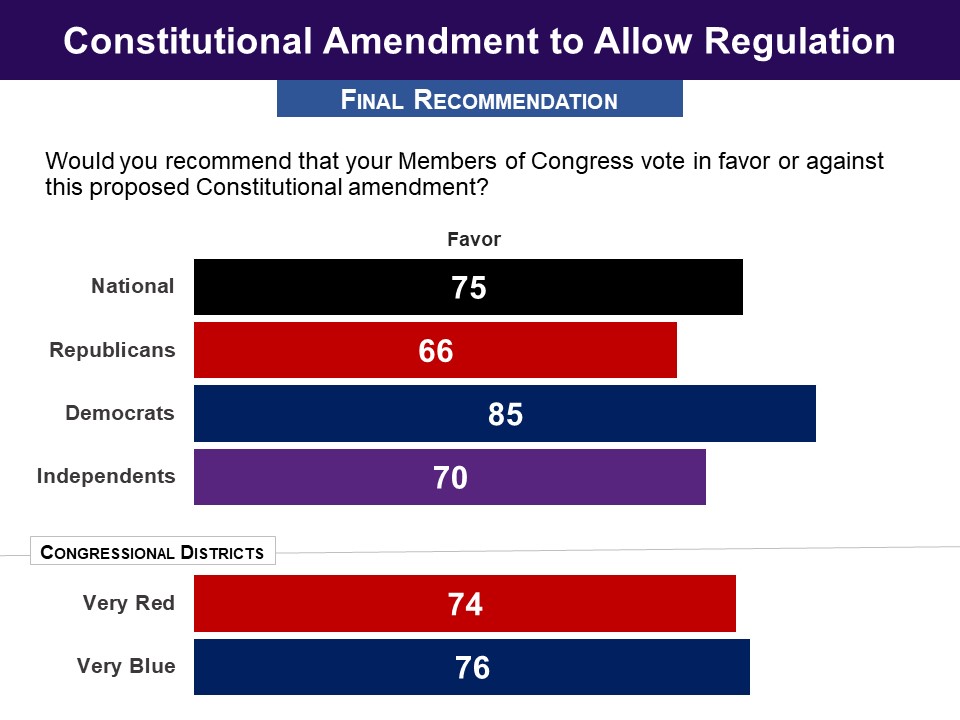
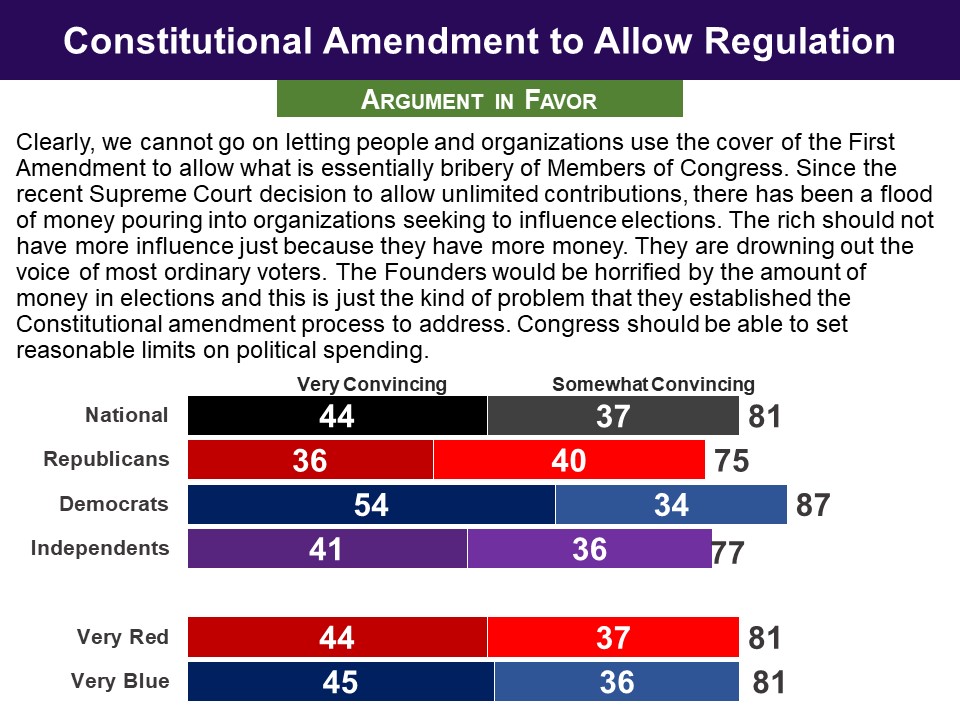
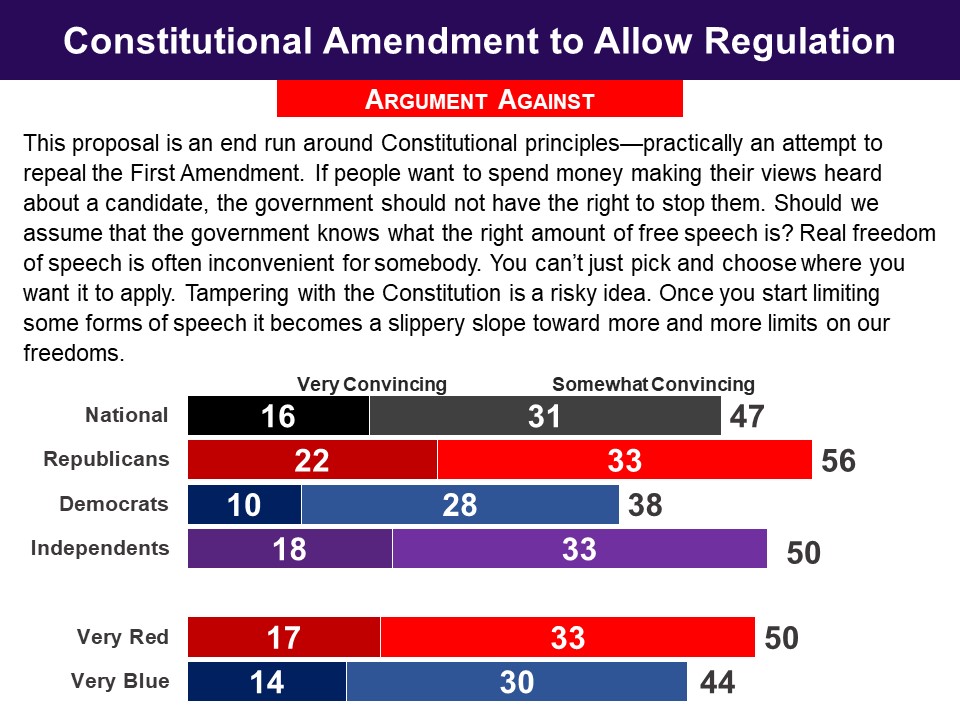 When they were asked how acceptable this part of the constitutional amendment would be to them along a 0-10 scale, with 5 being “just tolerable”, it was found at least tolerable (5-10) by 79%, including 72% of Republicans and 87% of Democrats.
When they were asked how acceptable this part of the constitutional amendment would be to them along a 0-10 scale, with 5 being “just tolerable”, it was found at least tolerable (5-10) by 79%, including 72% of Republicans and 87% of Democrats. 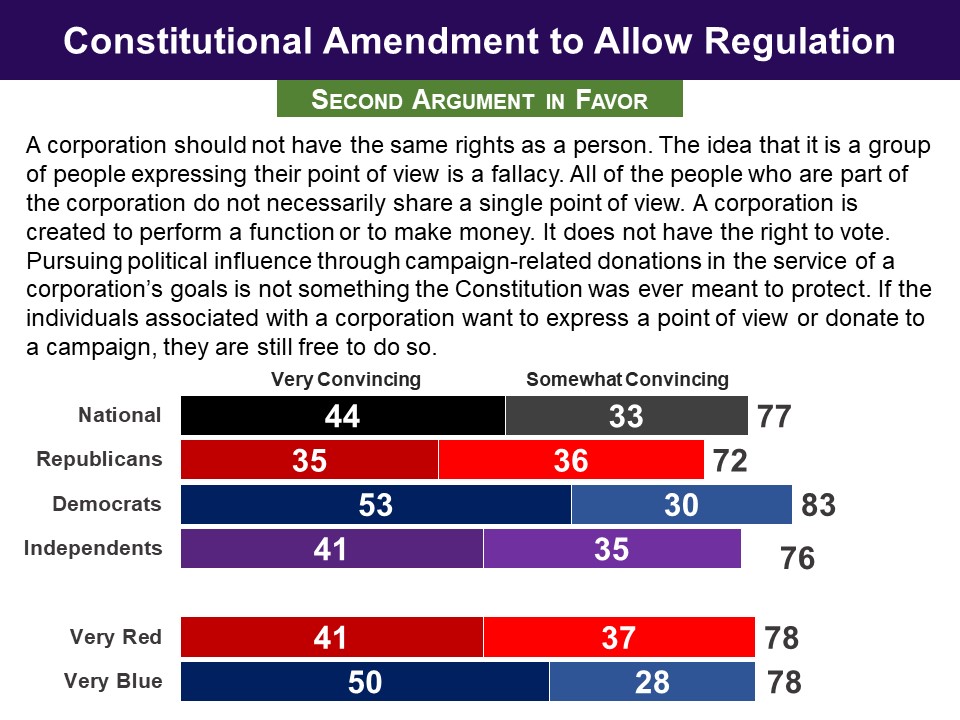
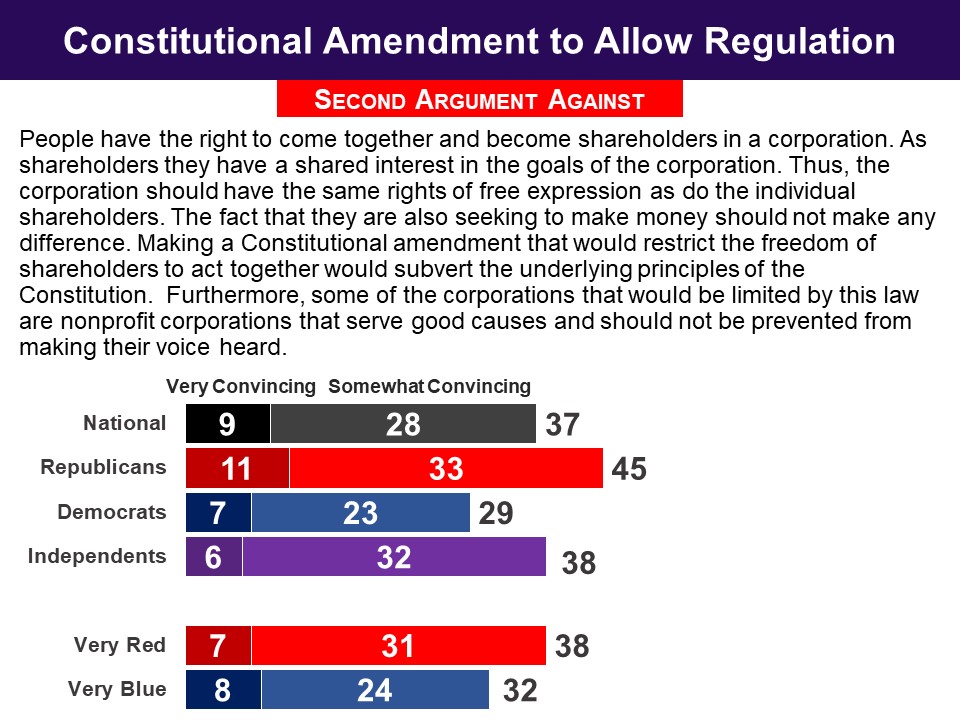
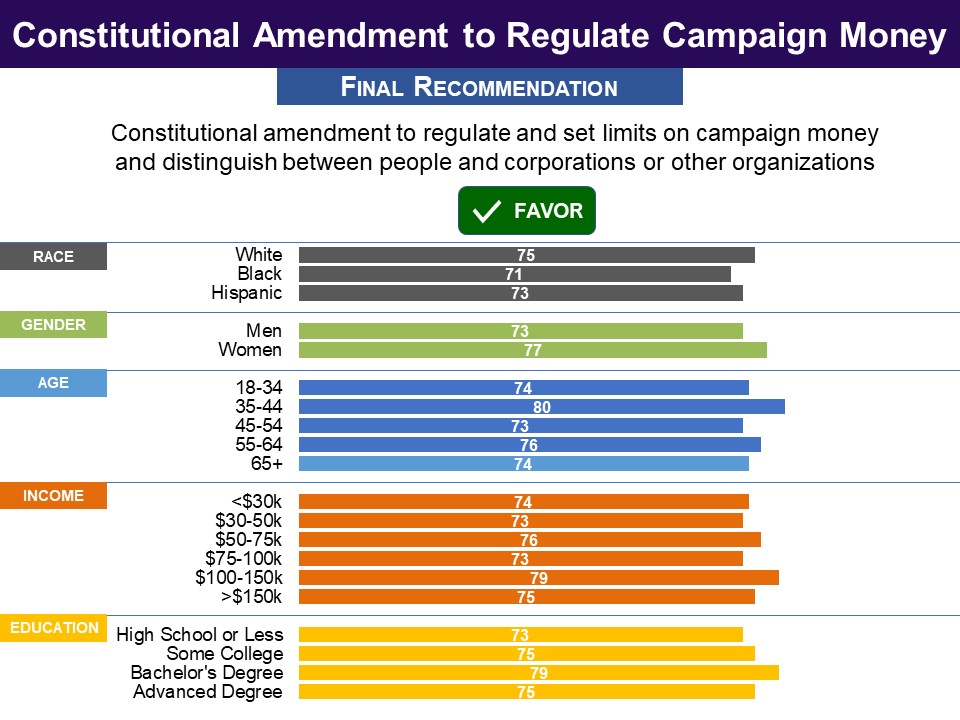 Response Without Undergoing Policymaking Simulation
Response Without Undergoing Policymaking Simulation 



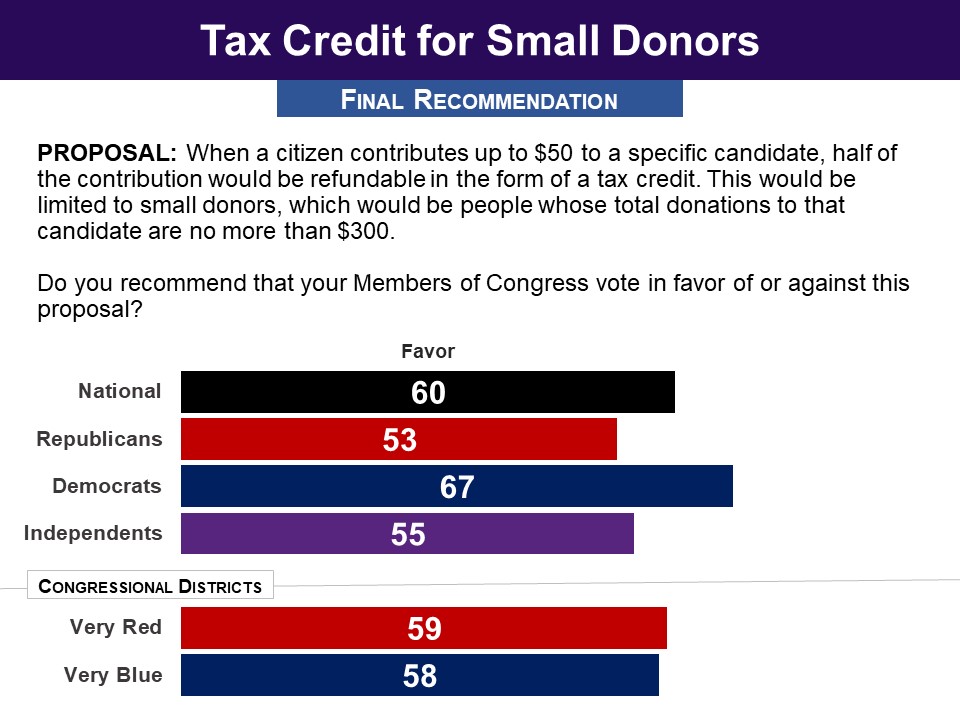
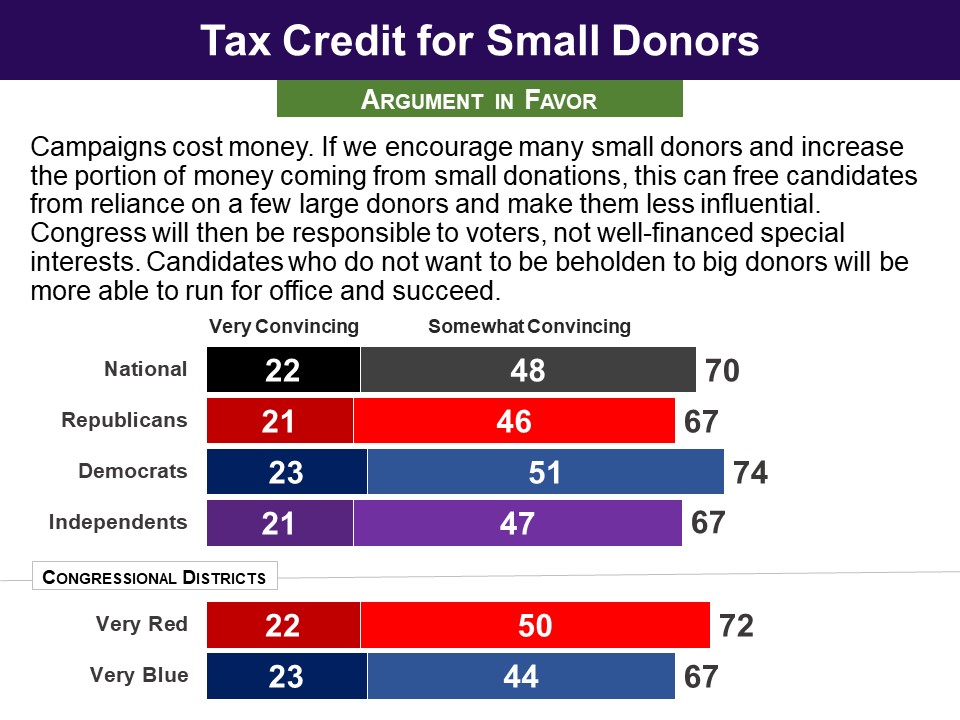
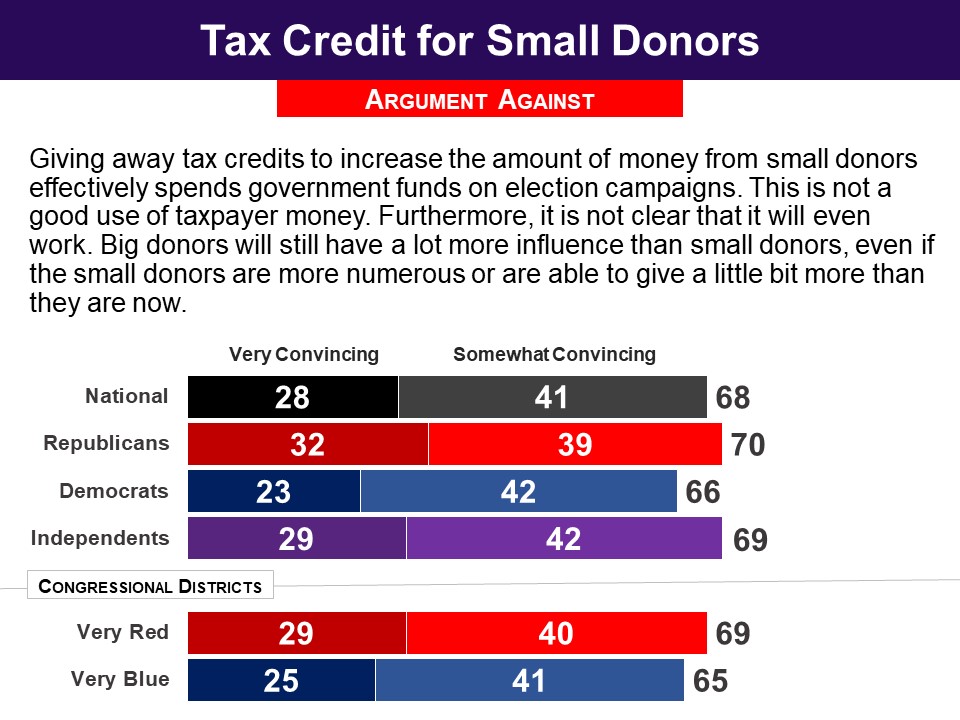
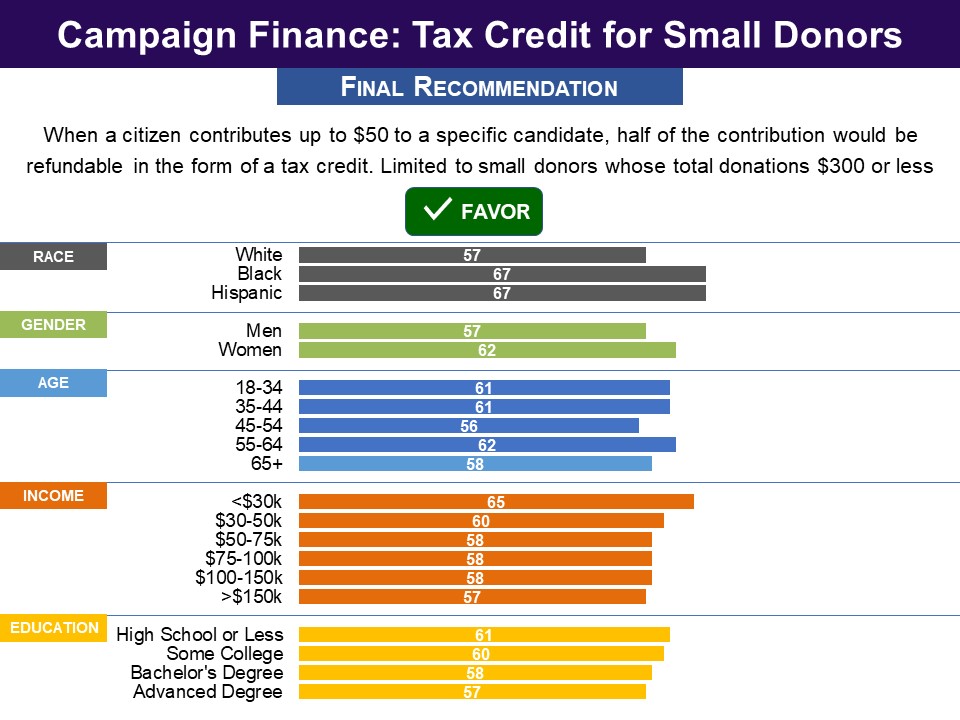 Response Without Undergoing Policymaking Simulation
Response Without Undergoing Policymaking Simulation

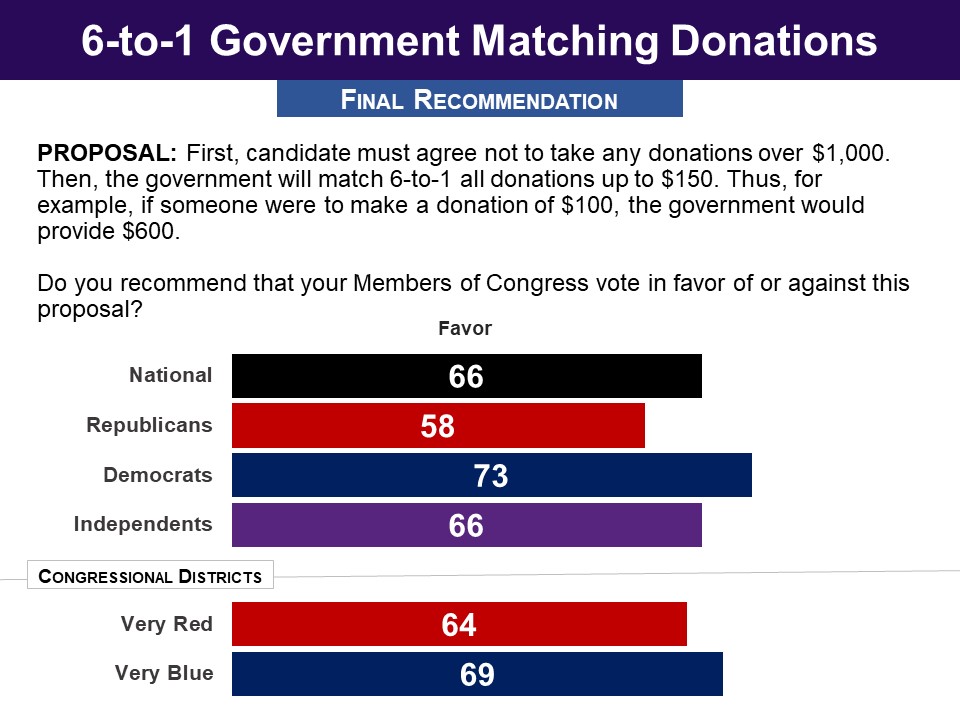
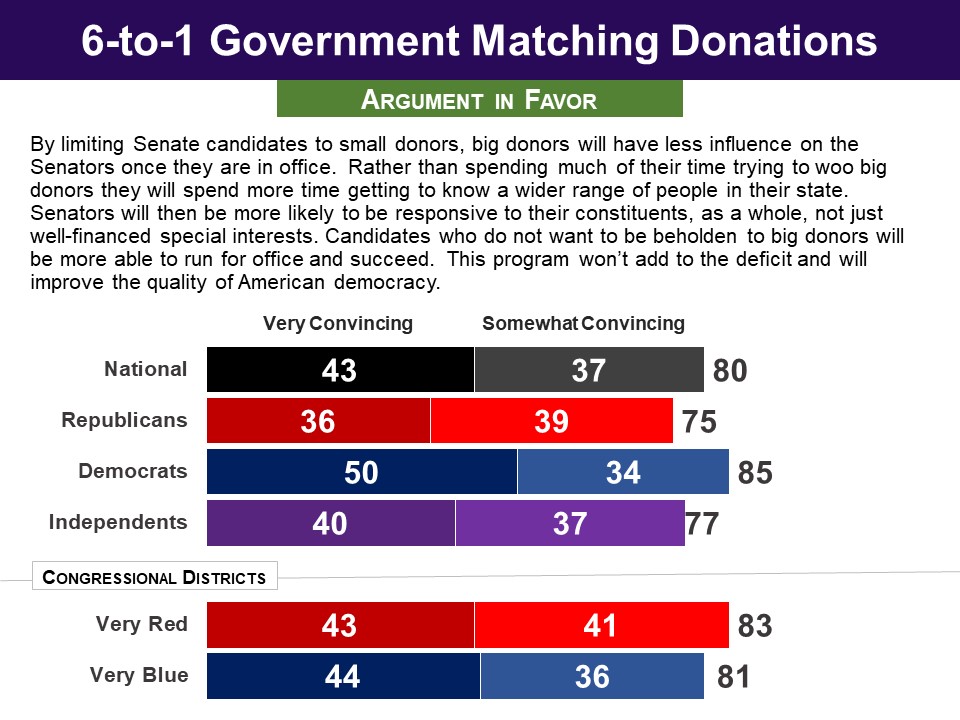
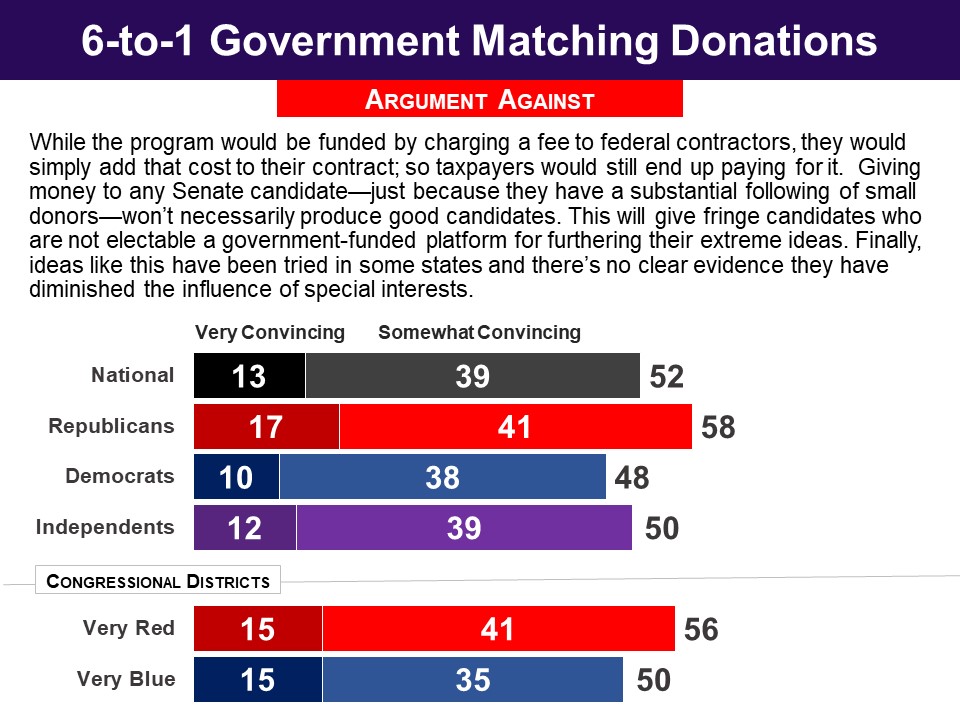
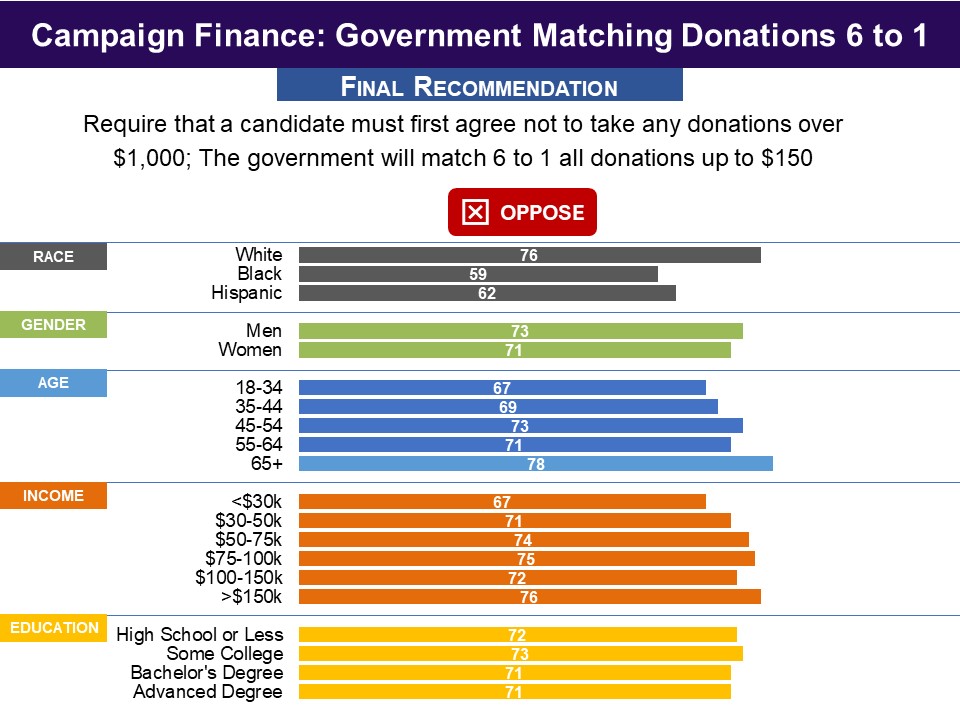 Response Without Undergoing Policymaking Simulation
Response Without Undergoing Policymaking Simulation
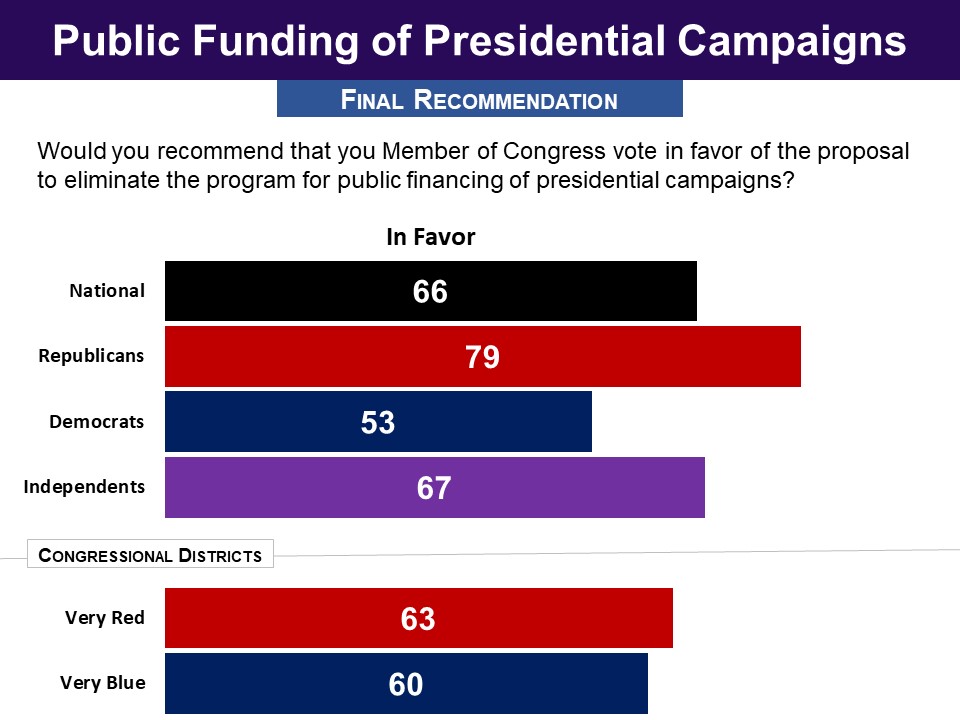
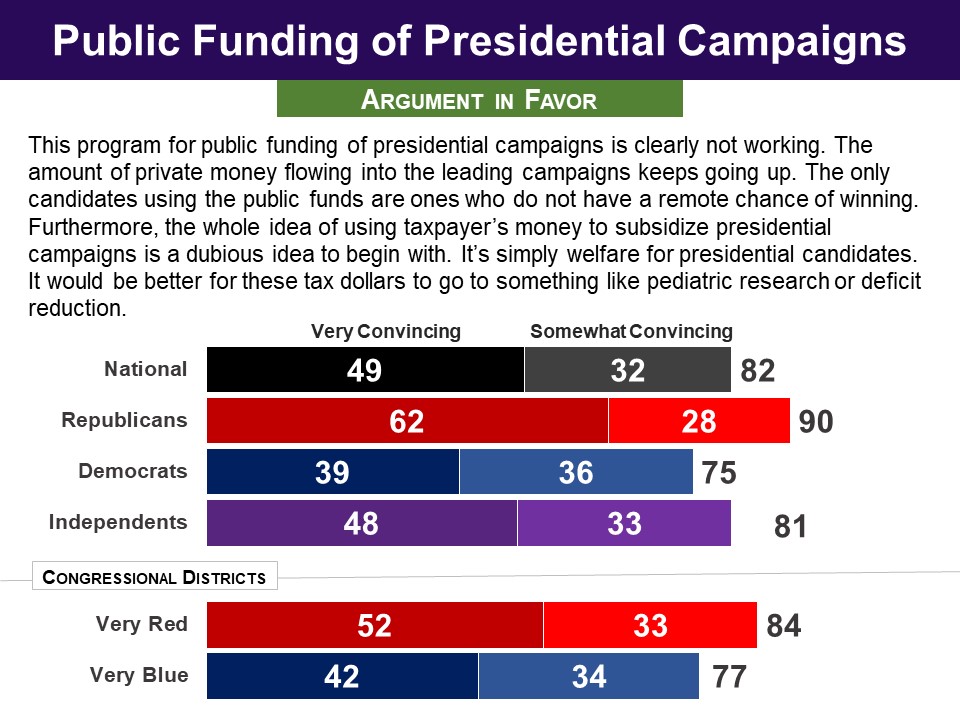
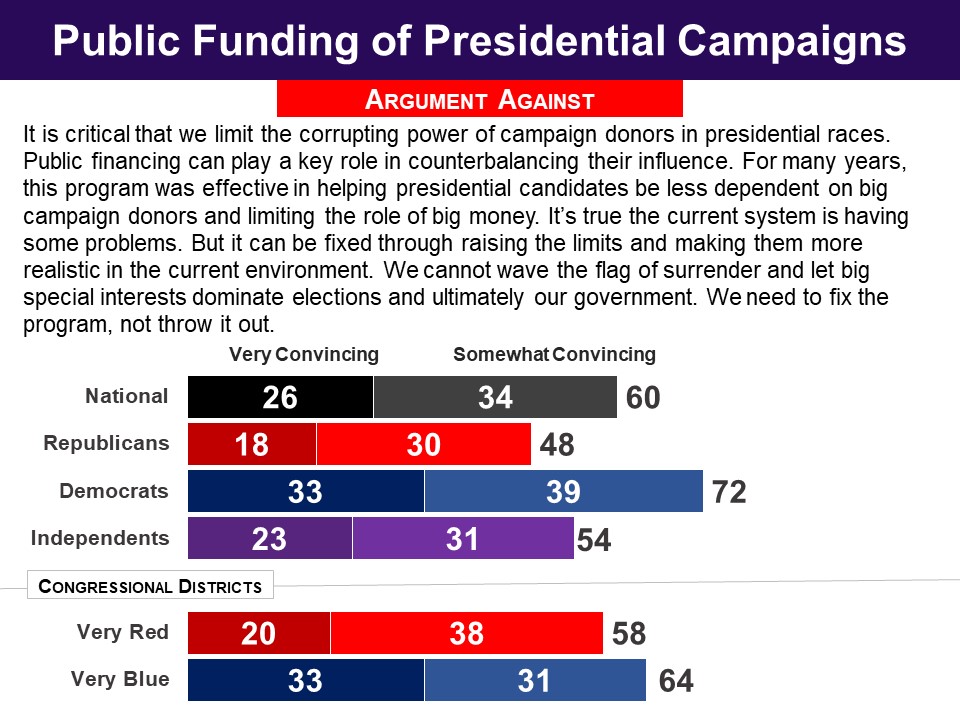
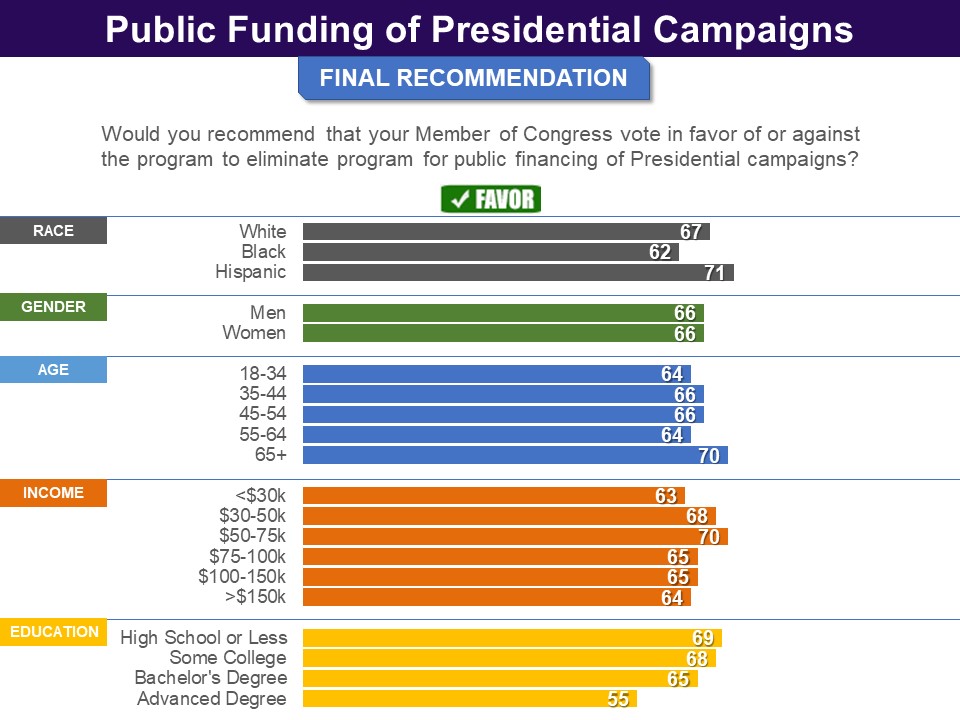 Response Without Undergoing Policymaking Simulation
Response Without Undergoing Policymaking Simulation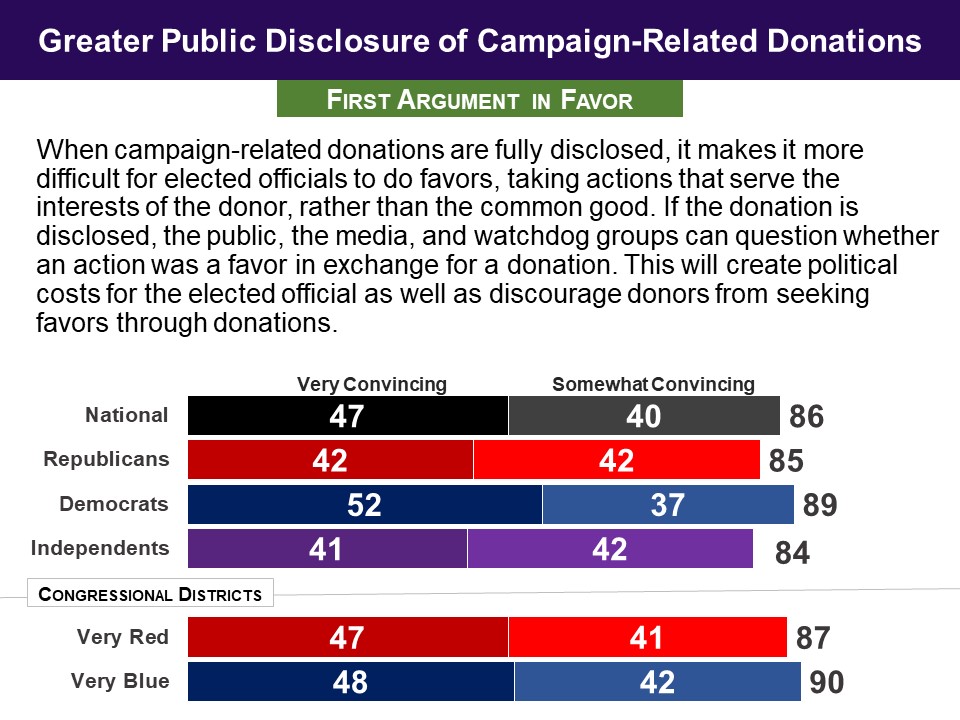
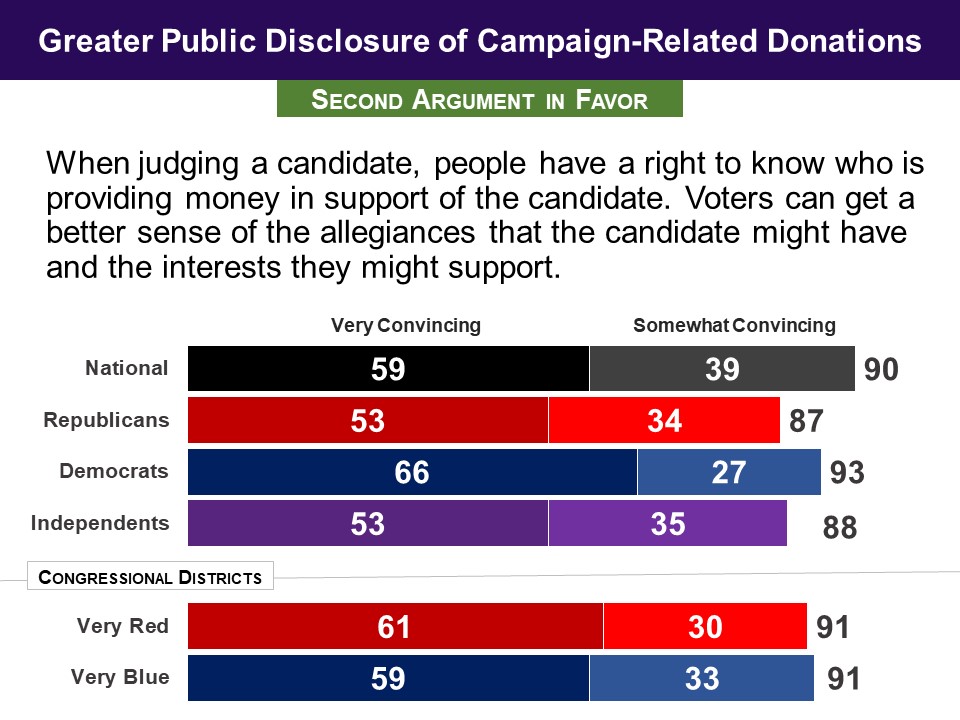 Respondents were less convinced by arguments opposed to increasing disclosures. One was found convincing by a bare majority, while the other was found convincing by just four in ten. Substantially more Republicans found them convincing then Democrats.
Respondents were less convinced by arguments opposed to increasing disclosures. One was found convincing by a bare majority, while the other was found convincing by just four in ten. Substantially more Republicans found them convincing then Democrats.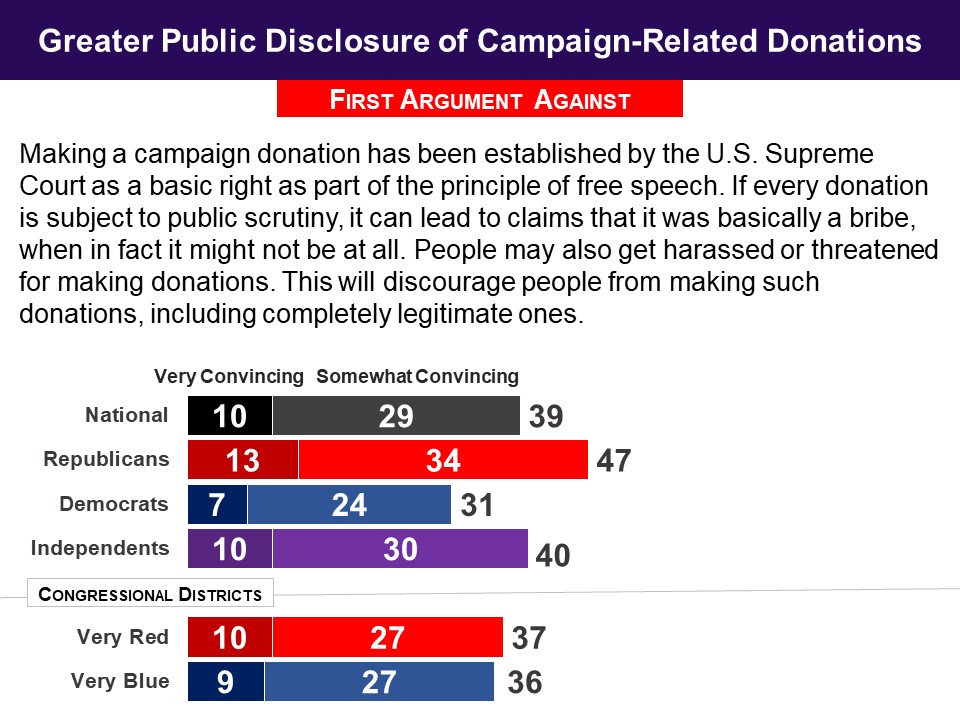
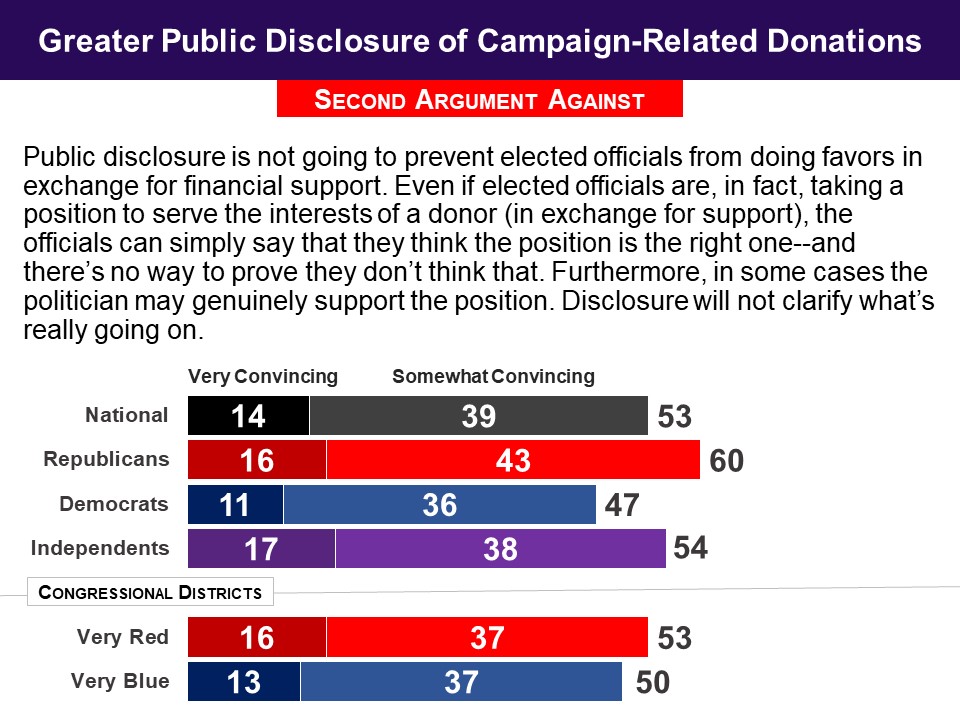



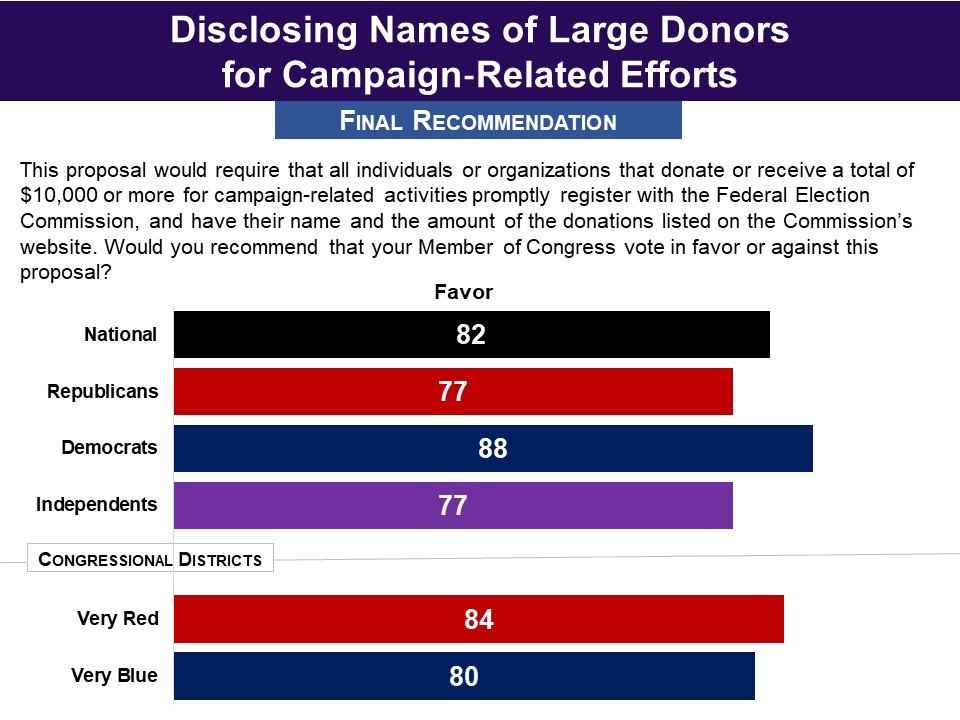 There was substantial optimism that this measure would be effective. Asked, “How effective do you think this proposal, if enacted, would likely be in reducing or counterbalancing the influence of big campaign donors,” 65% said they thought it would be effective (very 19%). Democrats were more likely to believe it would be effective (73%, very 23%) than Republicans (58%, very 15%).
There was substantial optimism that this measure would be effective. Asked, “How effective do you think this proposal, if enacted, would likely be in reducing or counterbalancing the influence of big campaign donors,” 65% said they thought it would be effective (very 19%). Democrats were more likely to believe it would be effective (73%, very 23%) than Republicans (58%, very 15%).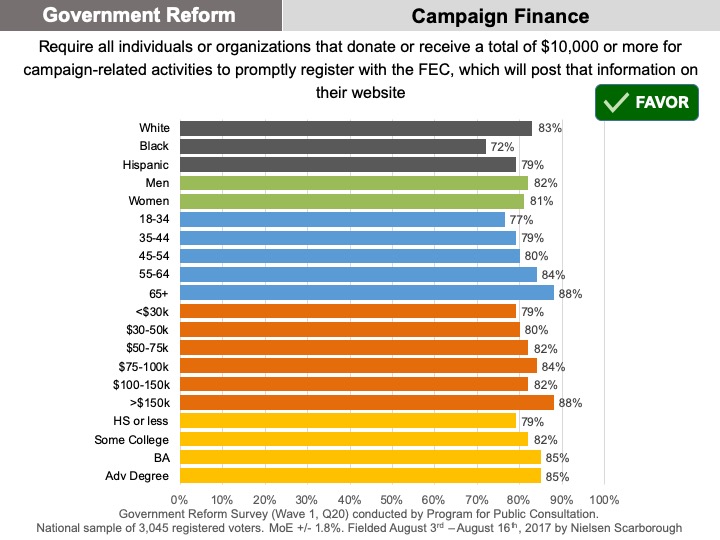

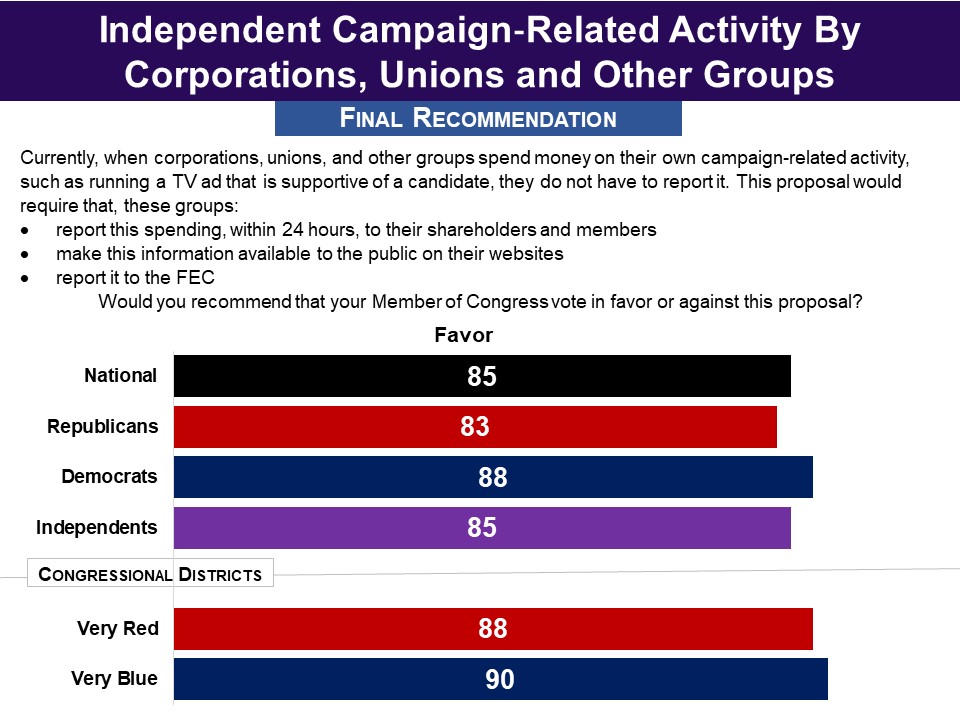 There was optimism that this measure would be effective. Two thirds (65%) said they thought it would be effective (very 20%). Democrats were slightly more likely to believe it would be effective (69%, very 22%) than Republicans (63%, very 21%).
There was optimism that this measure would be effective. Two thirds (65%) said they thought it would be effective (very 20%). Democrats were slightly more likely to believe it would be effective (69%, very 22%) than Republicans (63%, very 21%).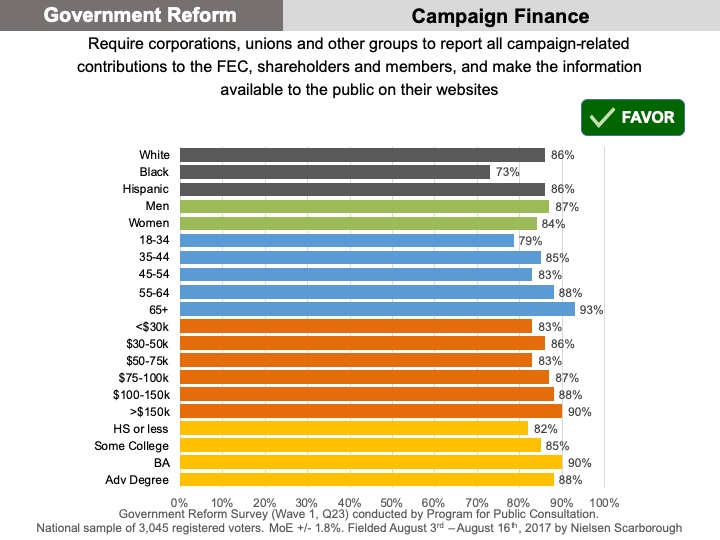




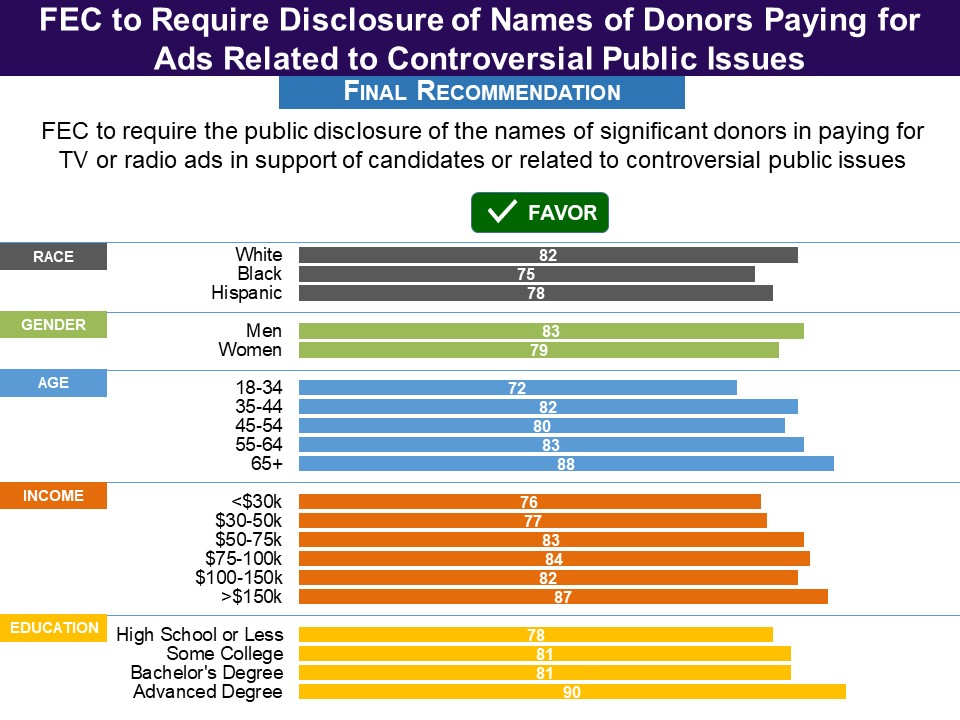



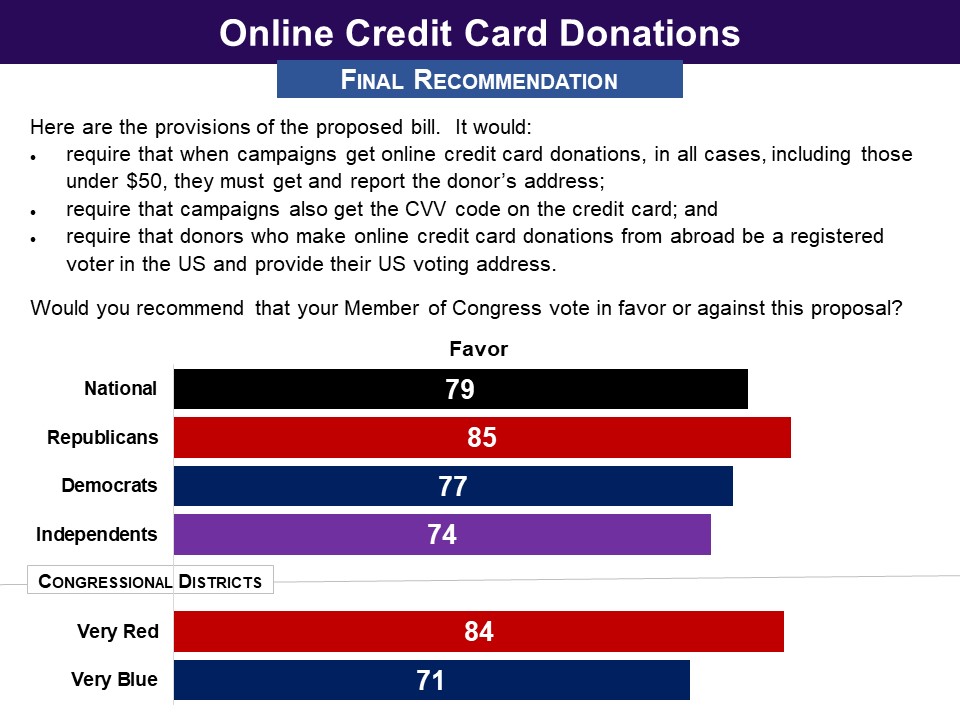
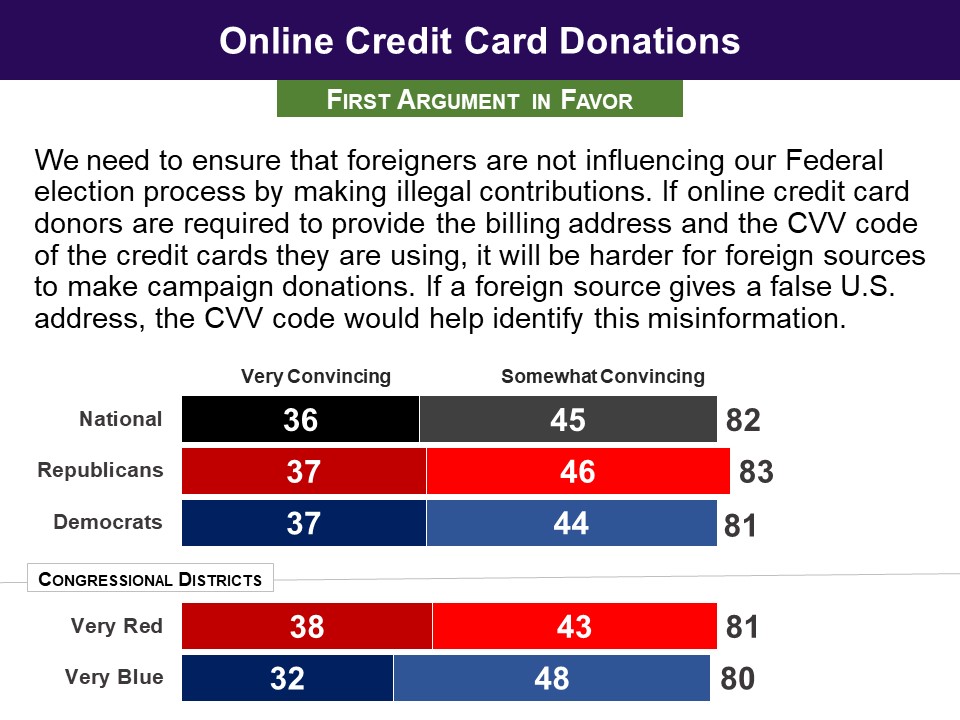
 Respondents were then presented with the full details of the proposal and asked to rate its acceptability on a 0-10 scale, with 5 being “just tolerable”, 86% found it at least tolerable (5-10), including 88% of Republicans and 86% of Democrats.
Respondents were then presented with the full details of the proposal and asked to rate its acceptability on a 0-10 scale, with 5 being “just tolerable”, 86% found it at least tolerable (5-10), including 88% of Republicans and 86% of Democrats.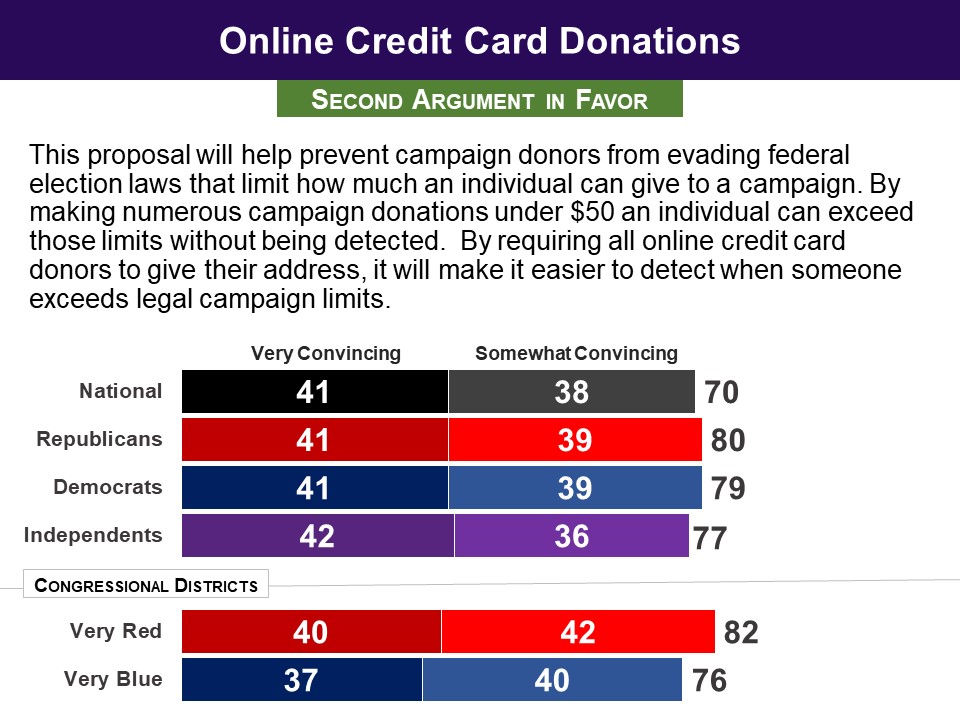
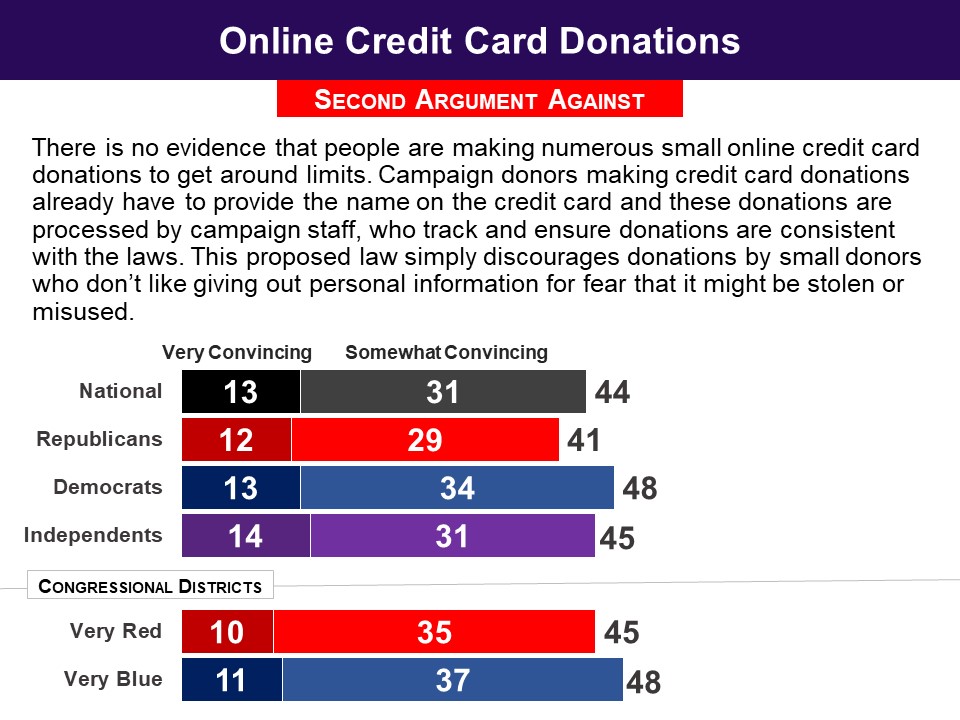 Respondents were then given another set of arguments focusing on the potential for the use of stolen credit cards. The pro argument was found convincing by an overwhelming 86%, with the same level of support from Republicans and Democrats. The counter argument found more division, with 52% finding it convincing. Republicans were fairly evenly divided with Democrats leaning toward being convinced (56%).
Respondents were then given another set of arguments focusing on the potential for the use of stolen credit cards. The pro argument was found convincing by an overwhelming 86%, with the same level of support from Republicans and Democrats. The counter argument found more division, with 52% finding it convincing. Republicans were fairly evenly divided with Democrats leaning toward being convinced (56%).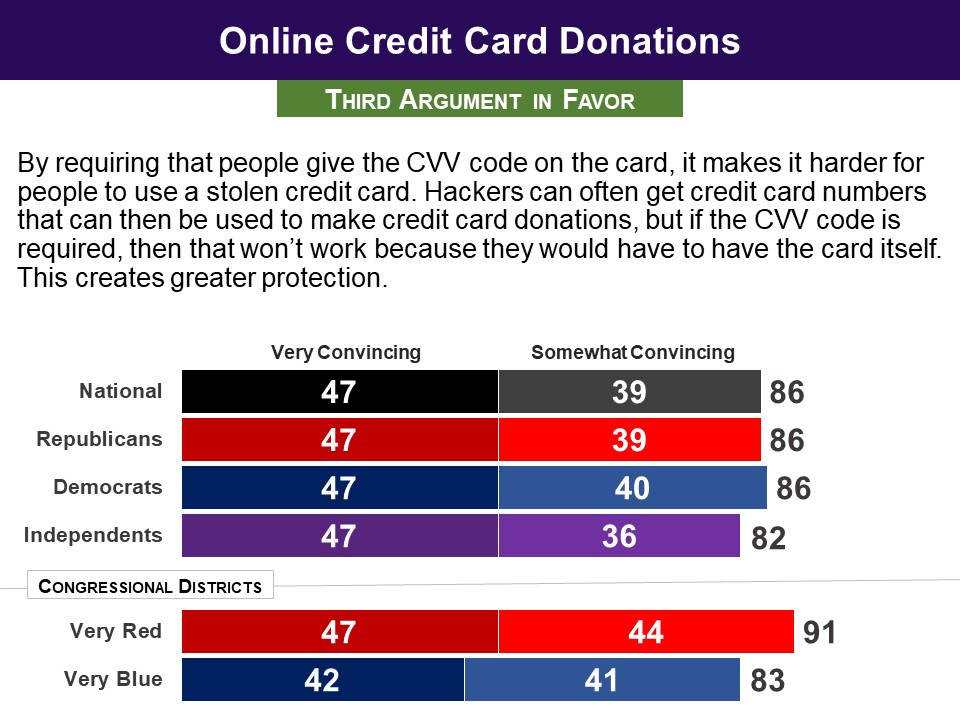

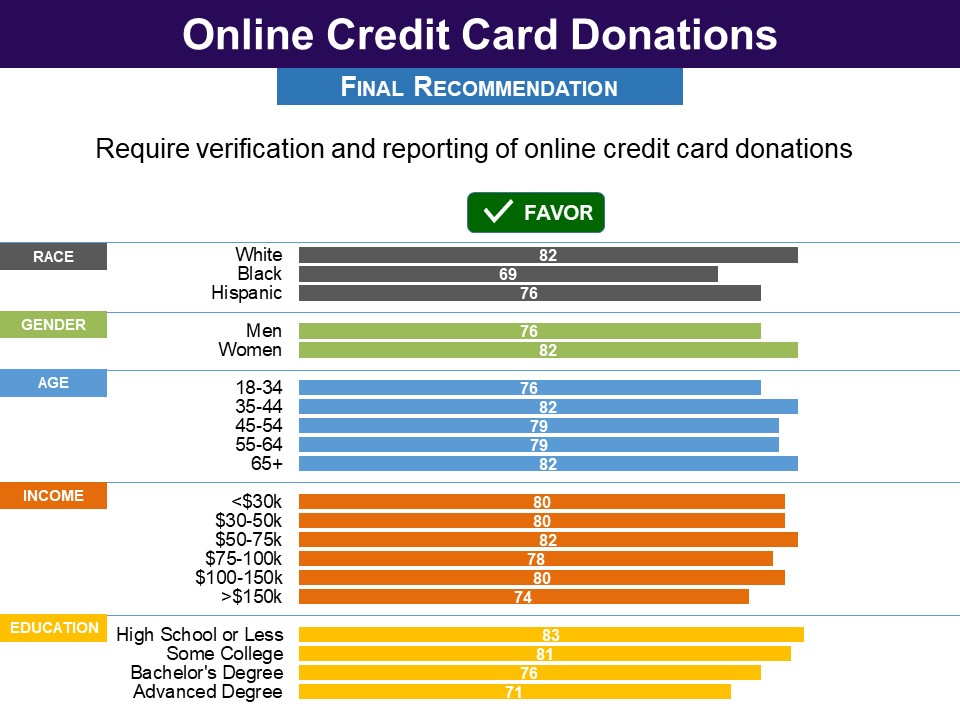 Status of Legislation
Status of Legislation

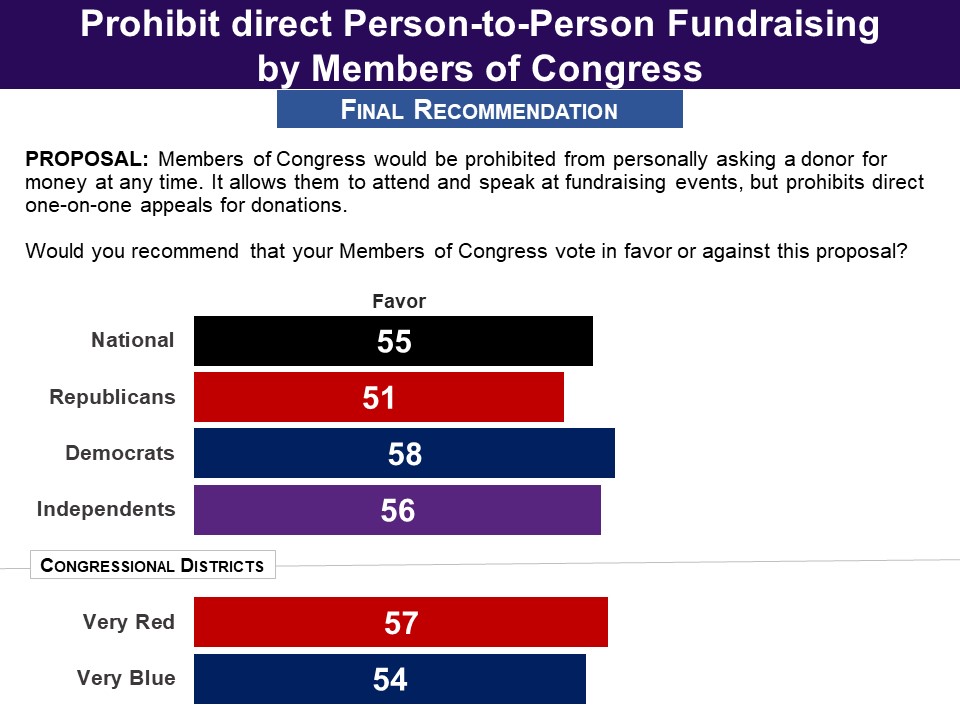

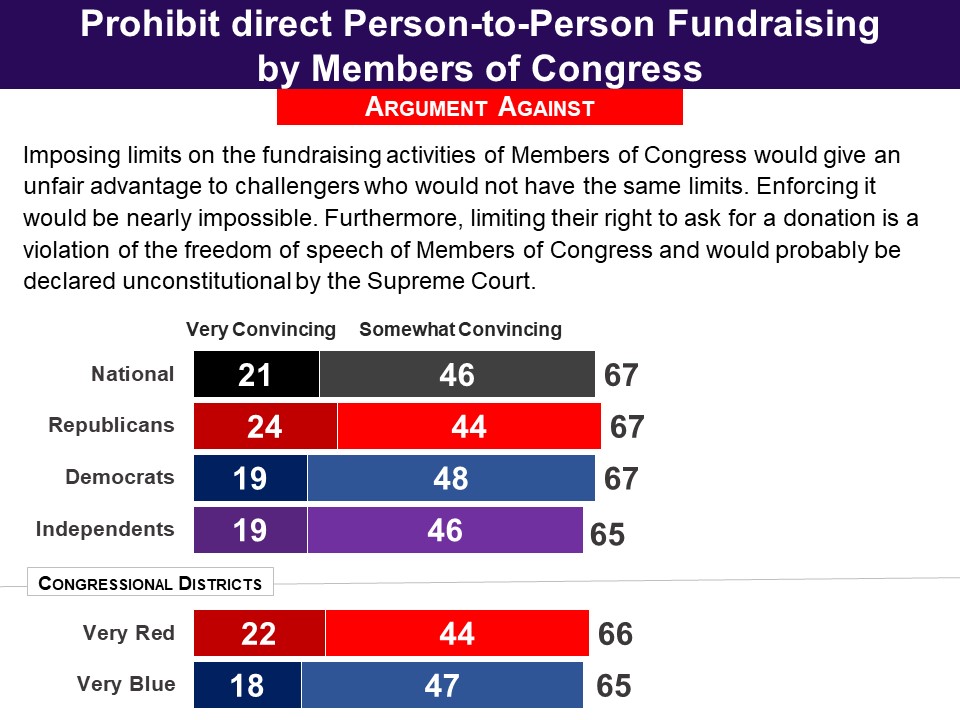
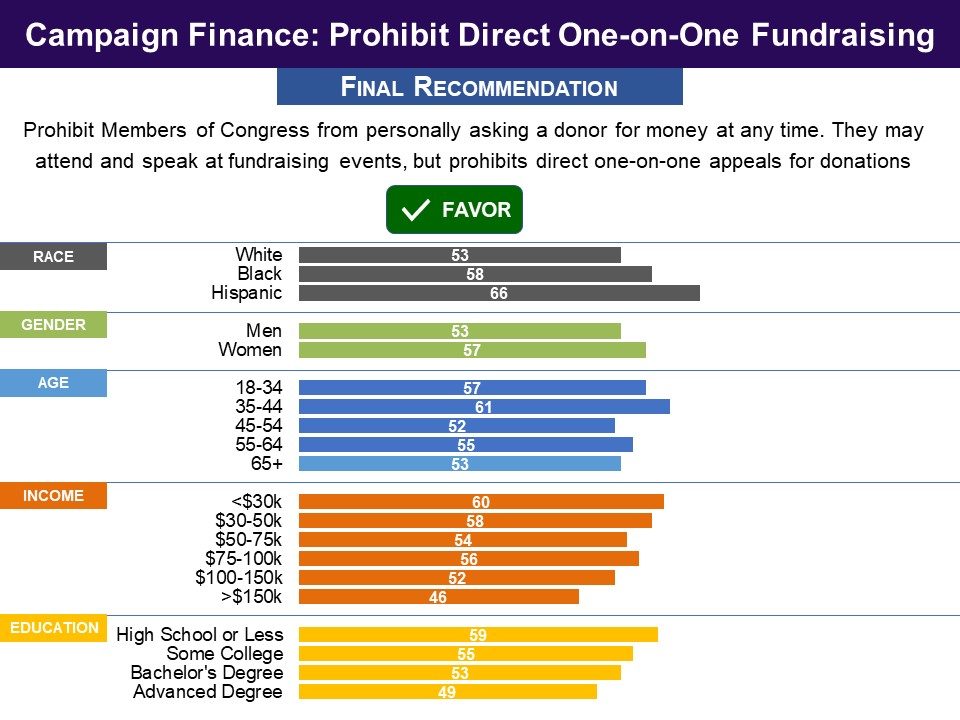
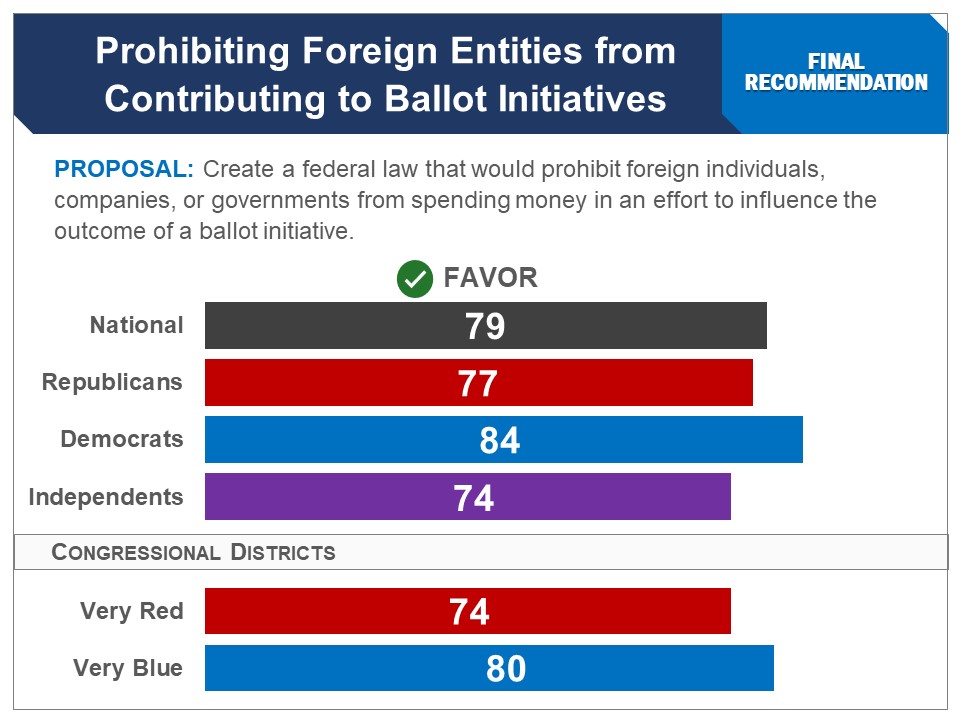
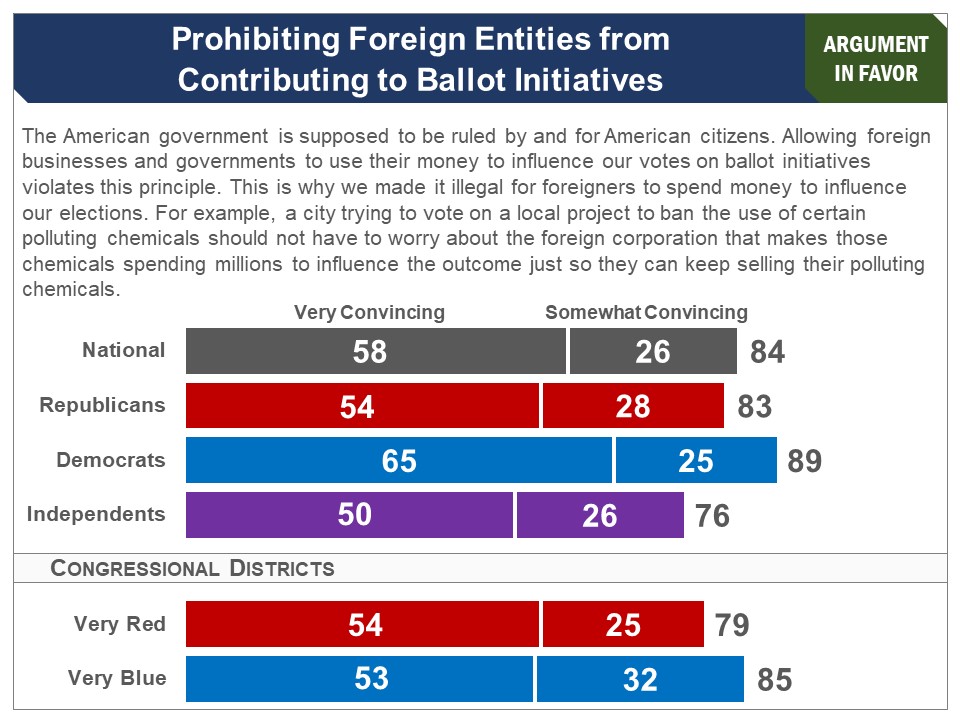
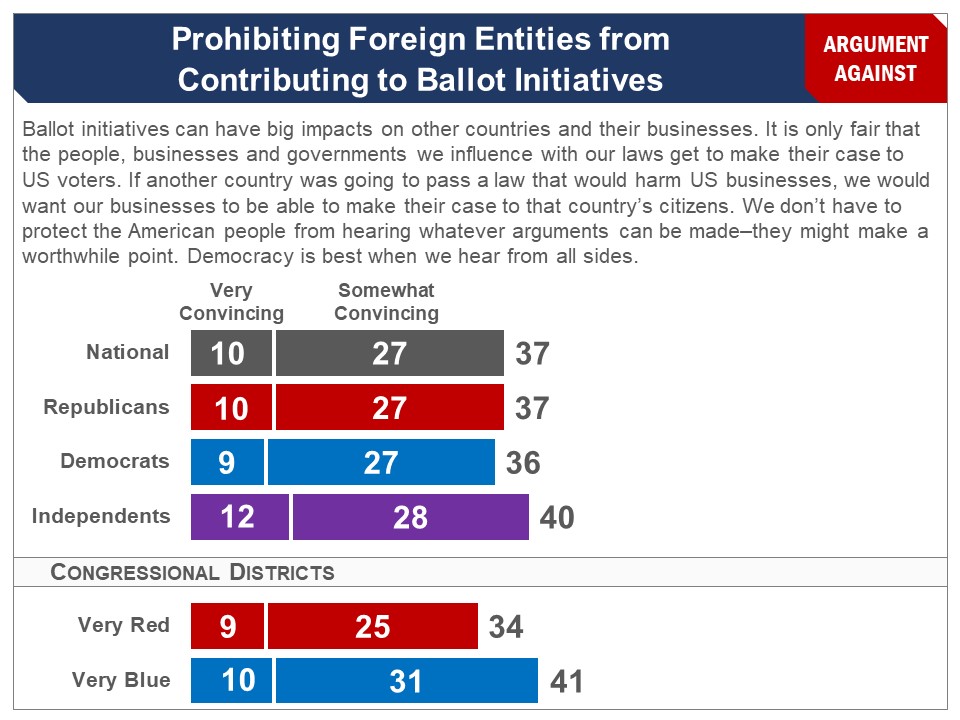
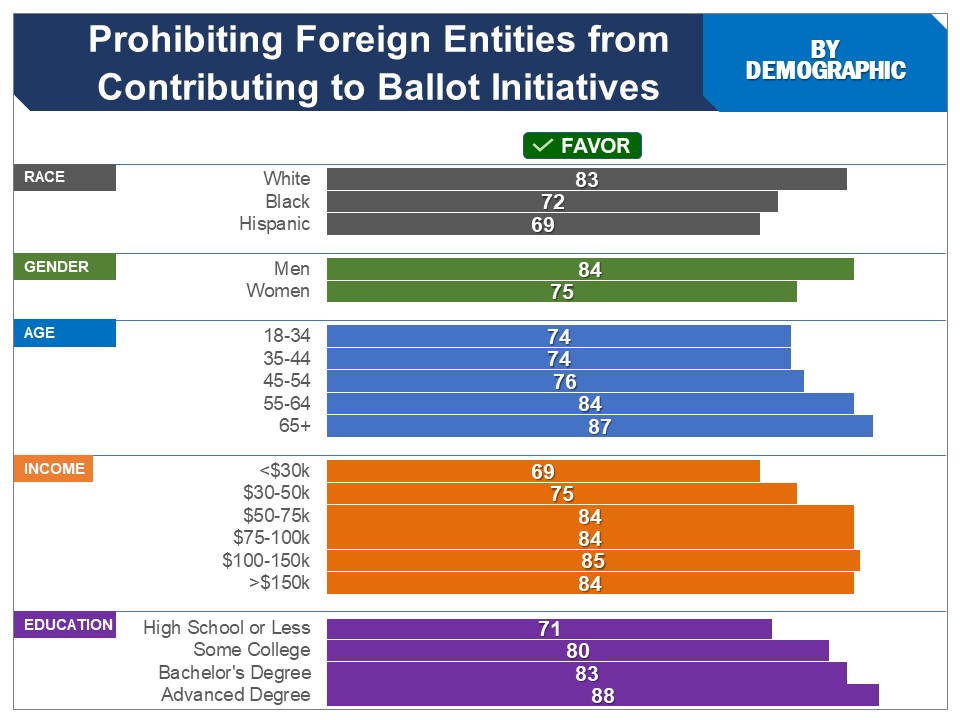










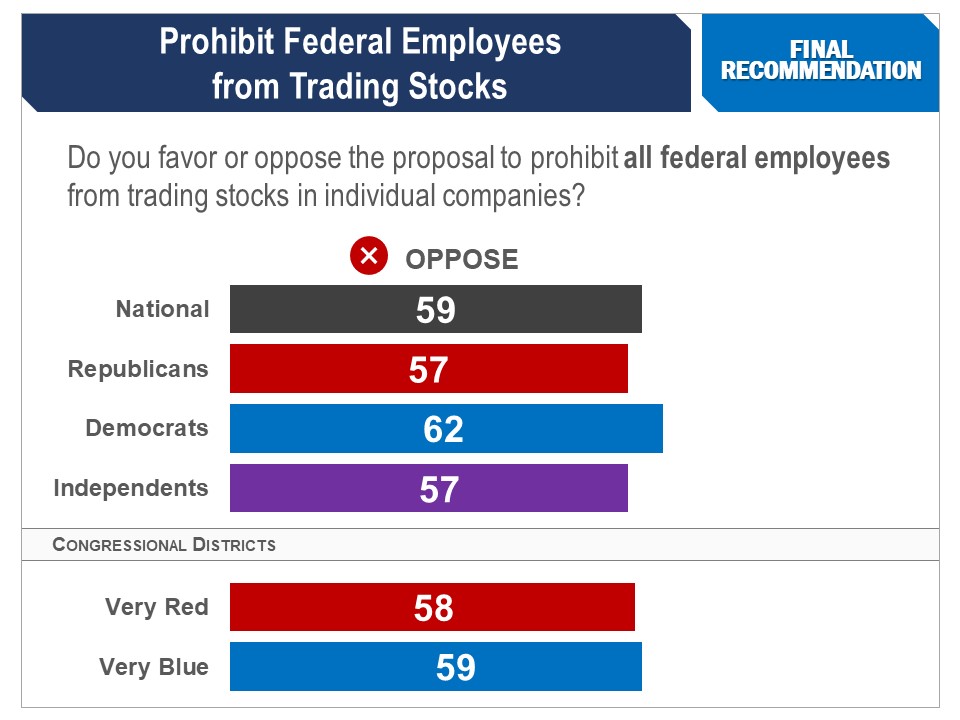


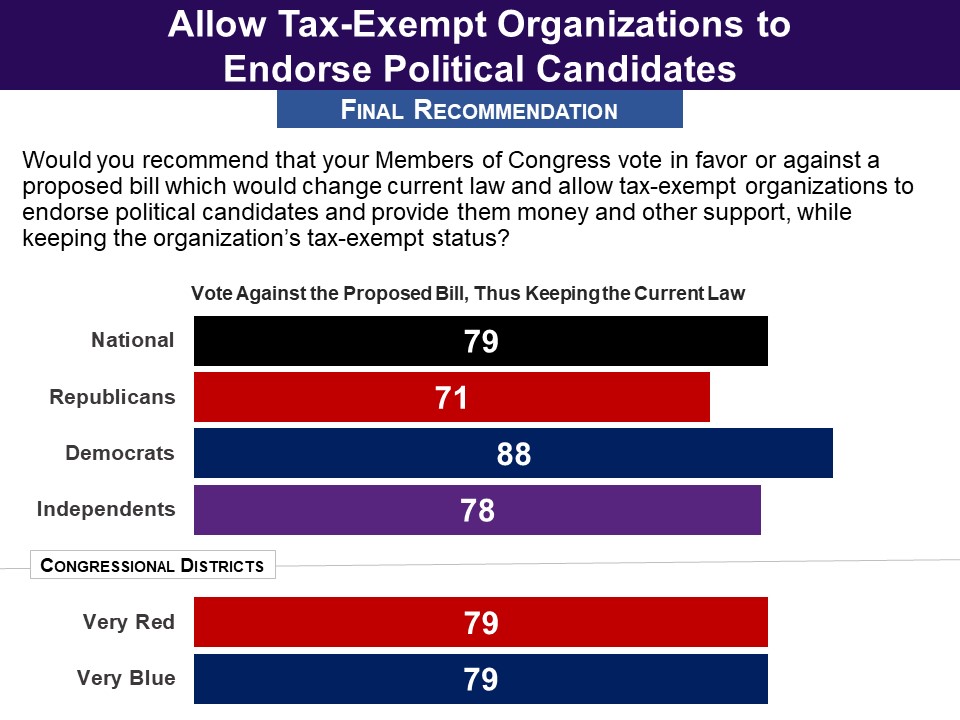
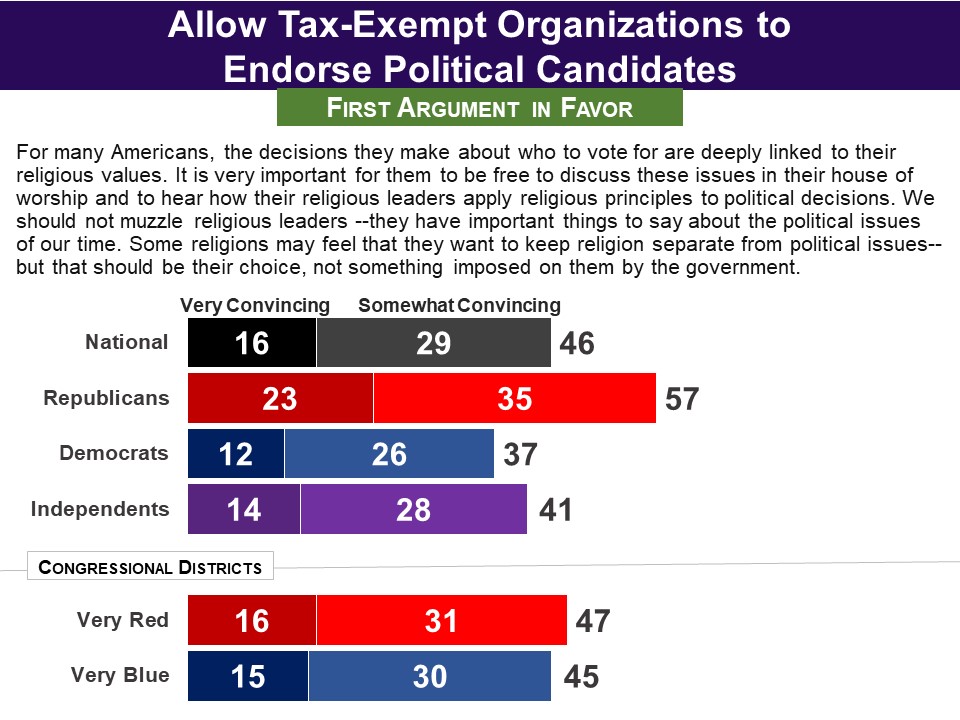
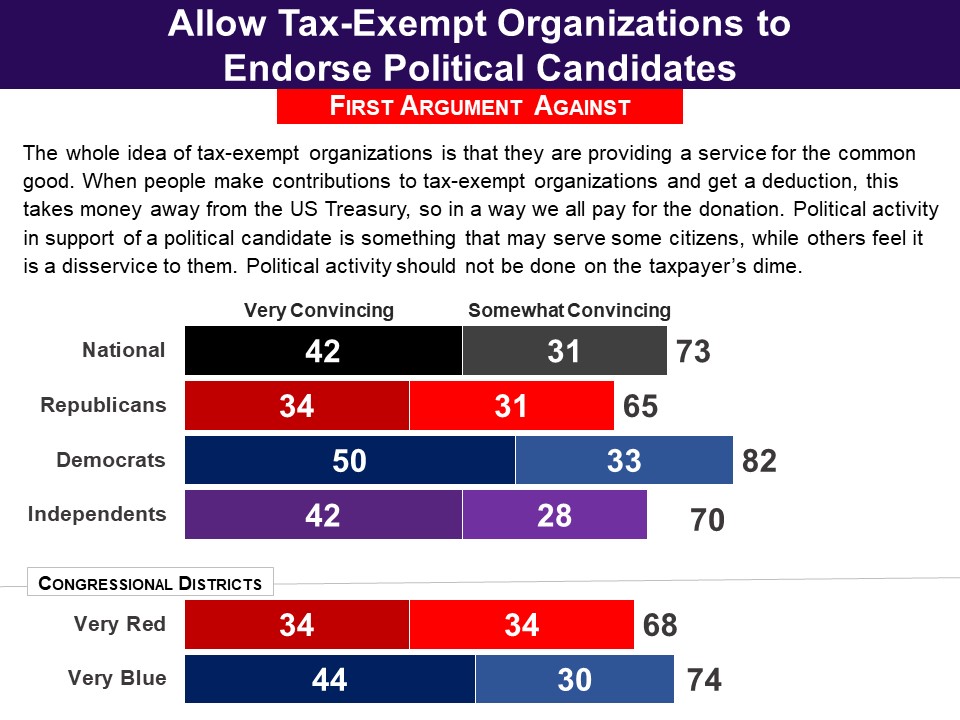
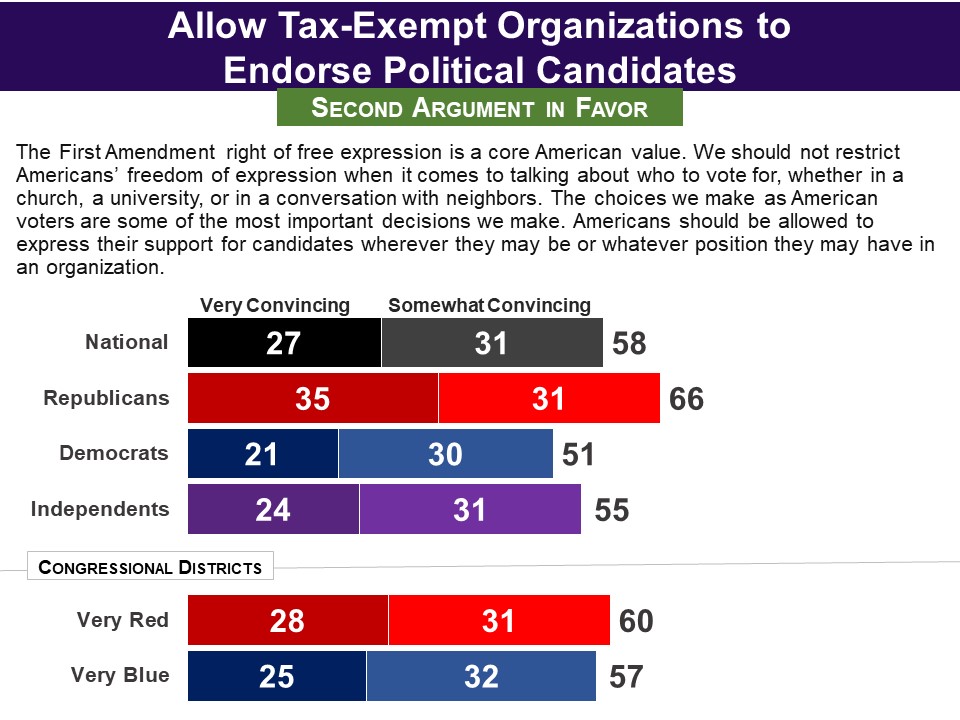
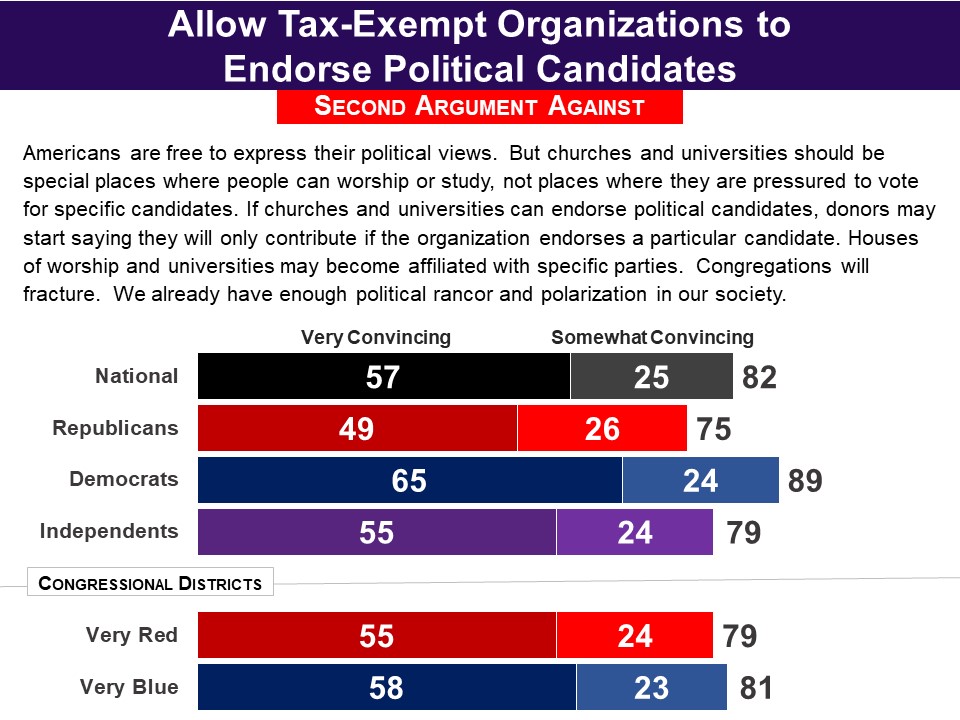
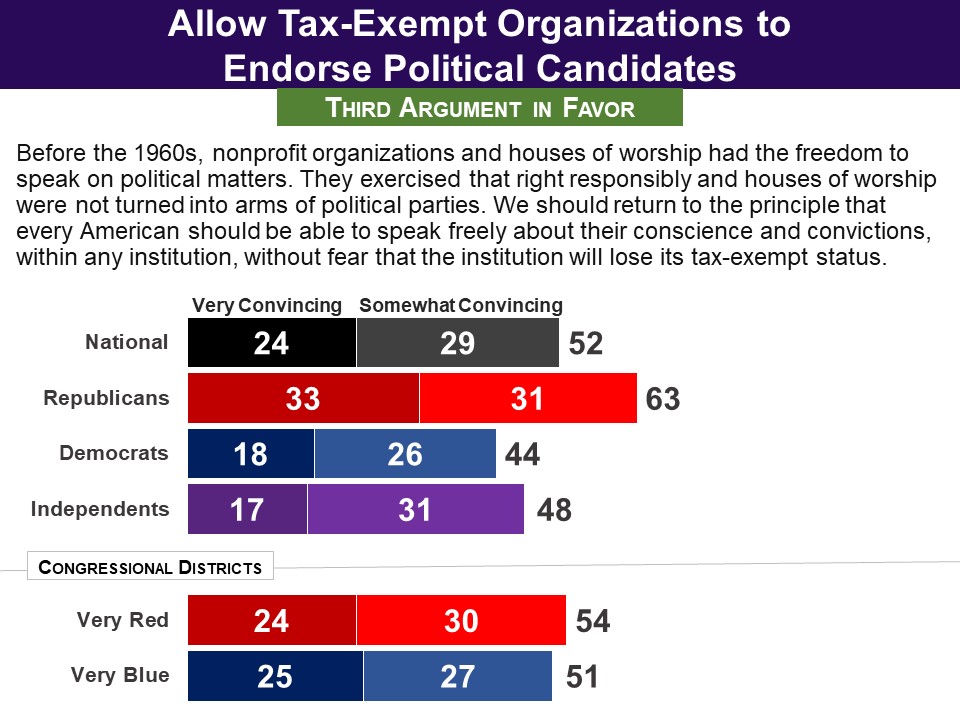
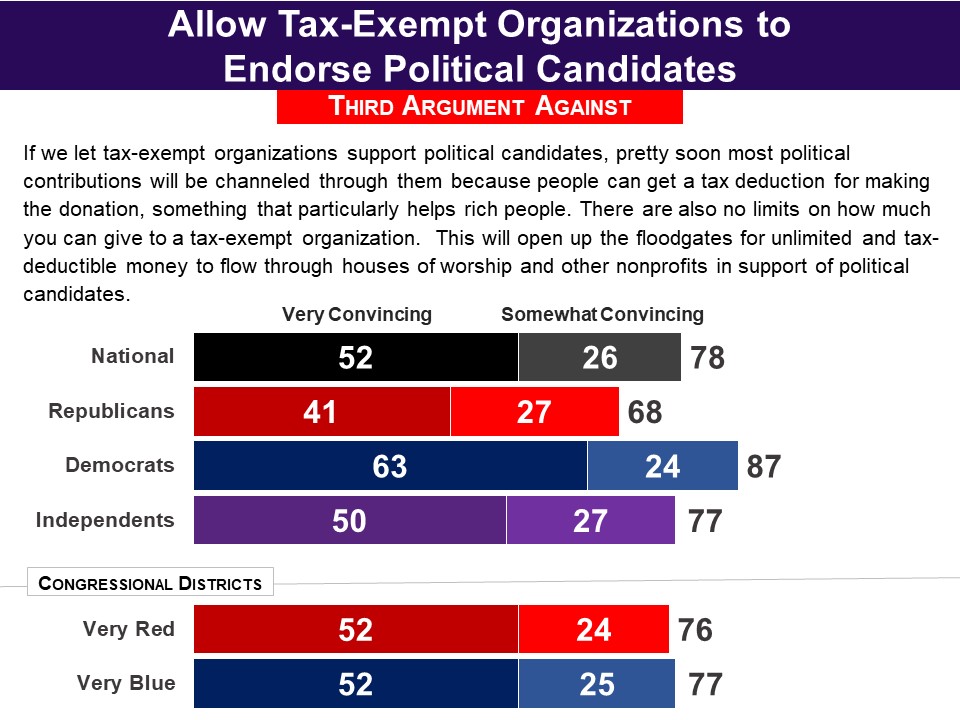
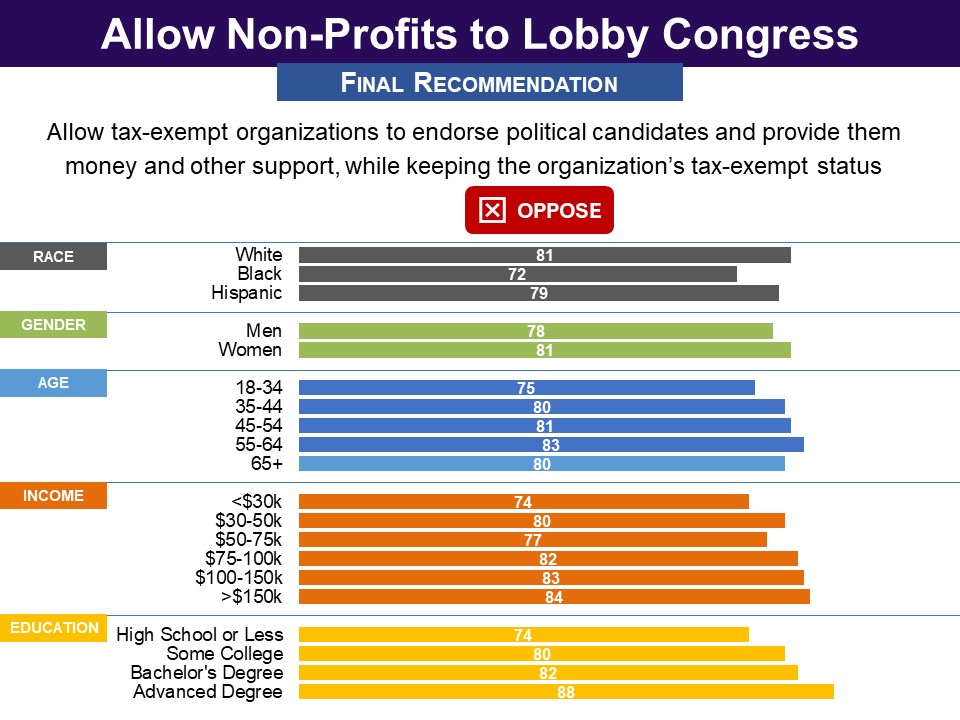 Response Without Undergoing Policymaking Simulation
Response Without Undergoing Policymaking Simulation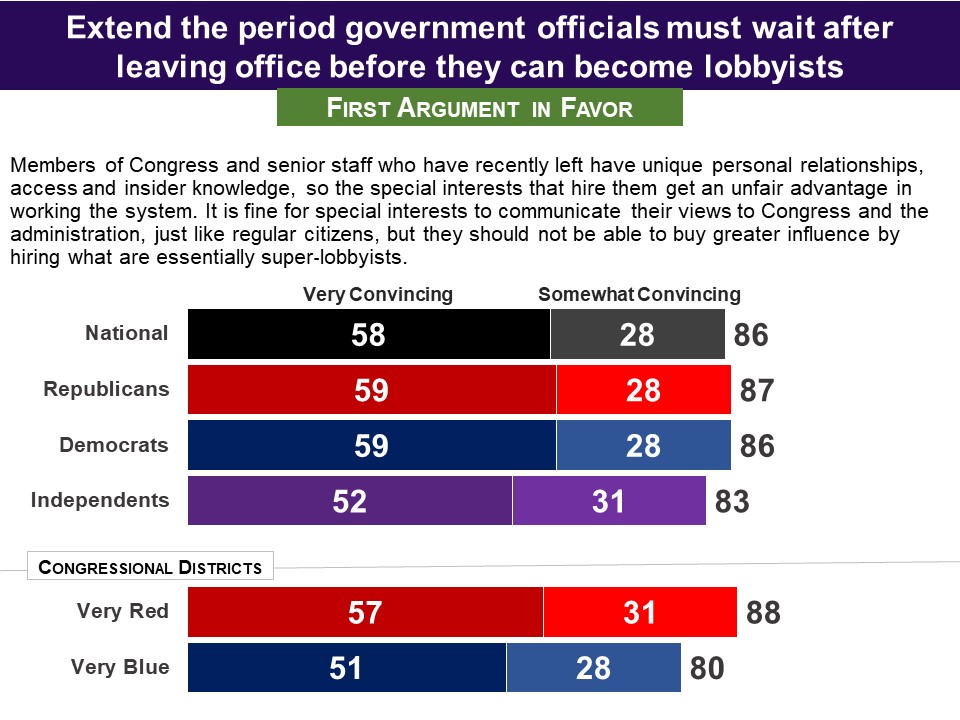
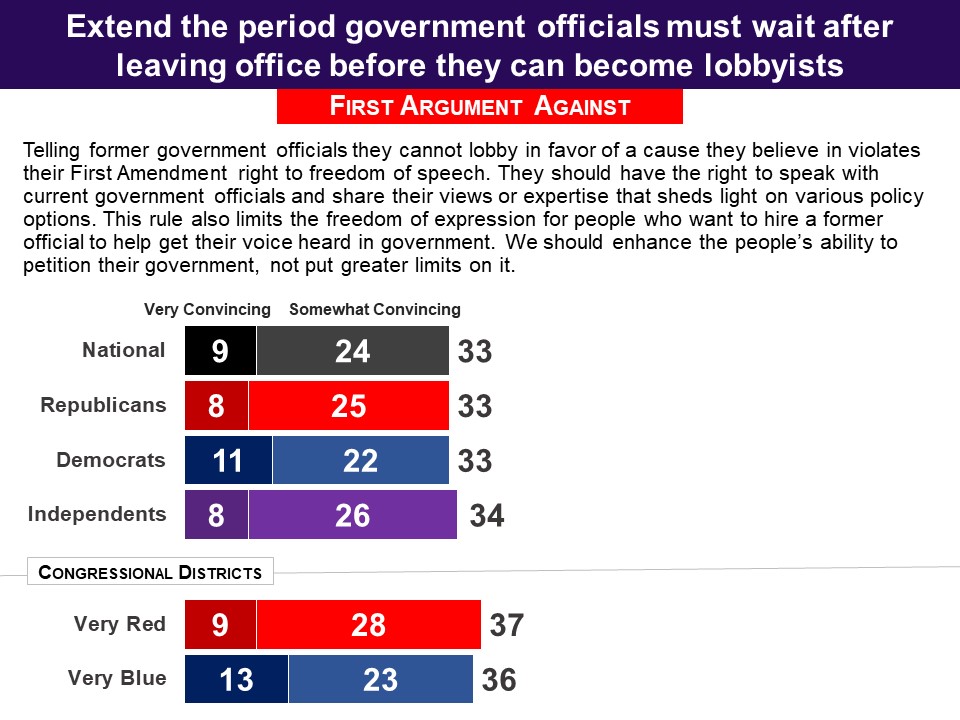
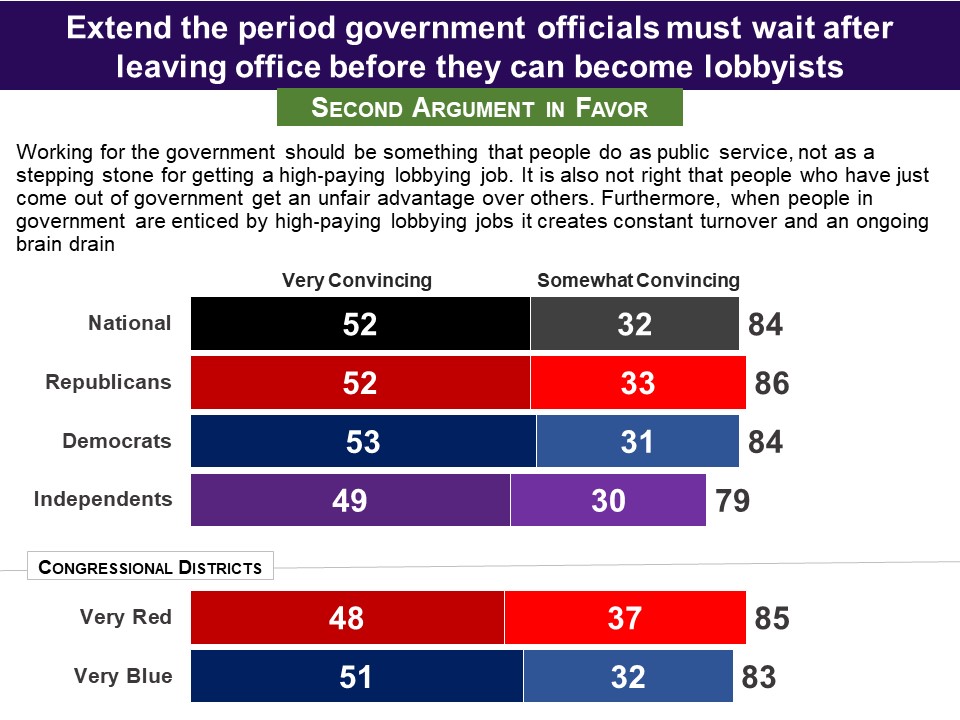
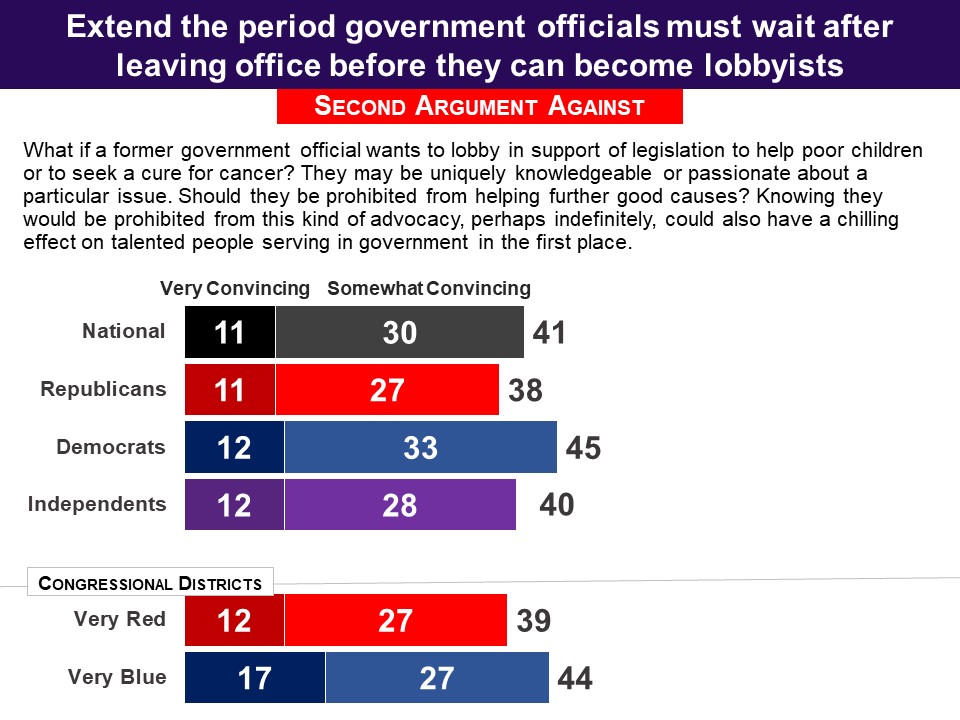
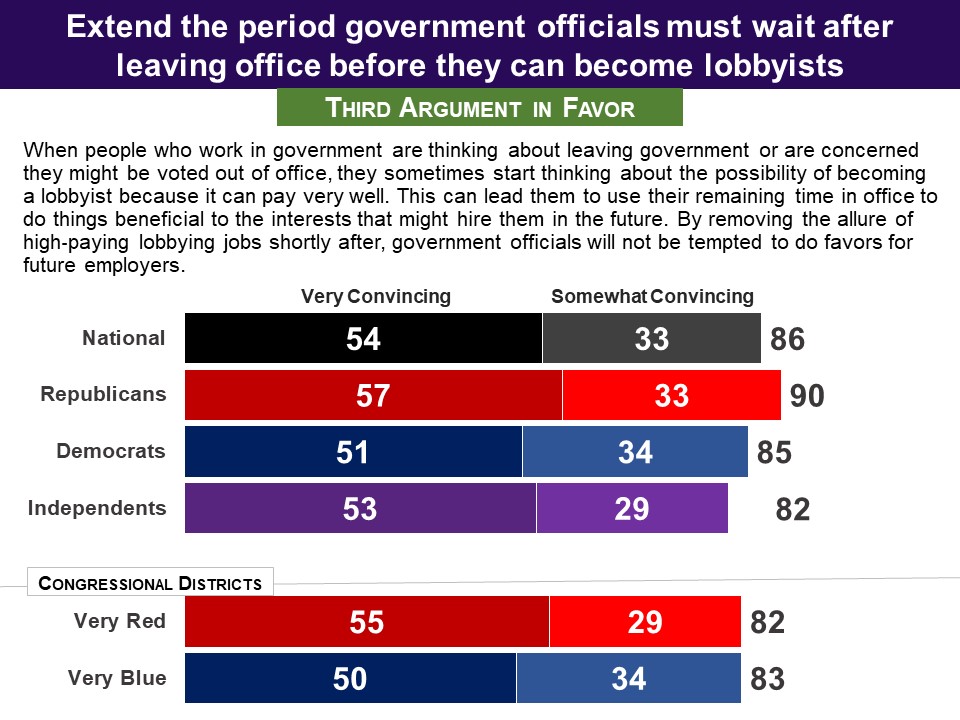
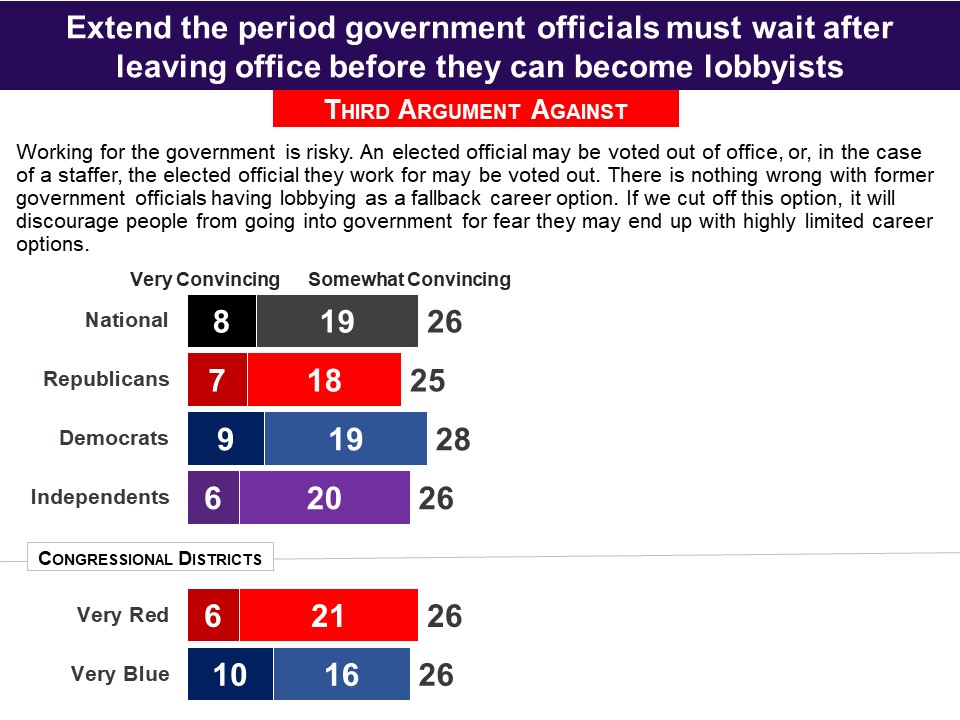 They were then presented with a set of proposals:
They were then presented with a set of proposals:
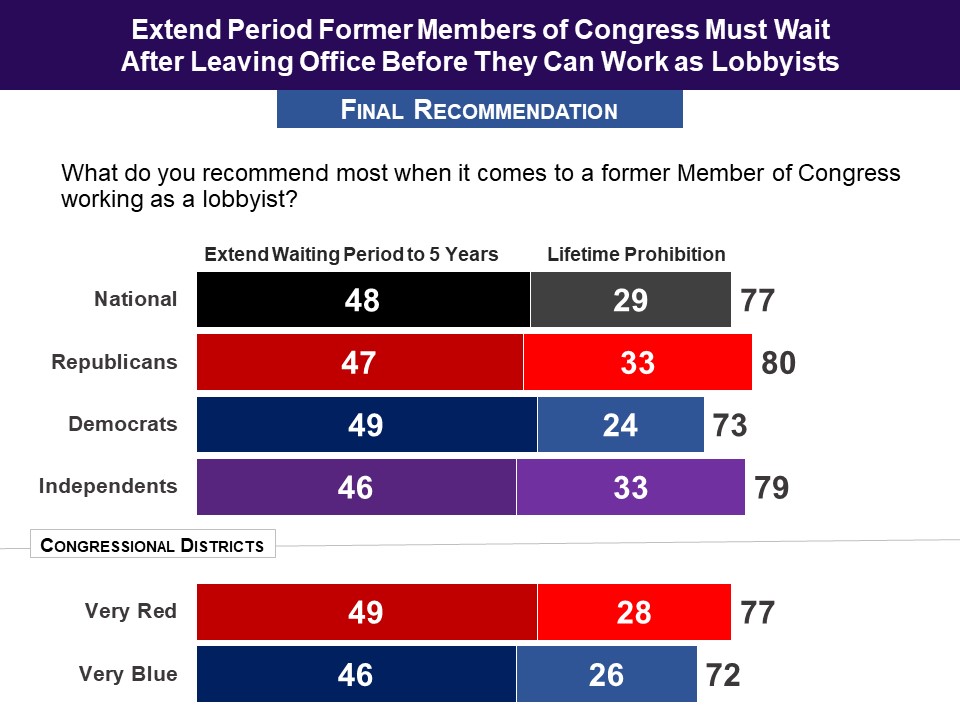
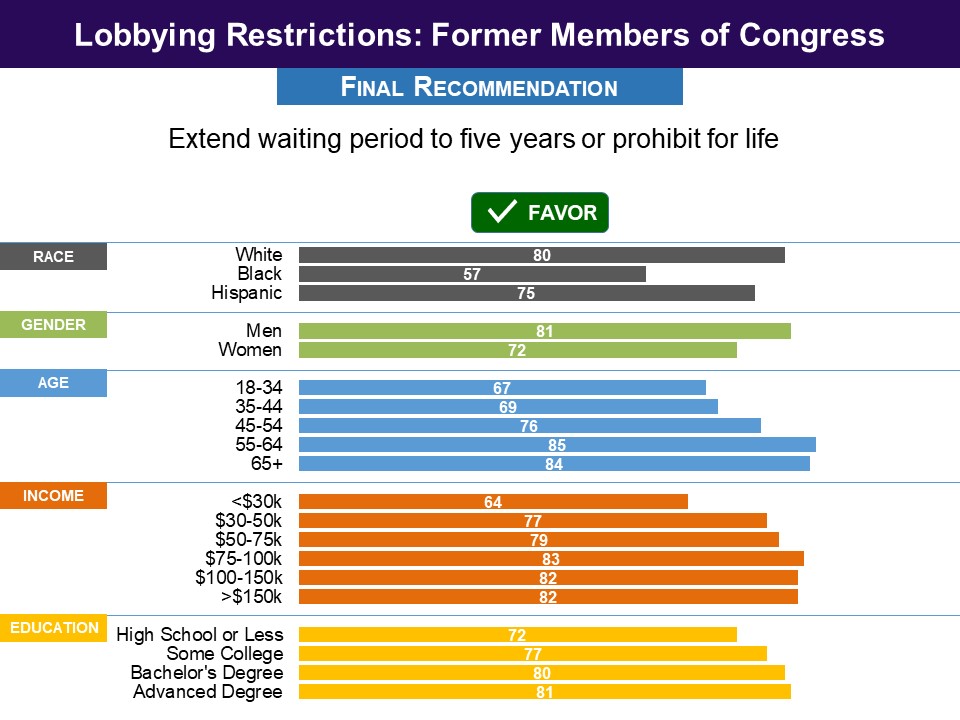 Response Without Undergoing Policymaking Simulation
Response Without Undergoing Policymaking Simulation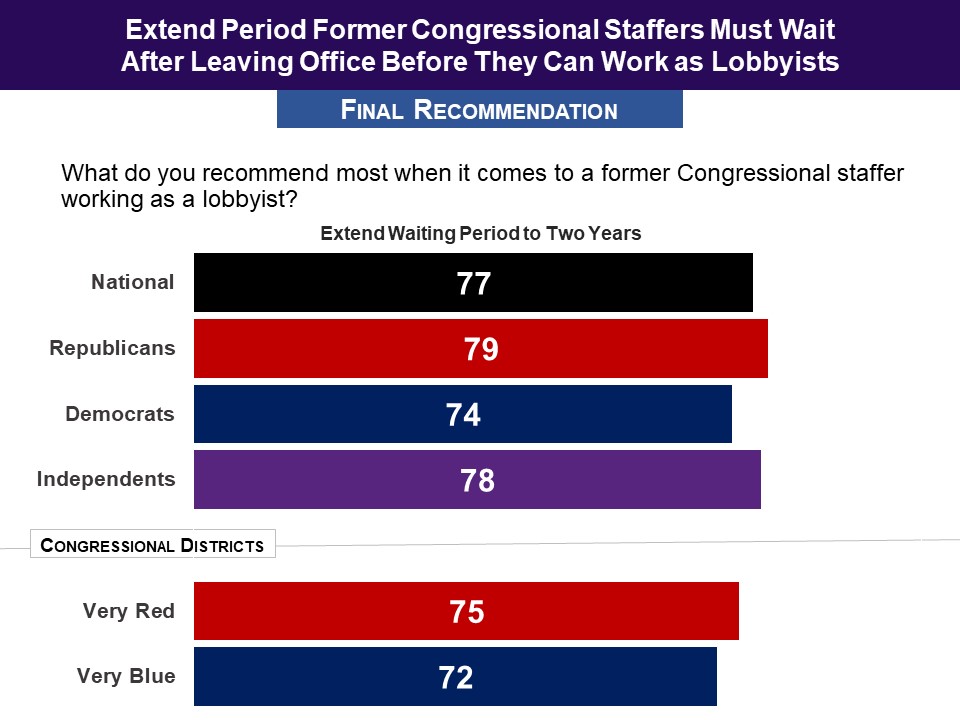
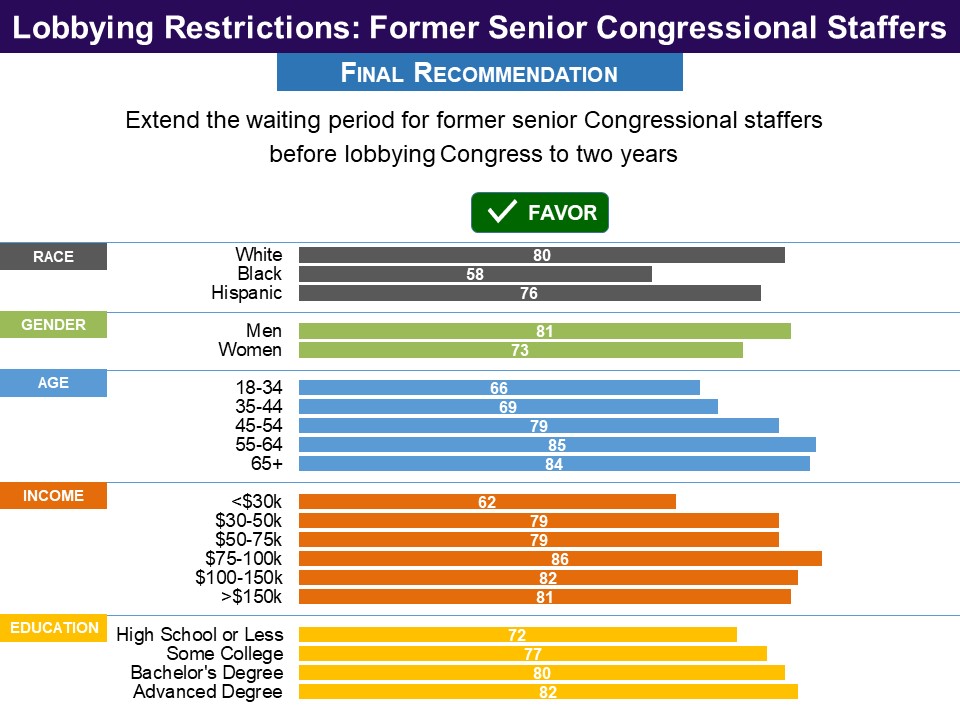
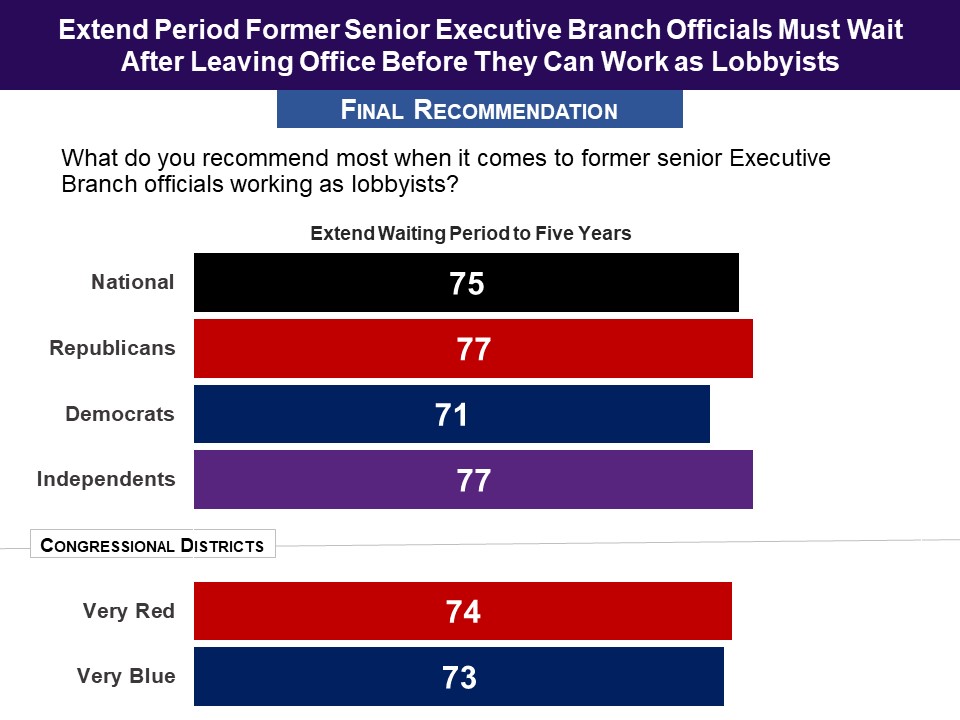
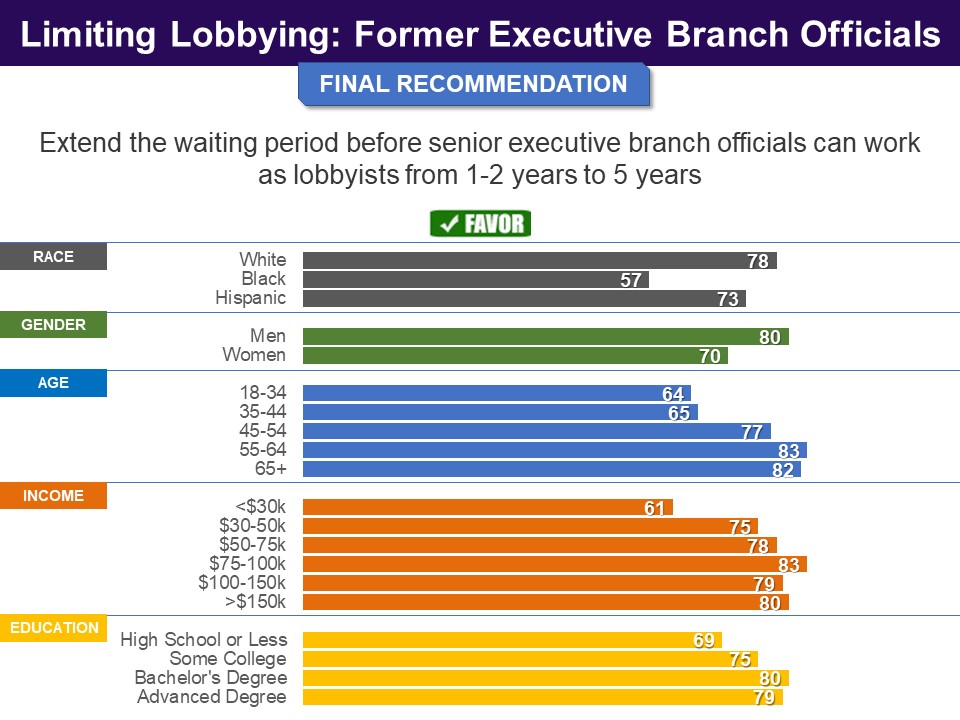

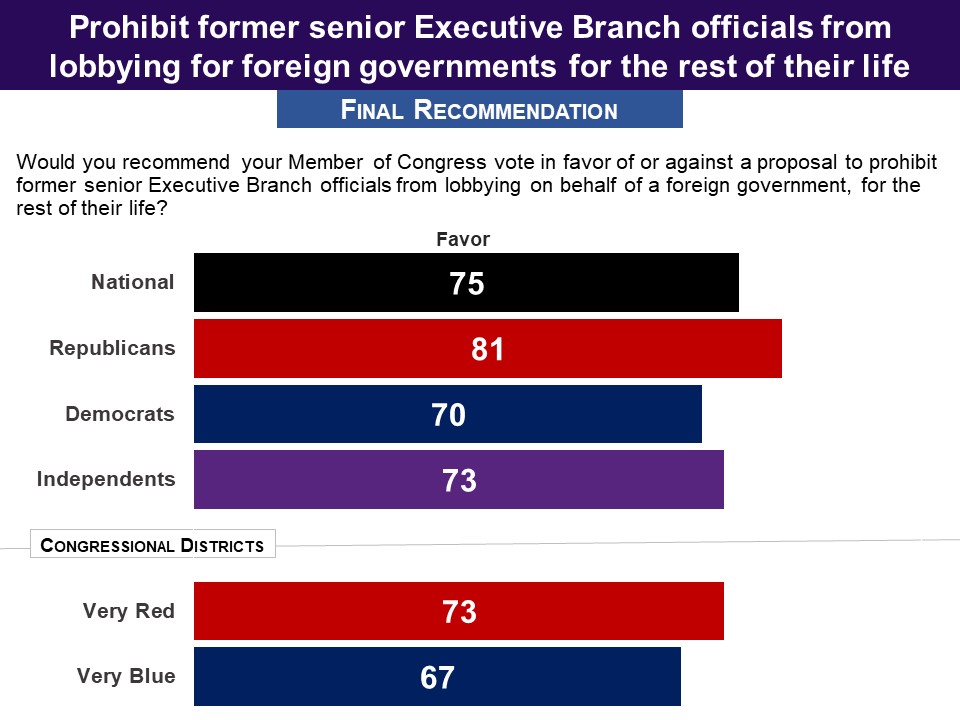
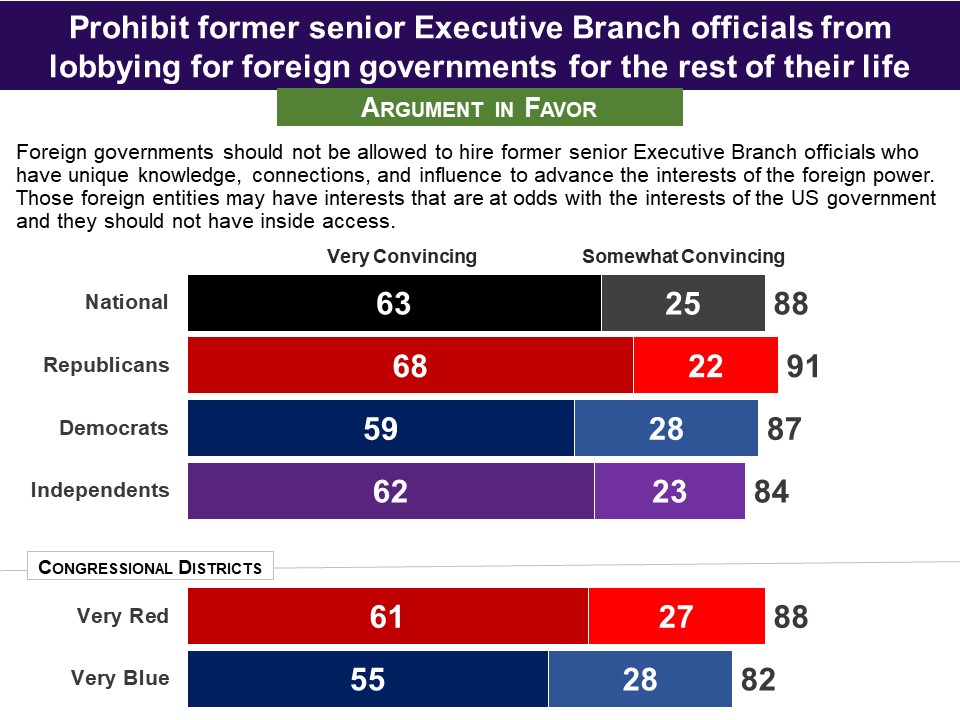
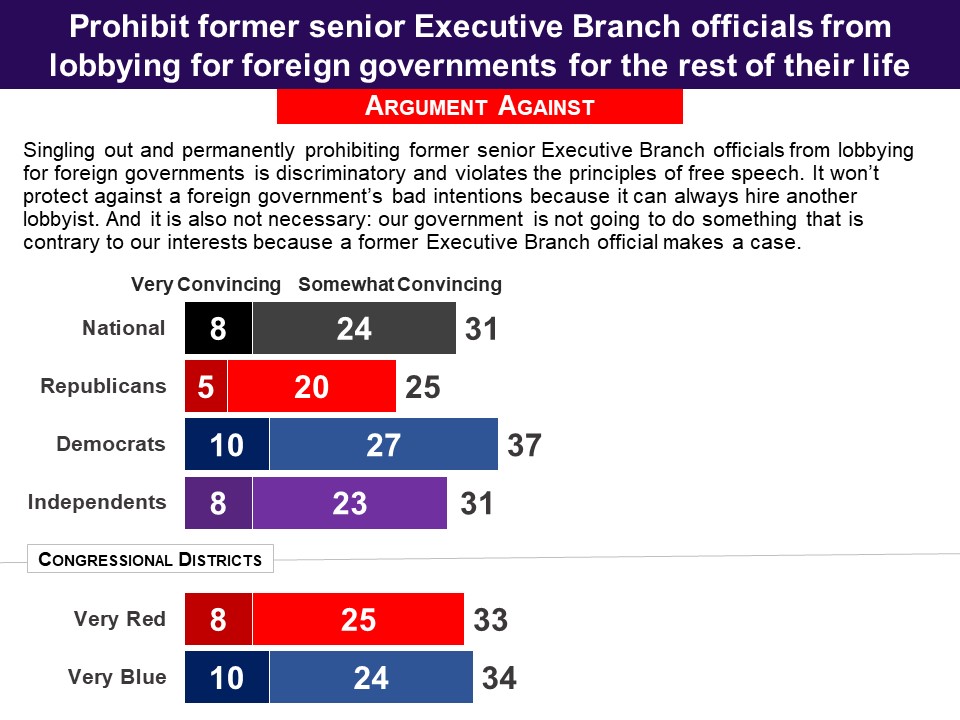
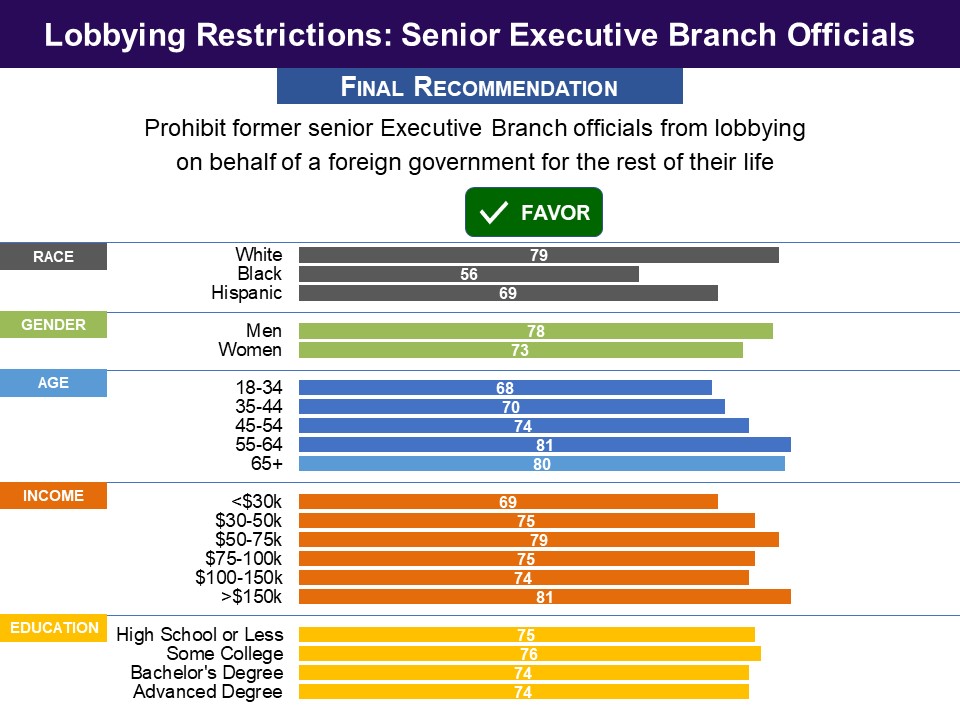
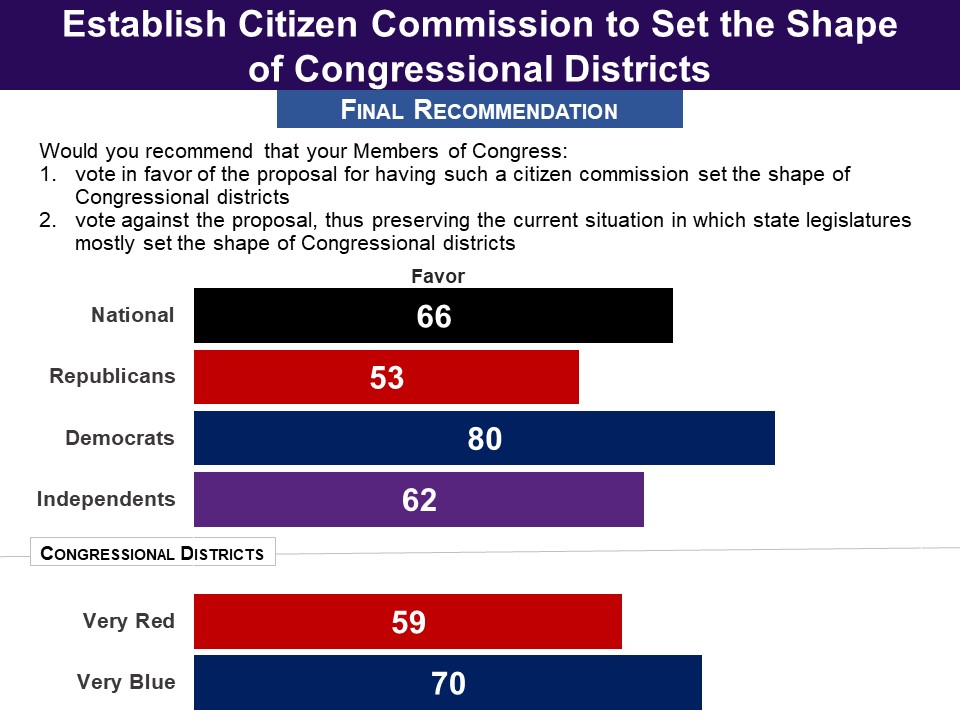
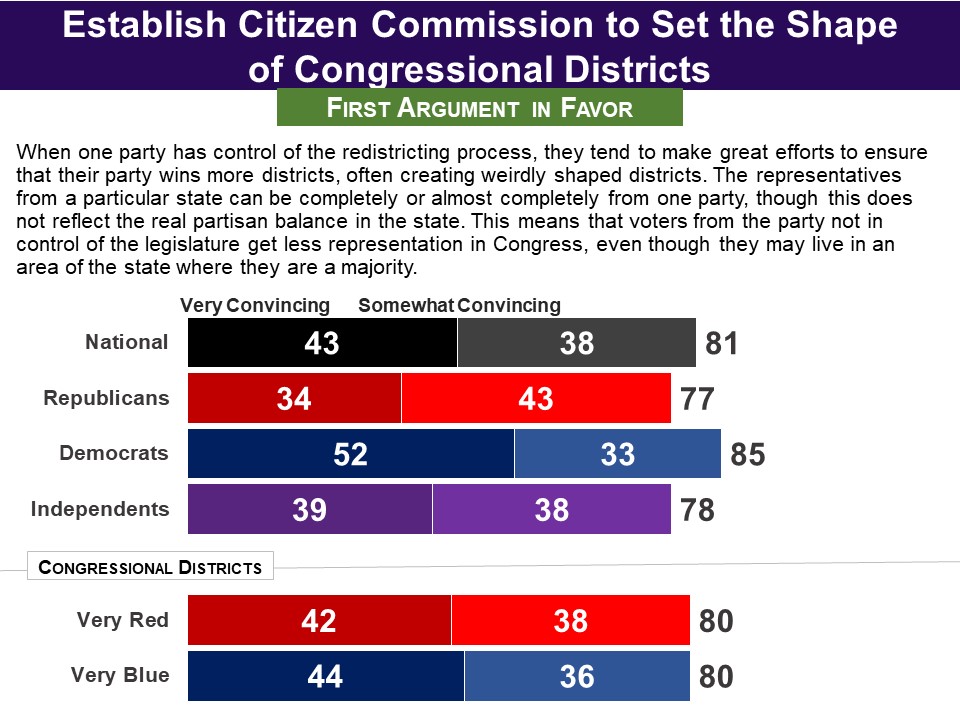
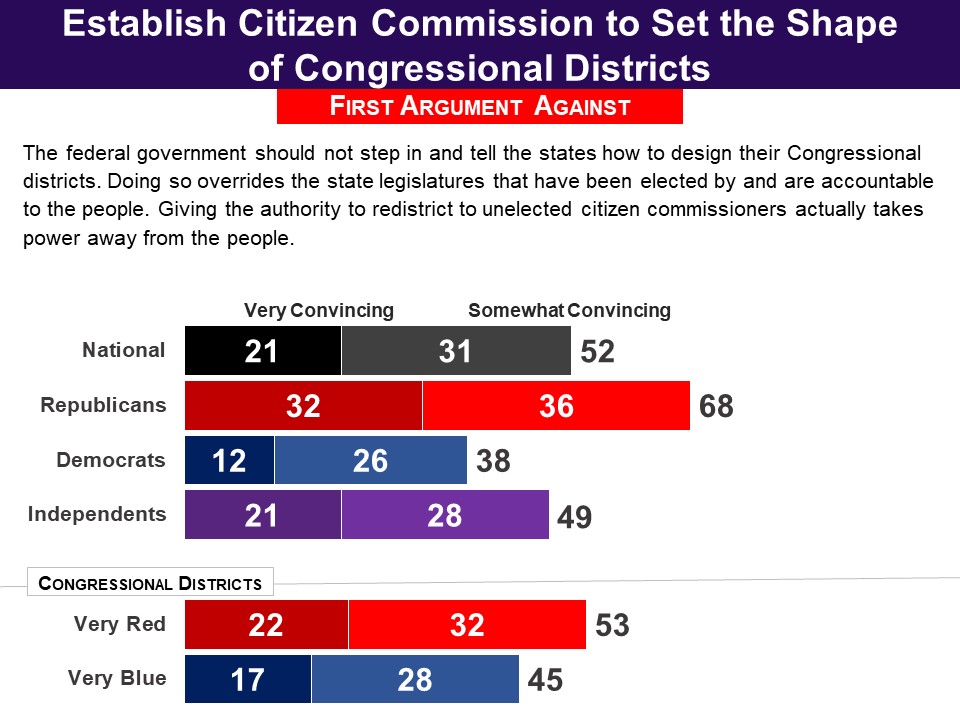
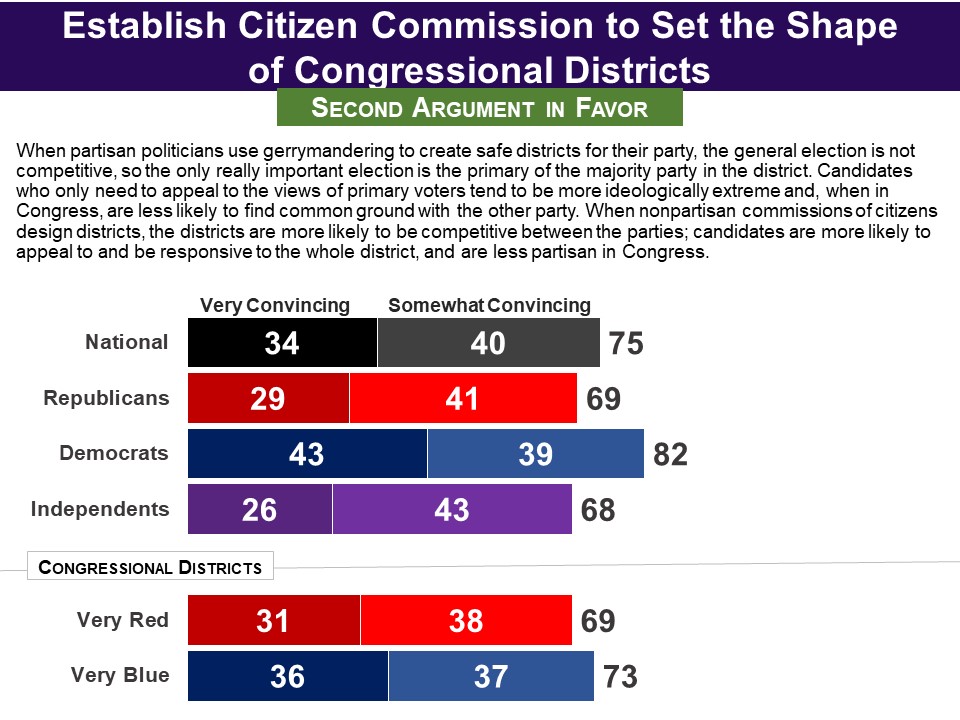
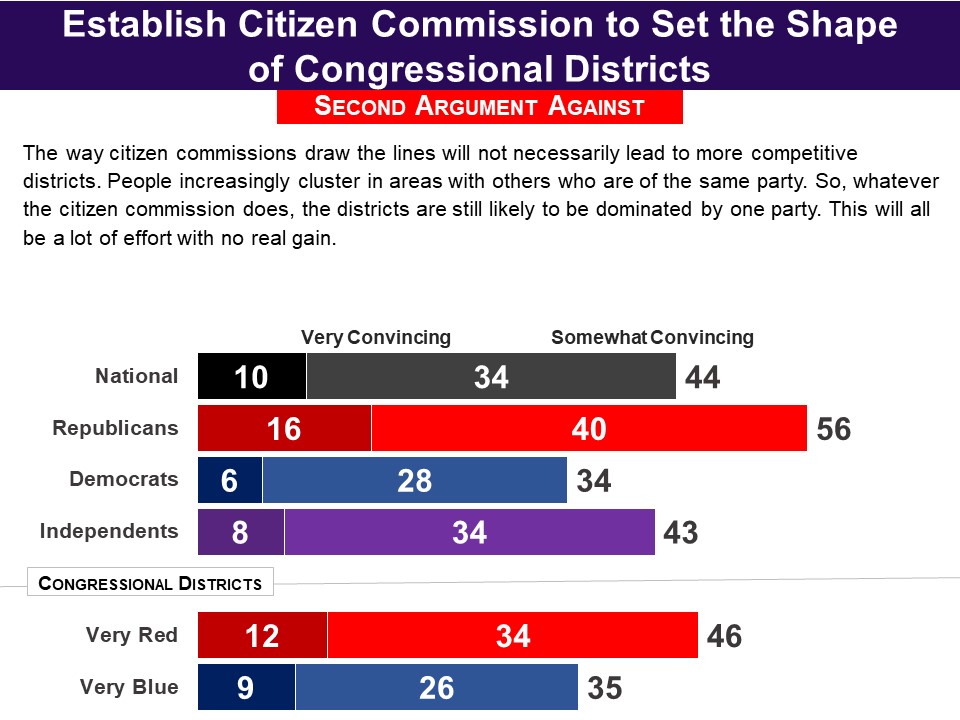
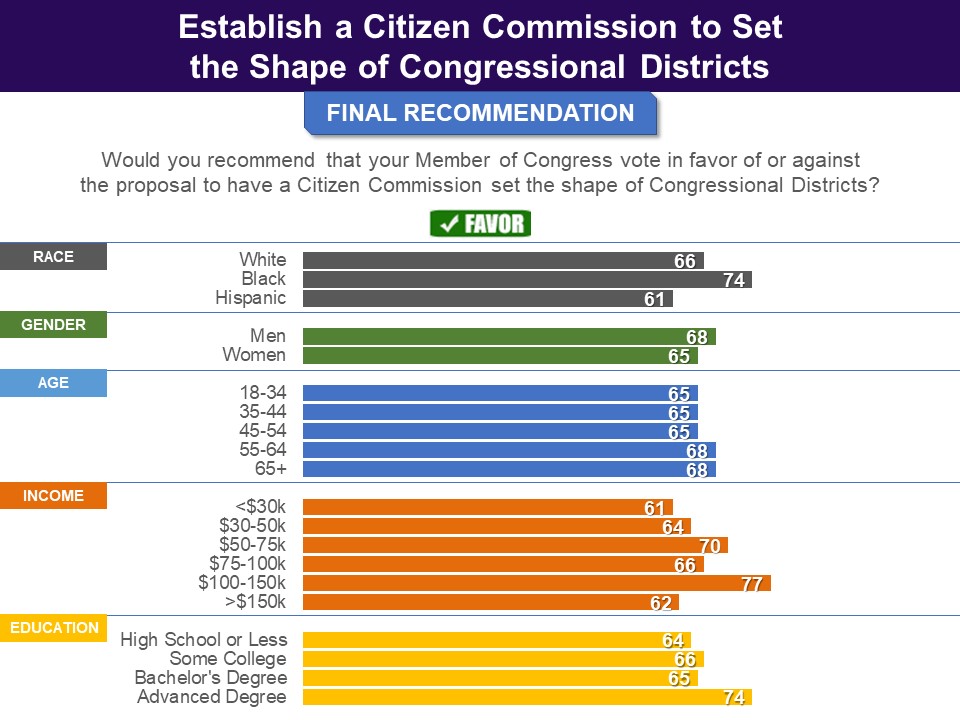 Response Without Undergoing Policymaking Simulation
Response Without Undergoing Policymaking Simulation
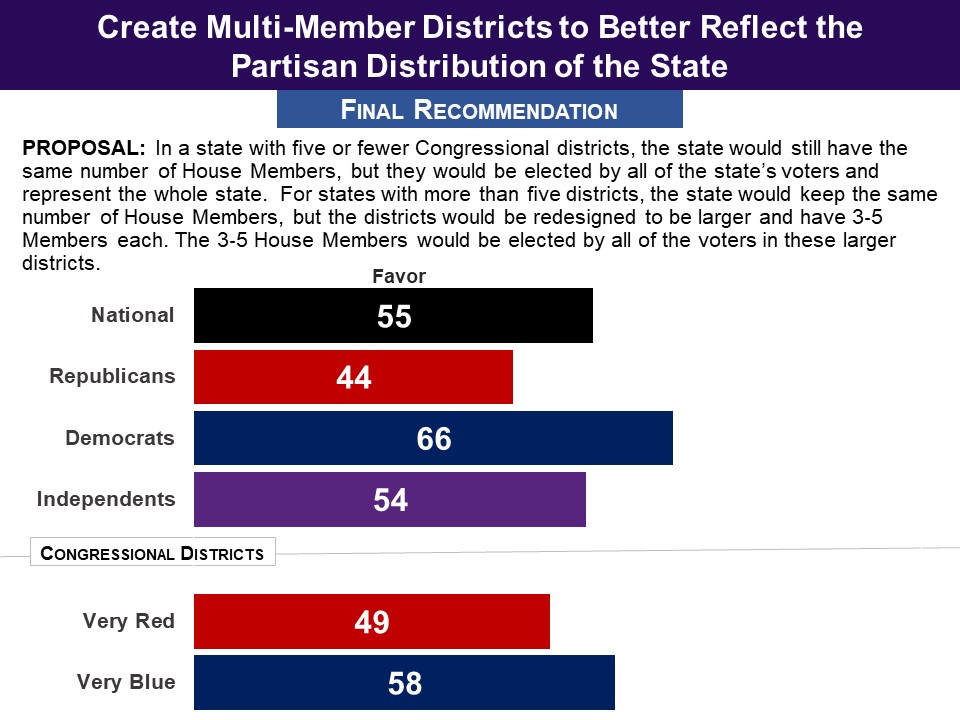
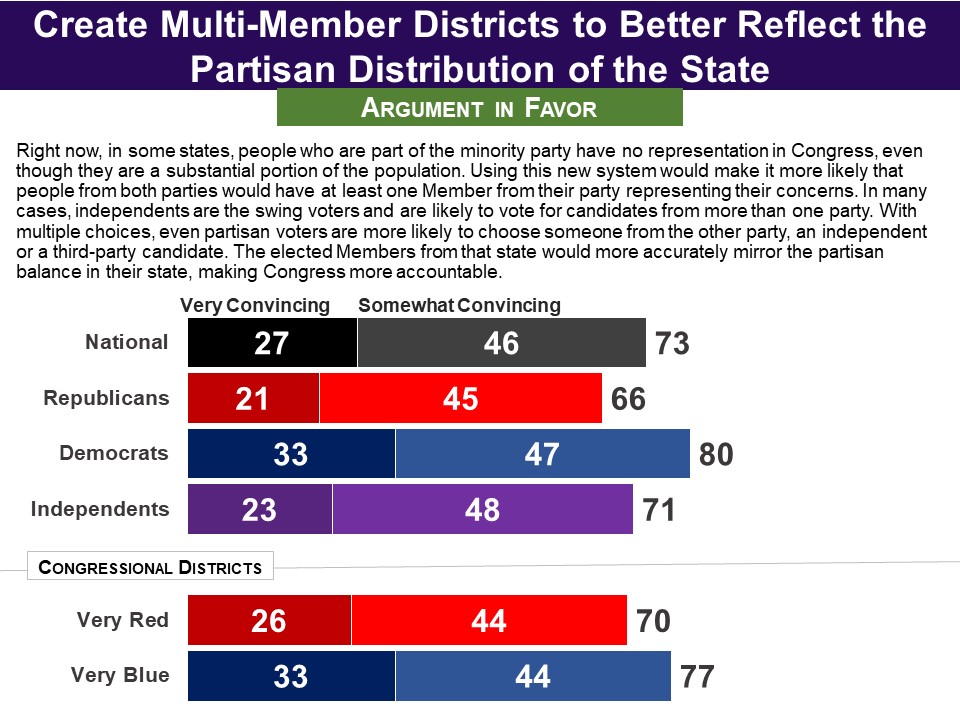
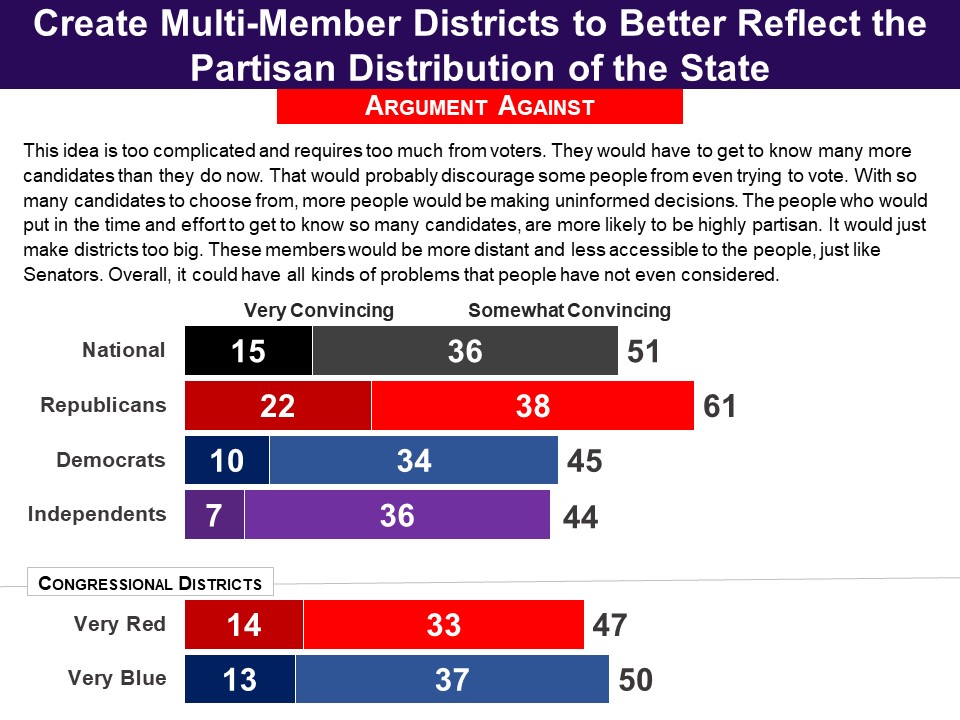
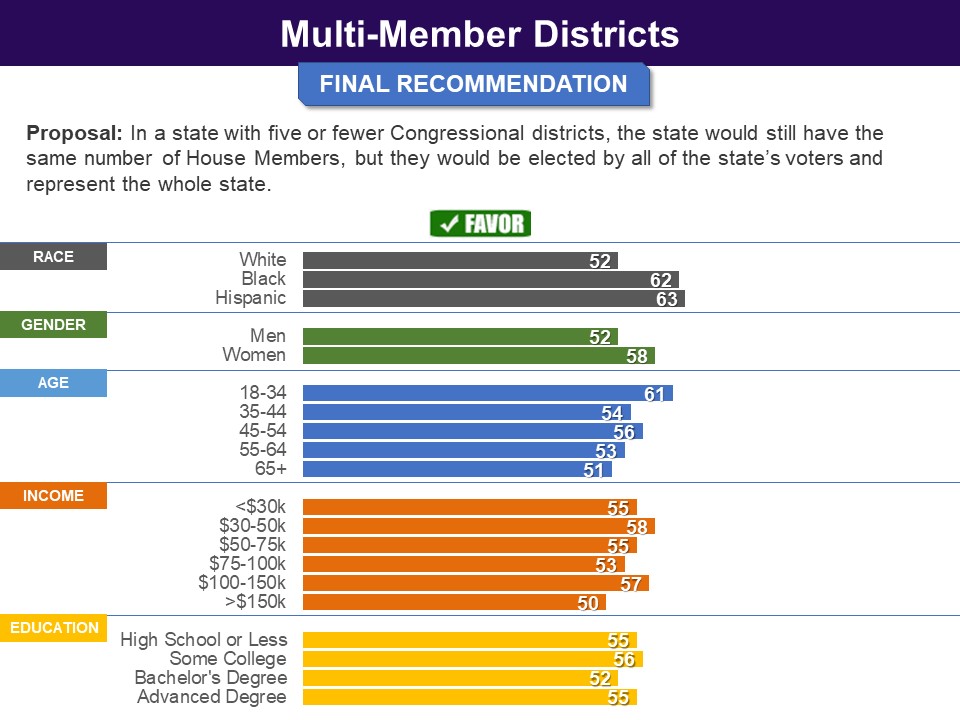


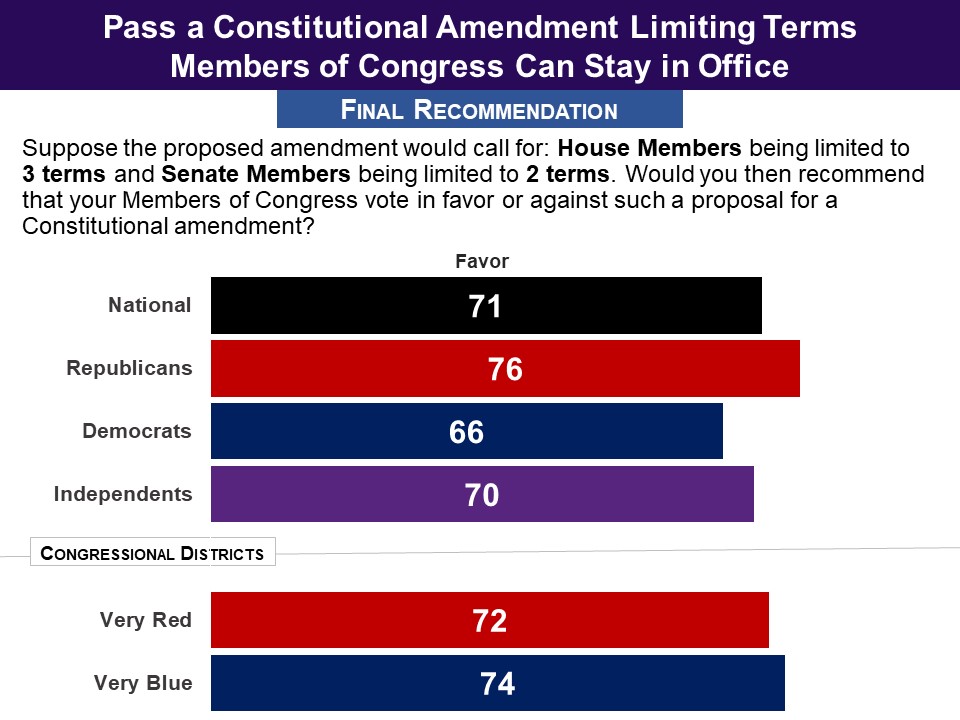
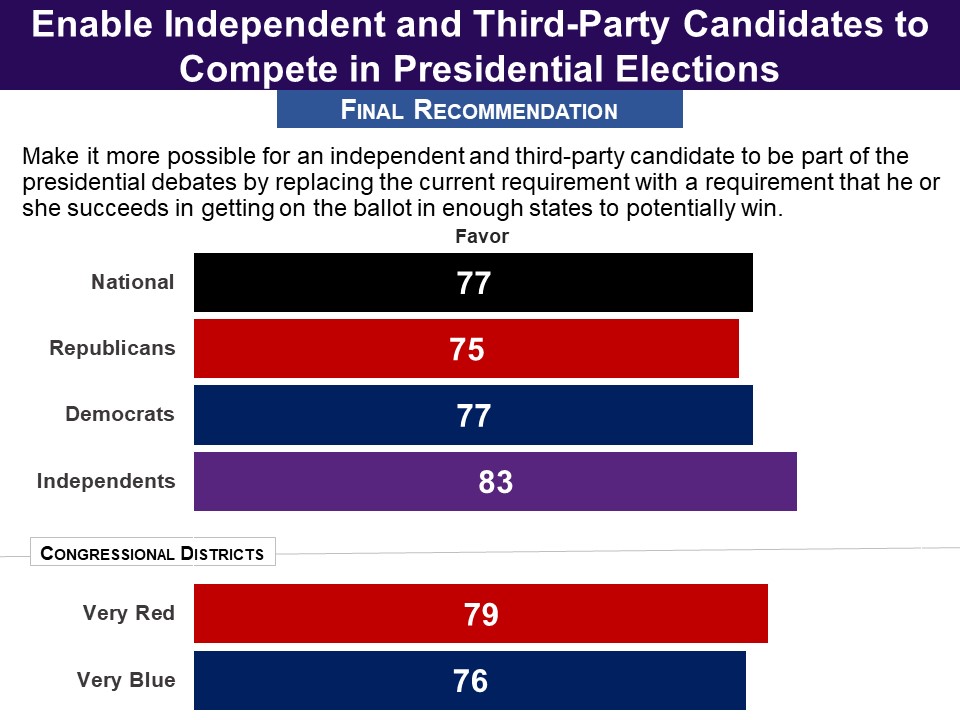
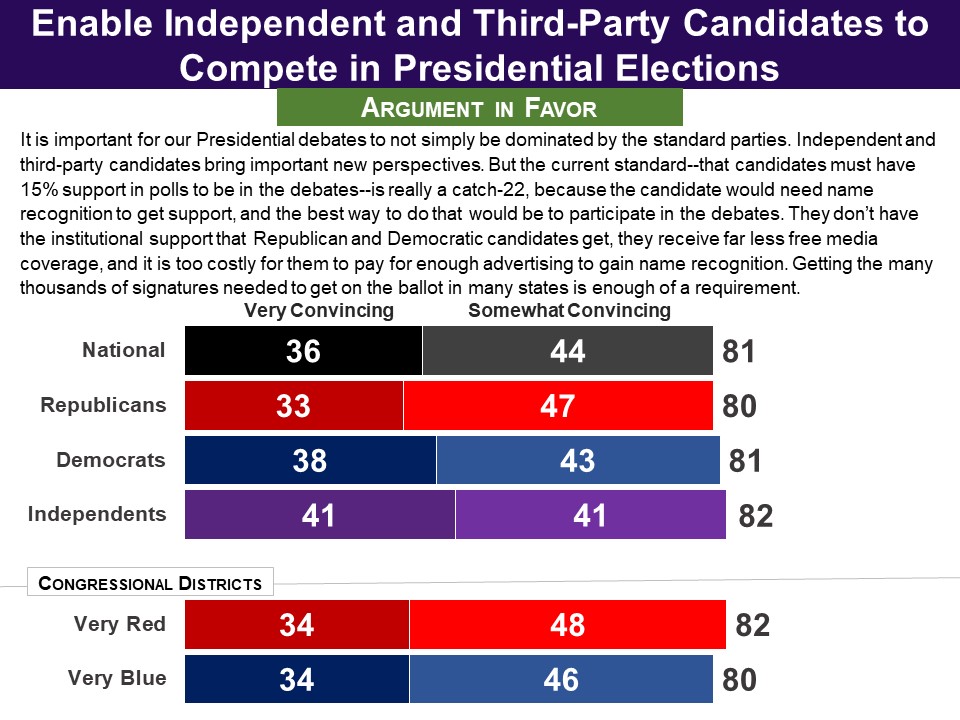
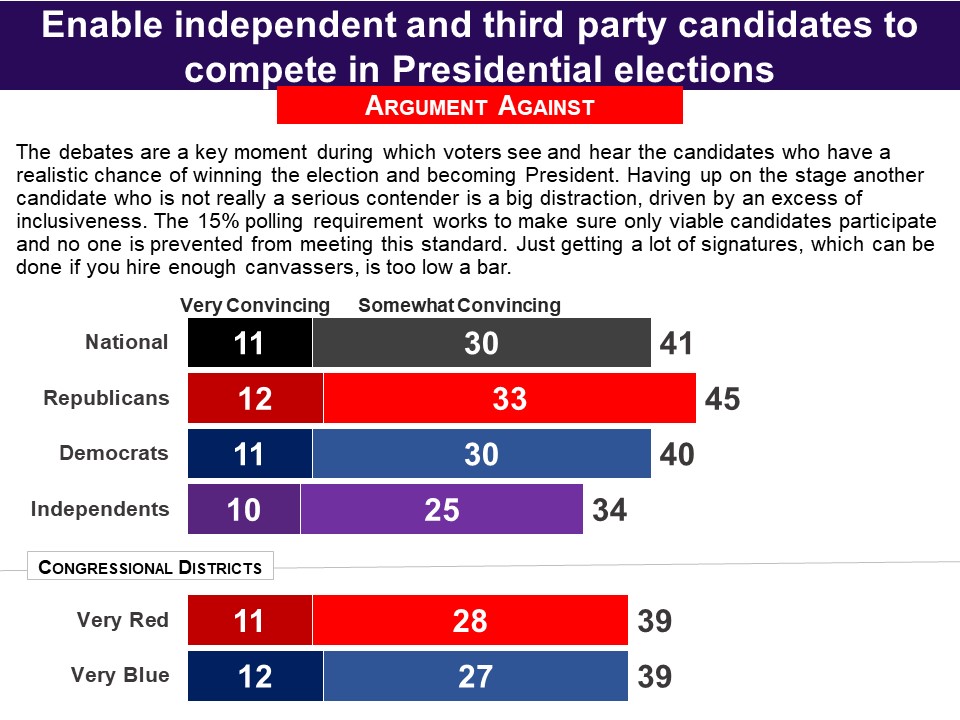
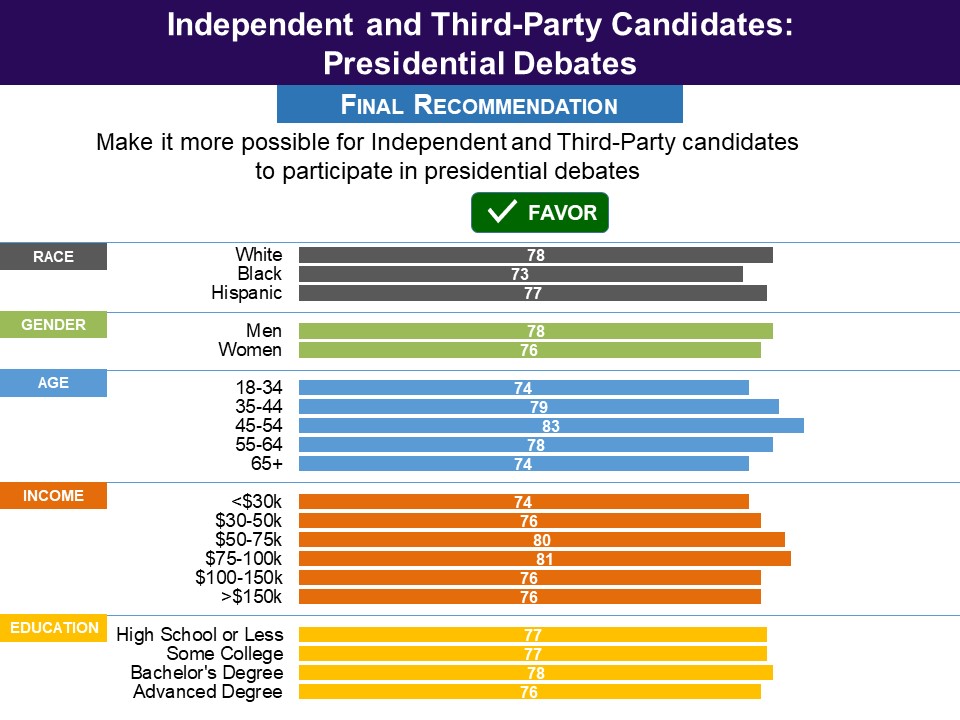 Response Without Undergoing Policymaking Simulation
Response Without Undergoing Policymaking Simulation